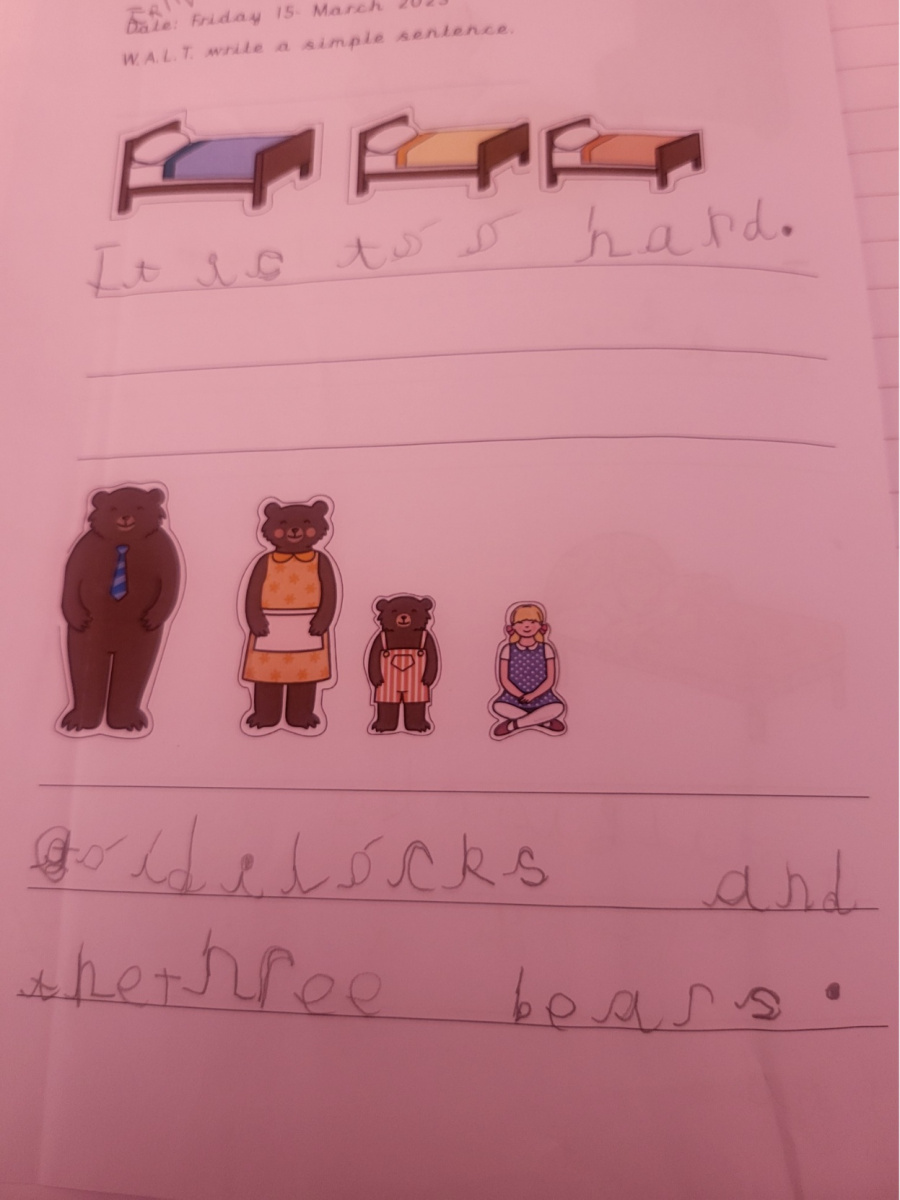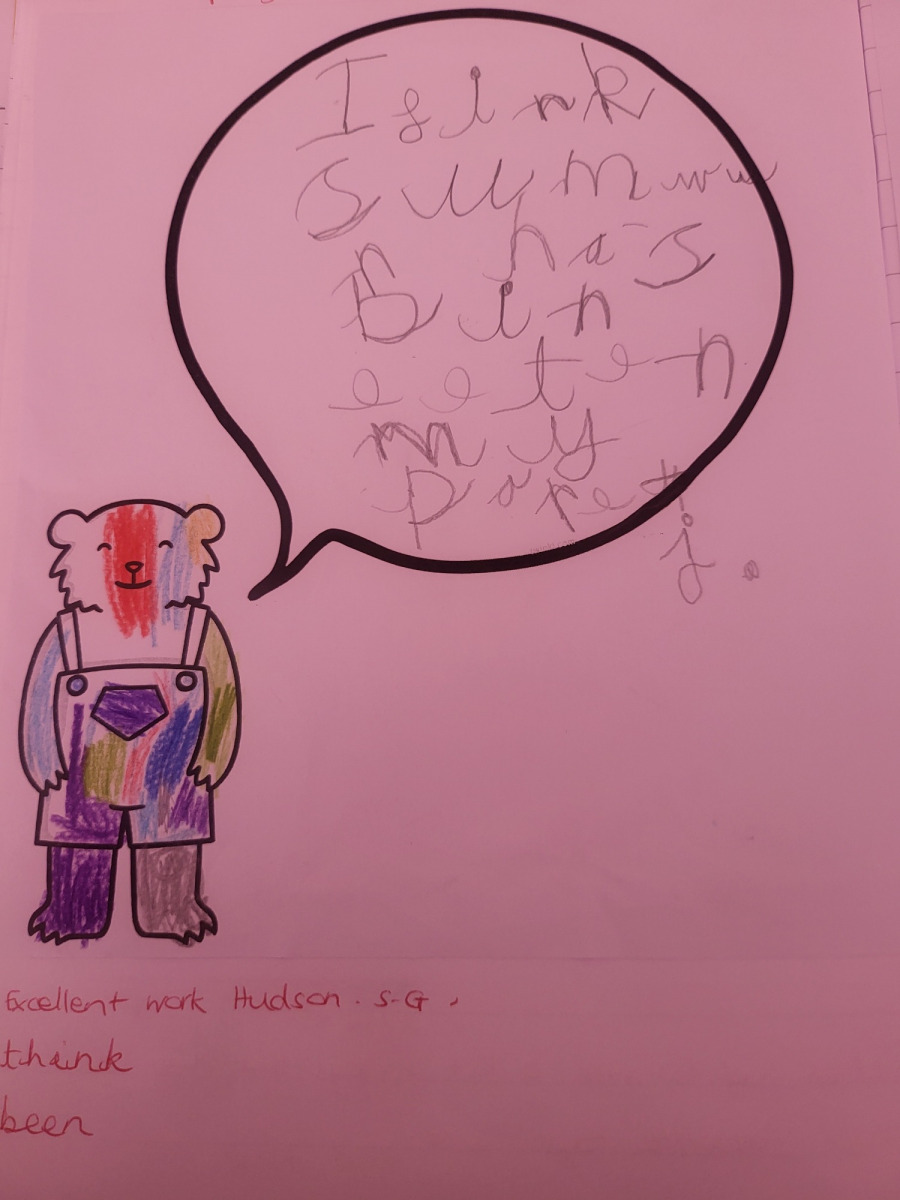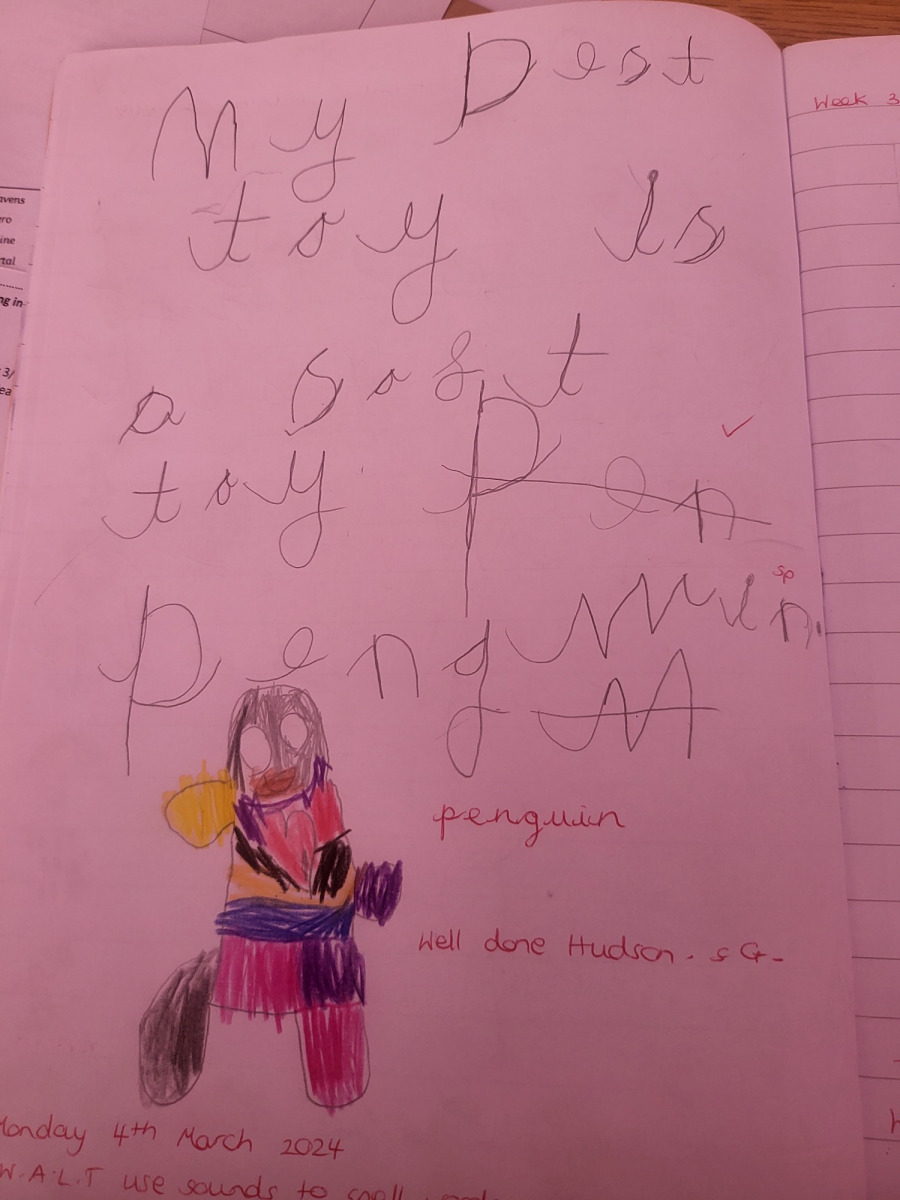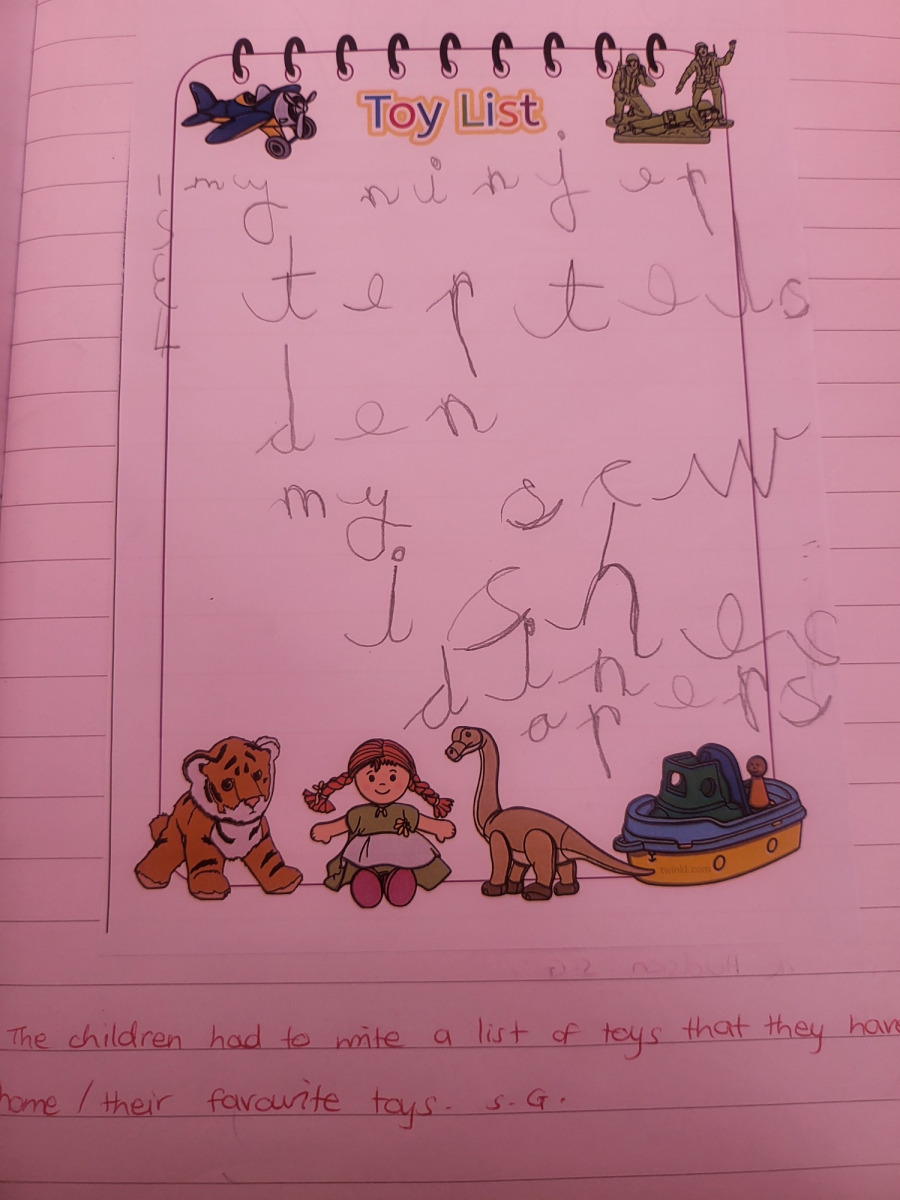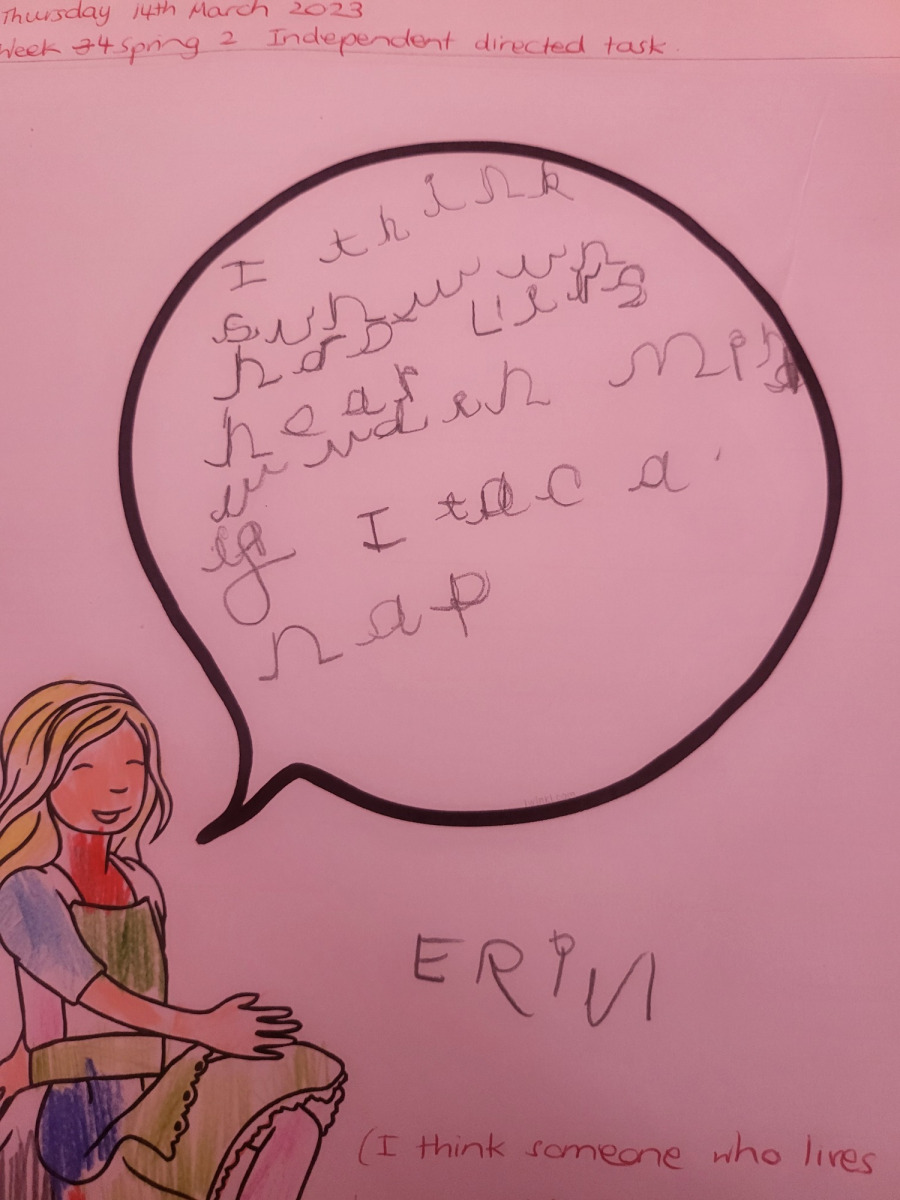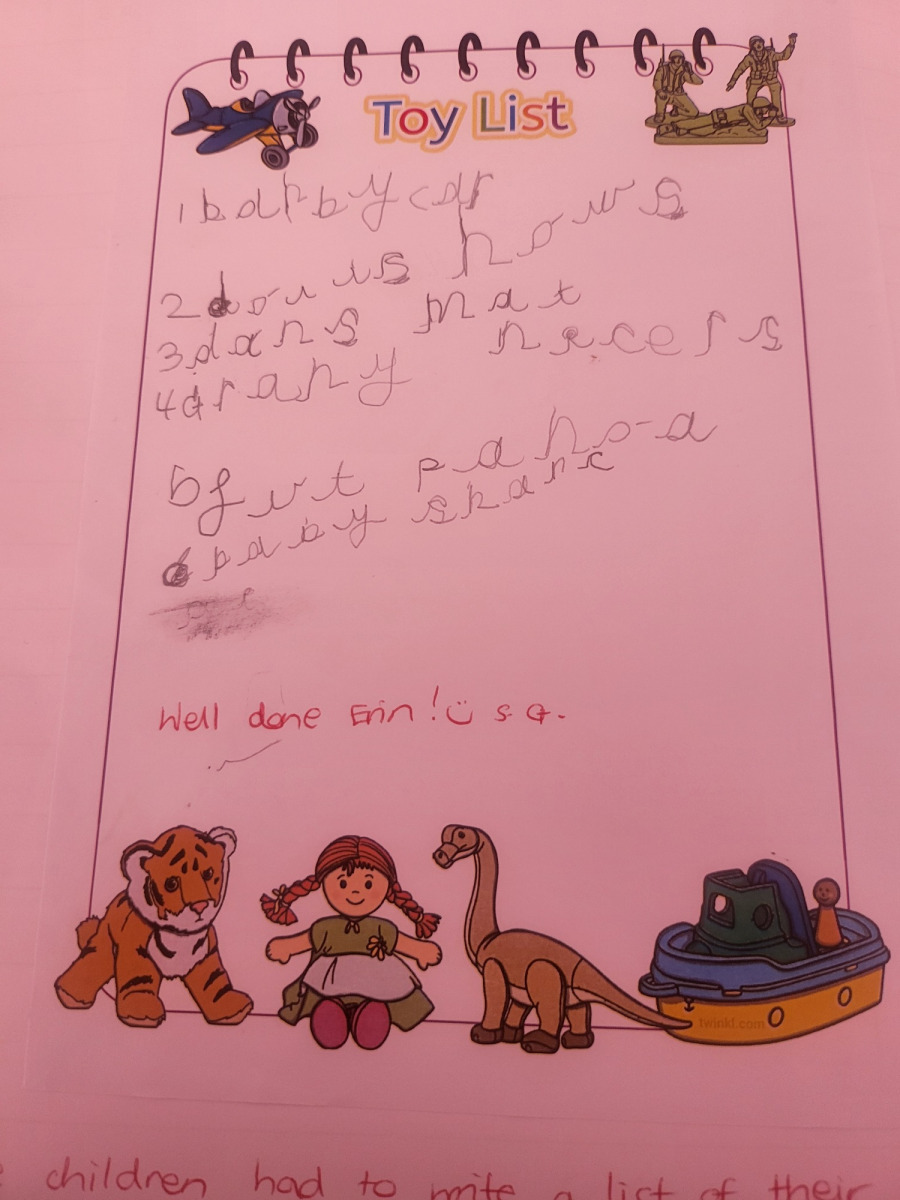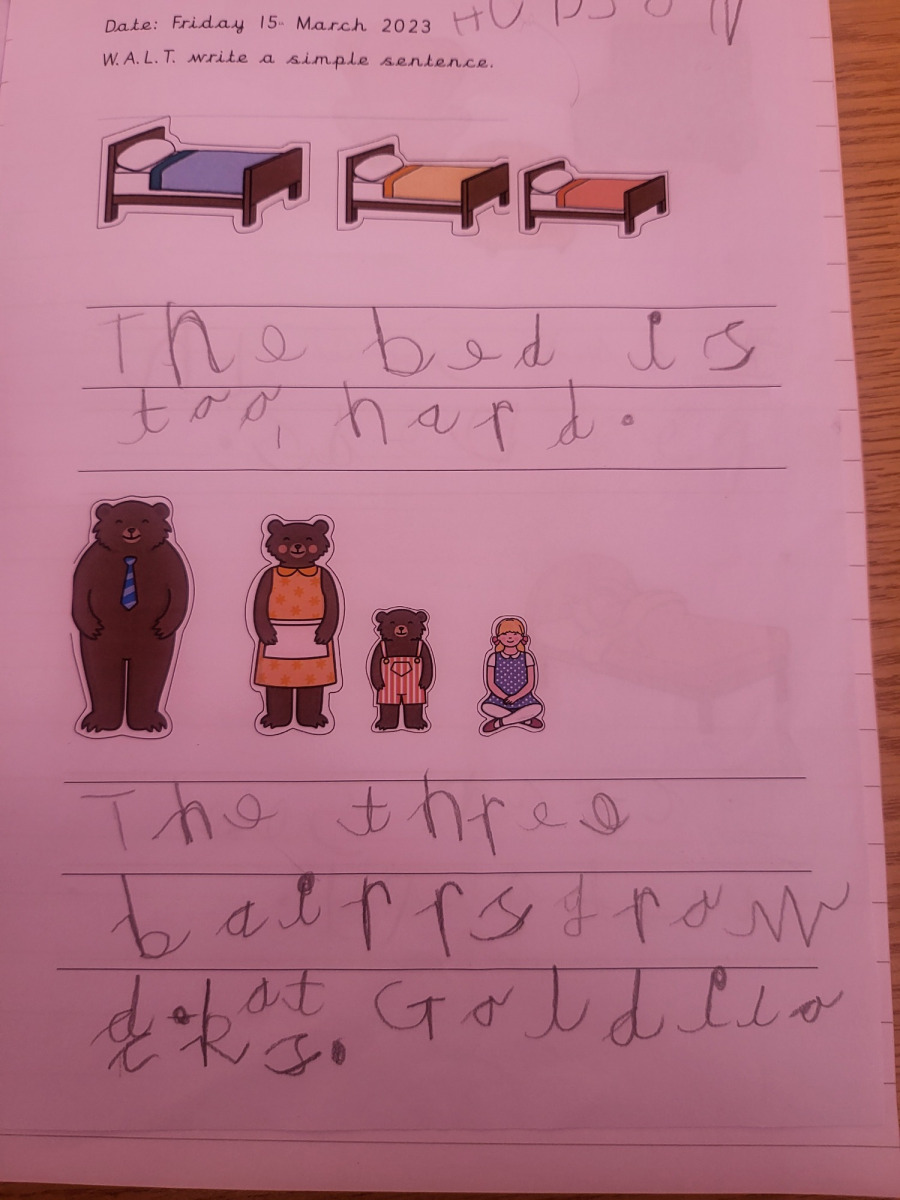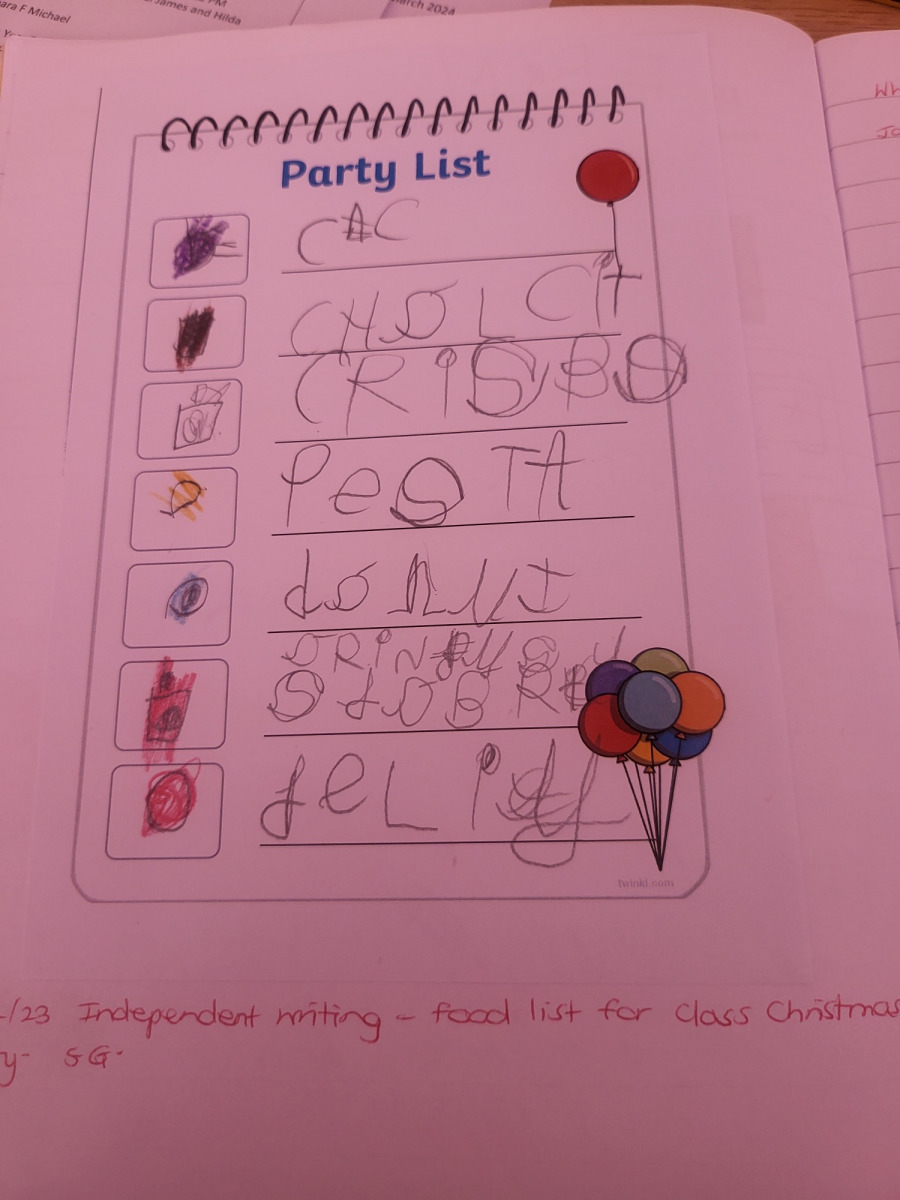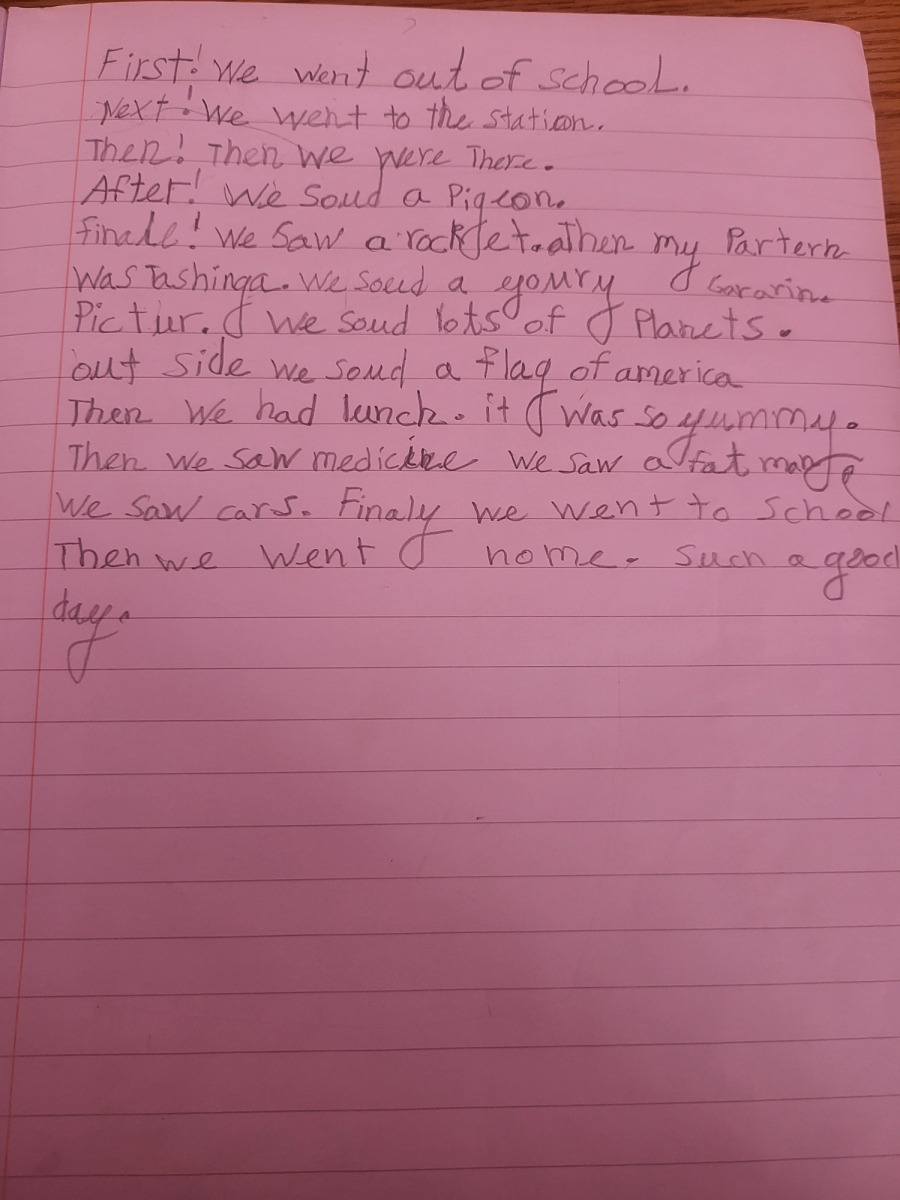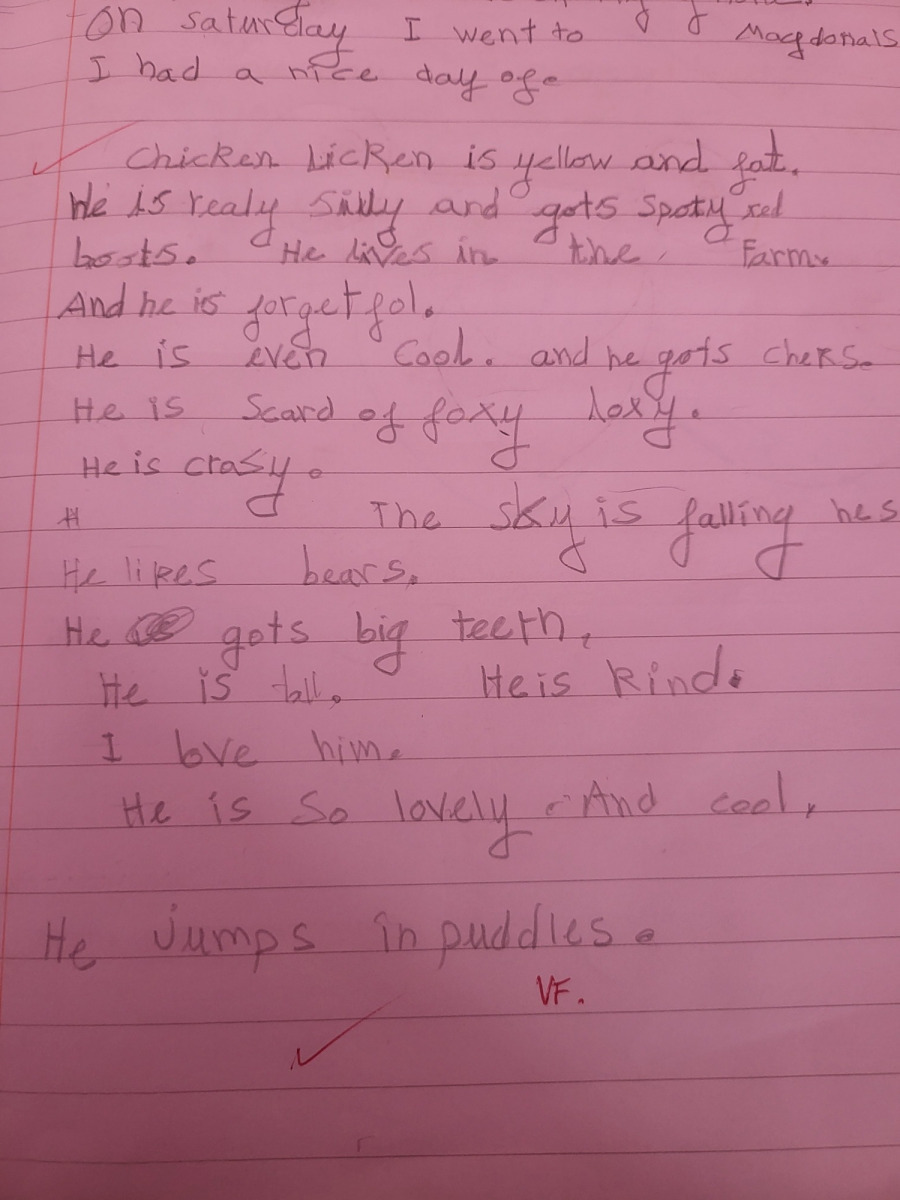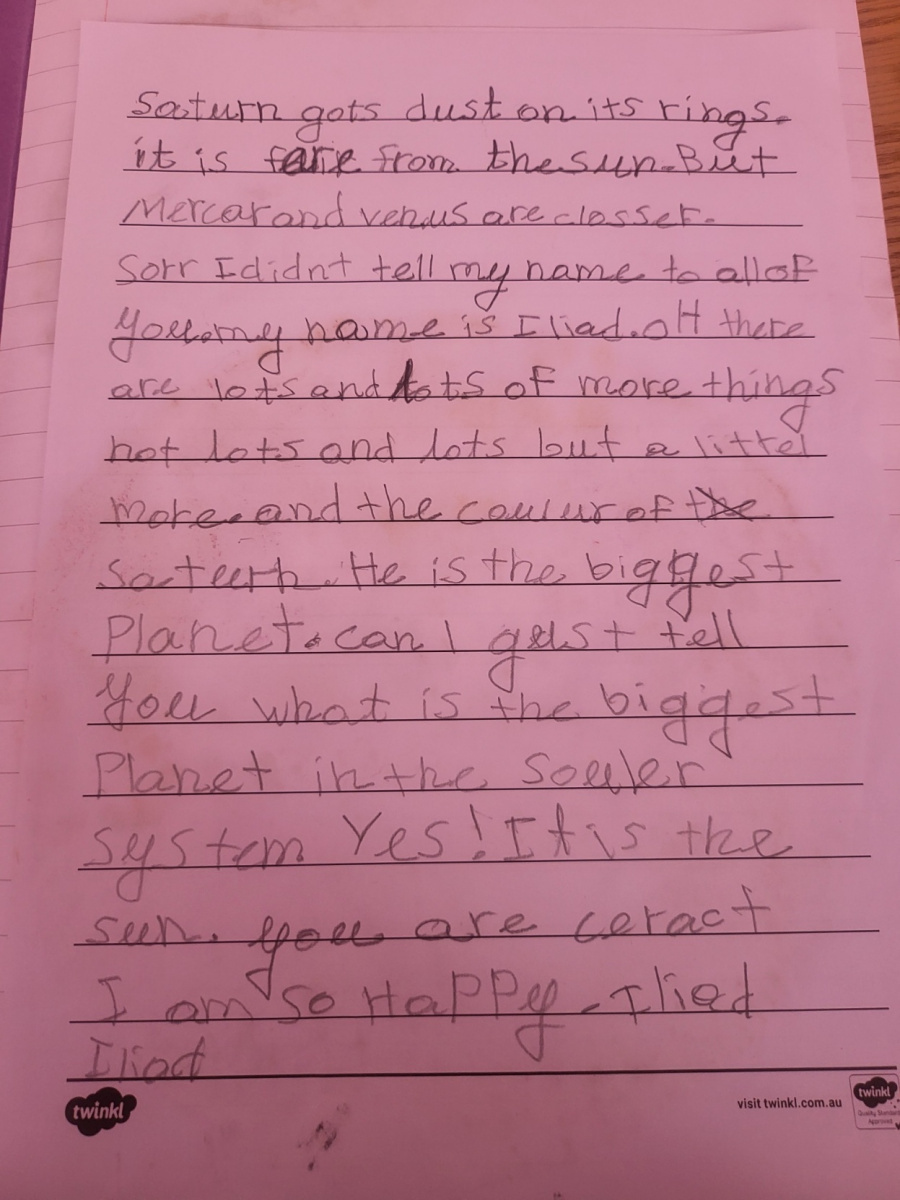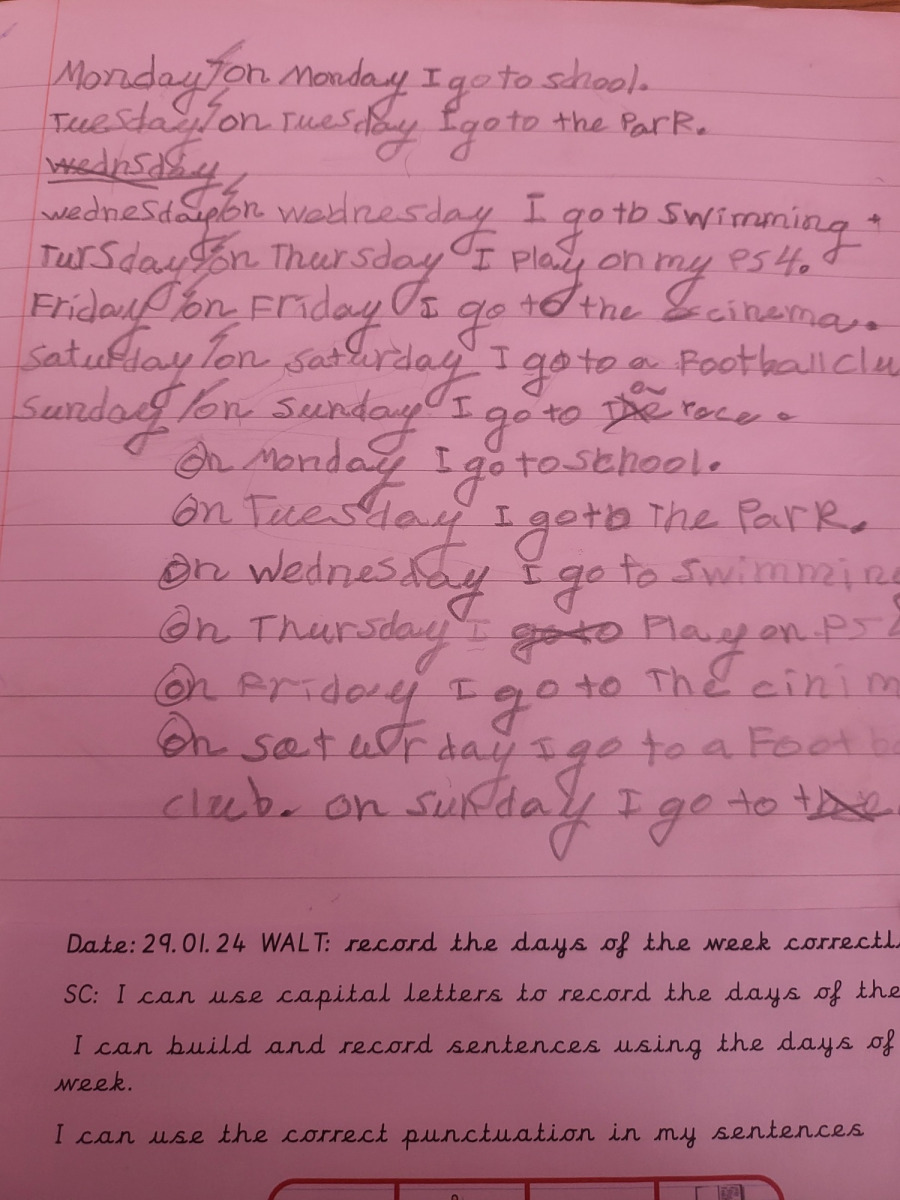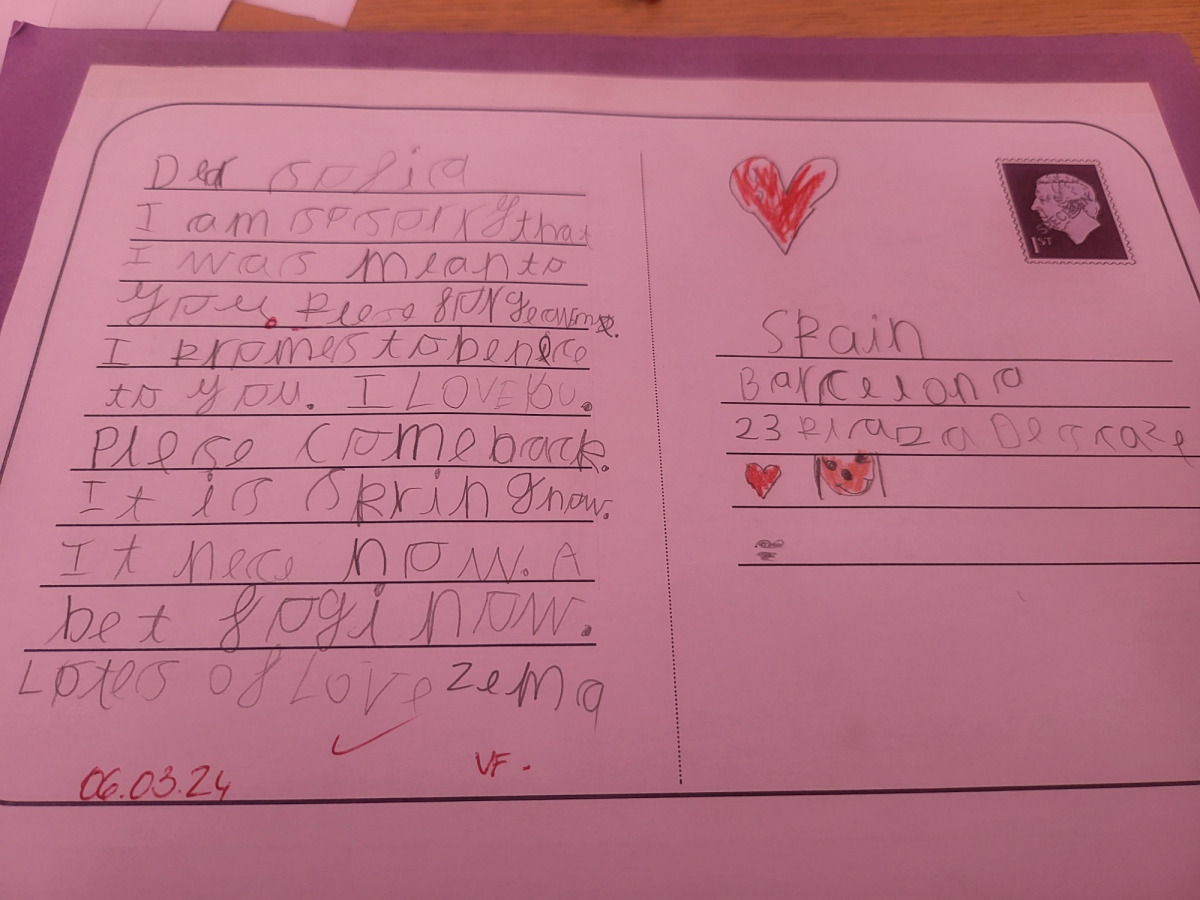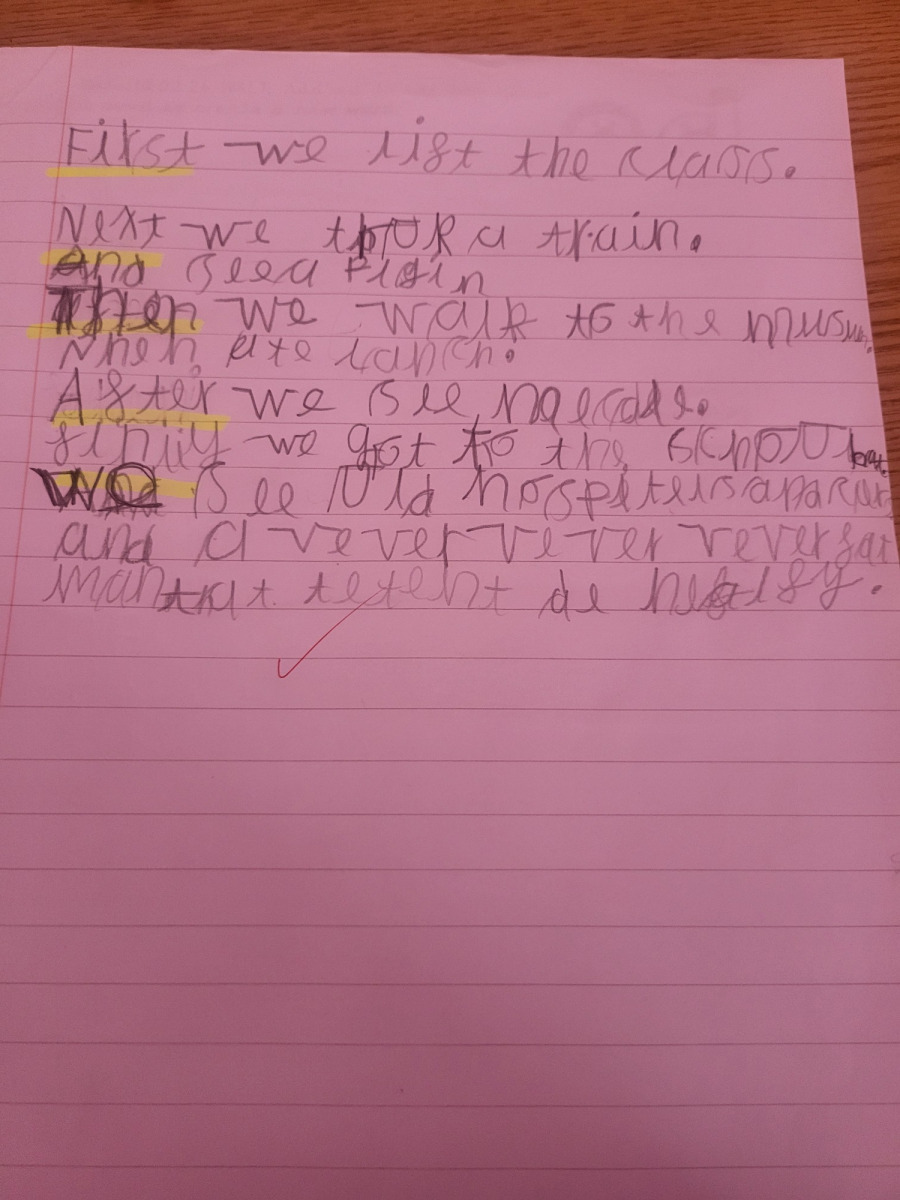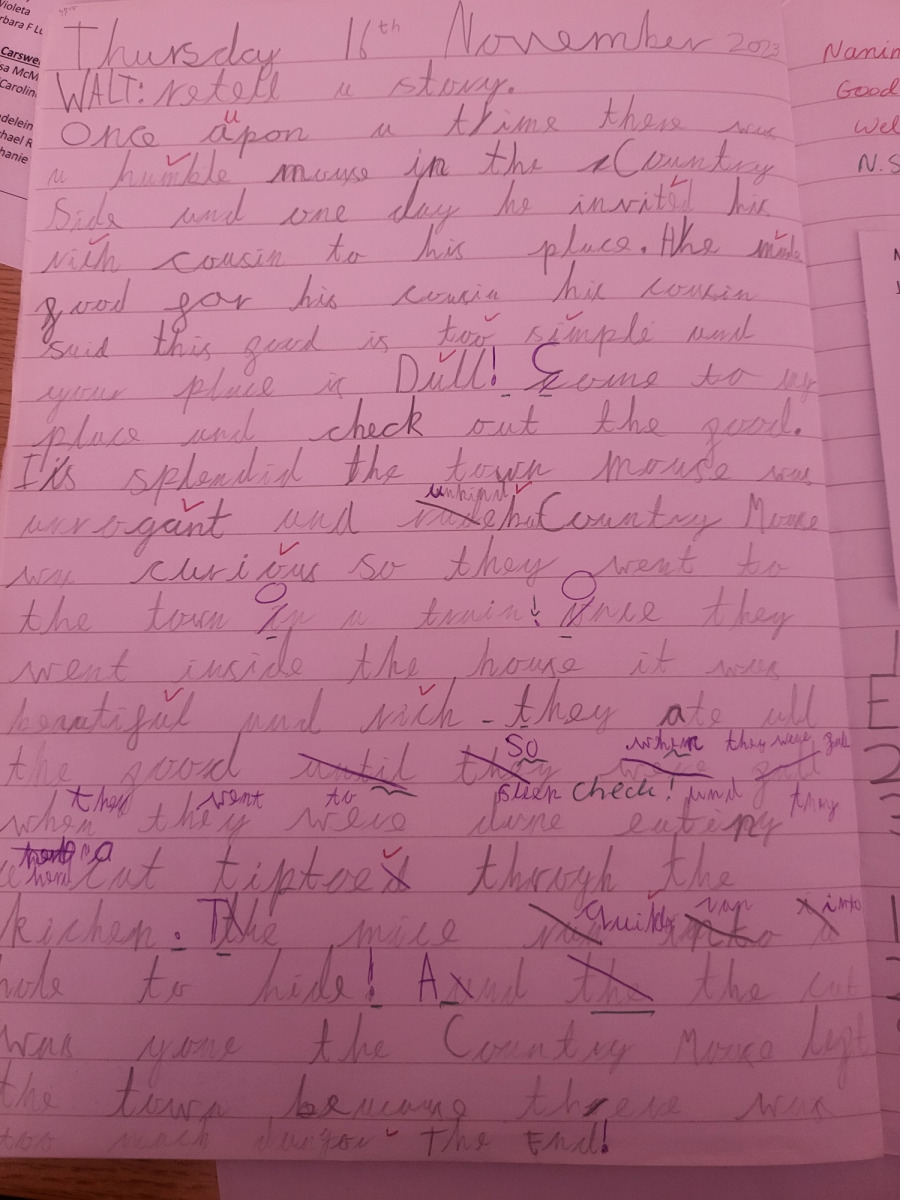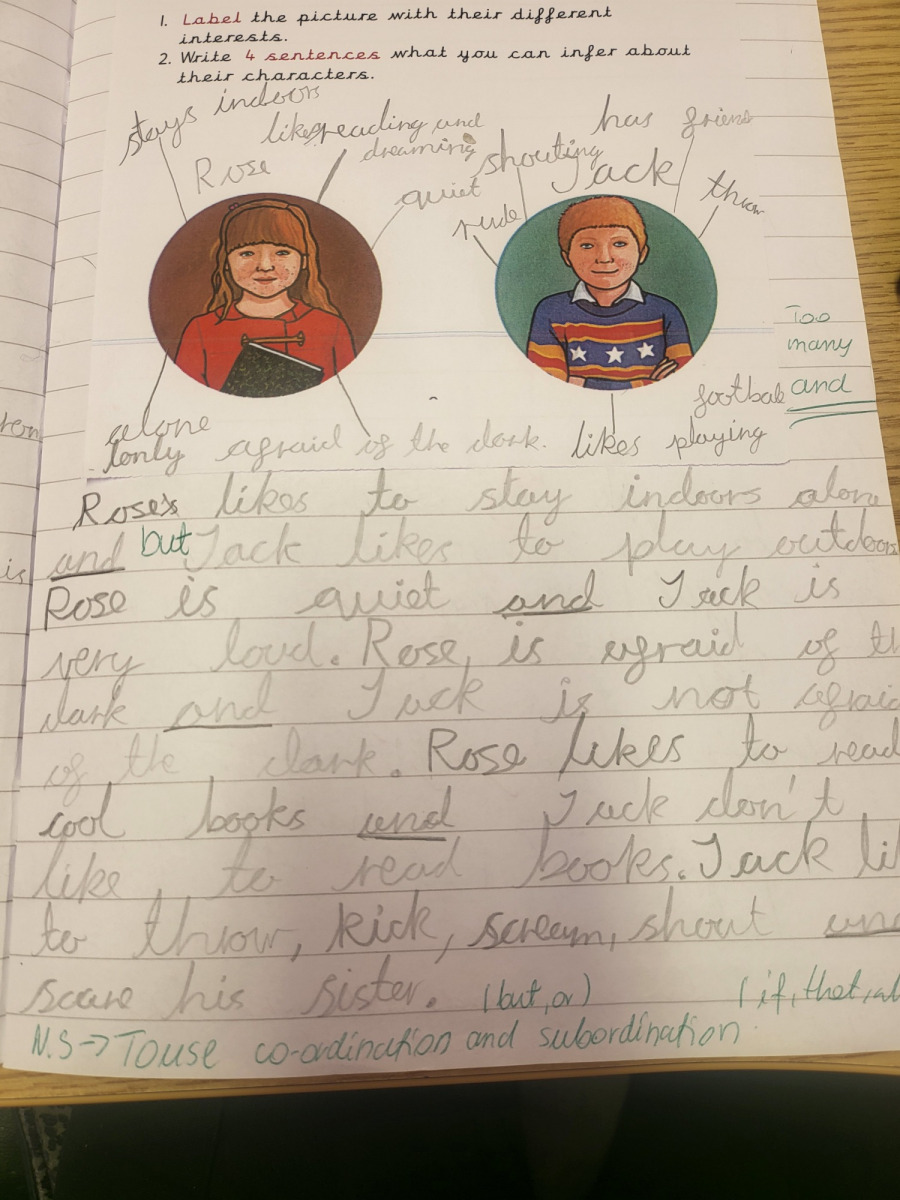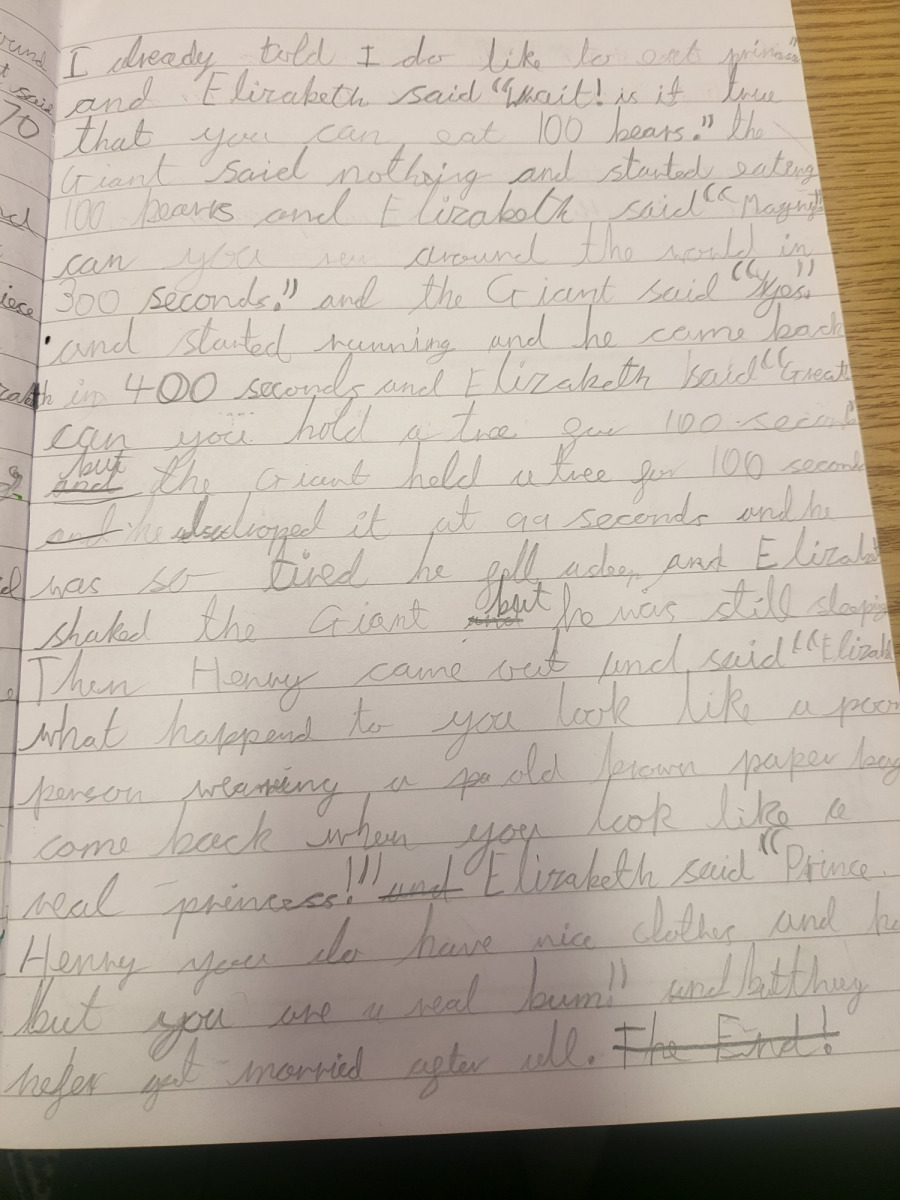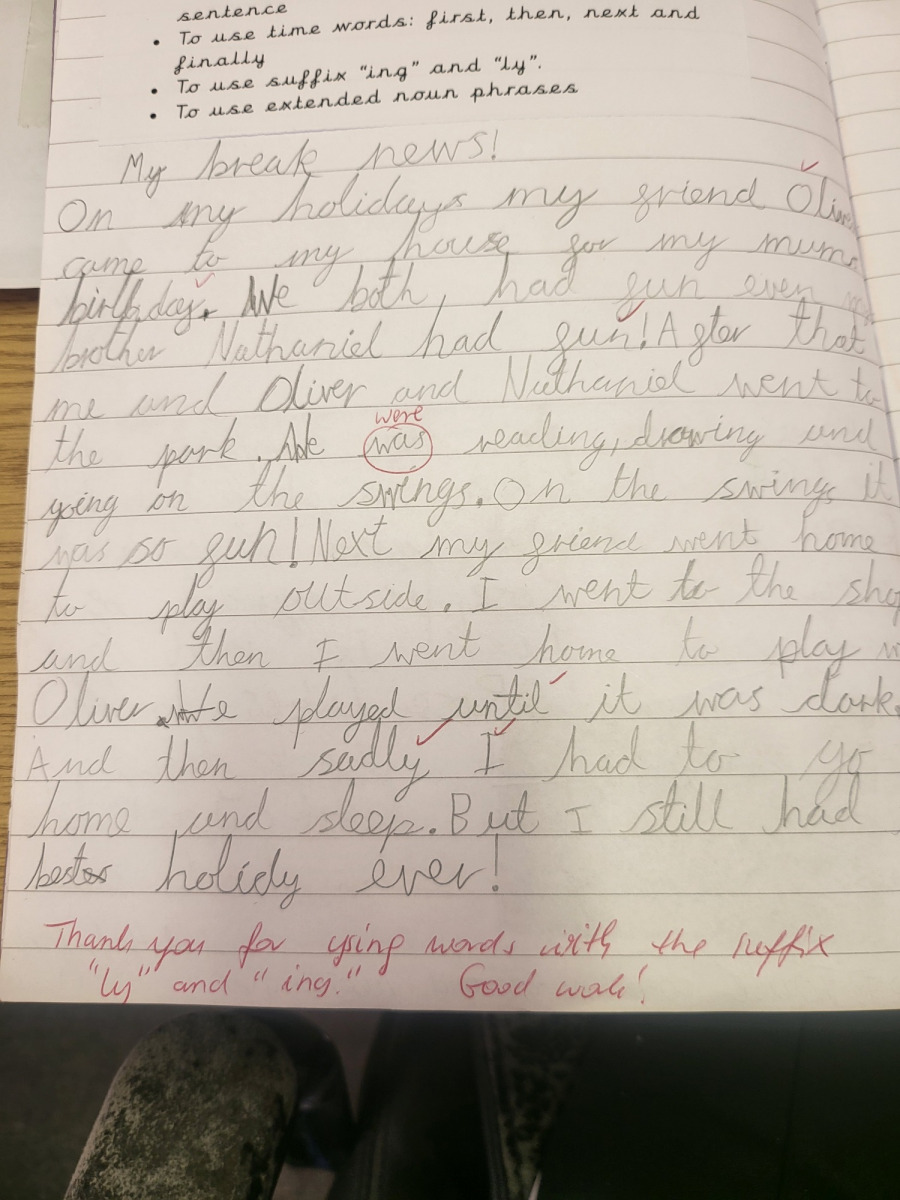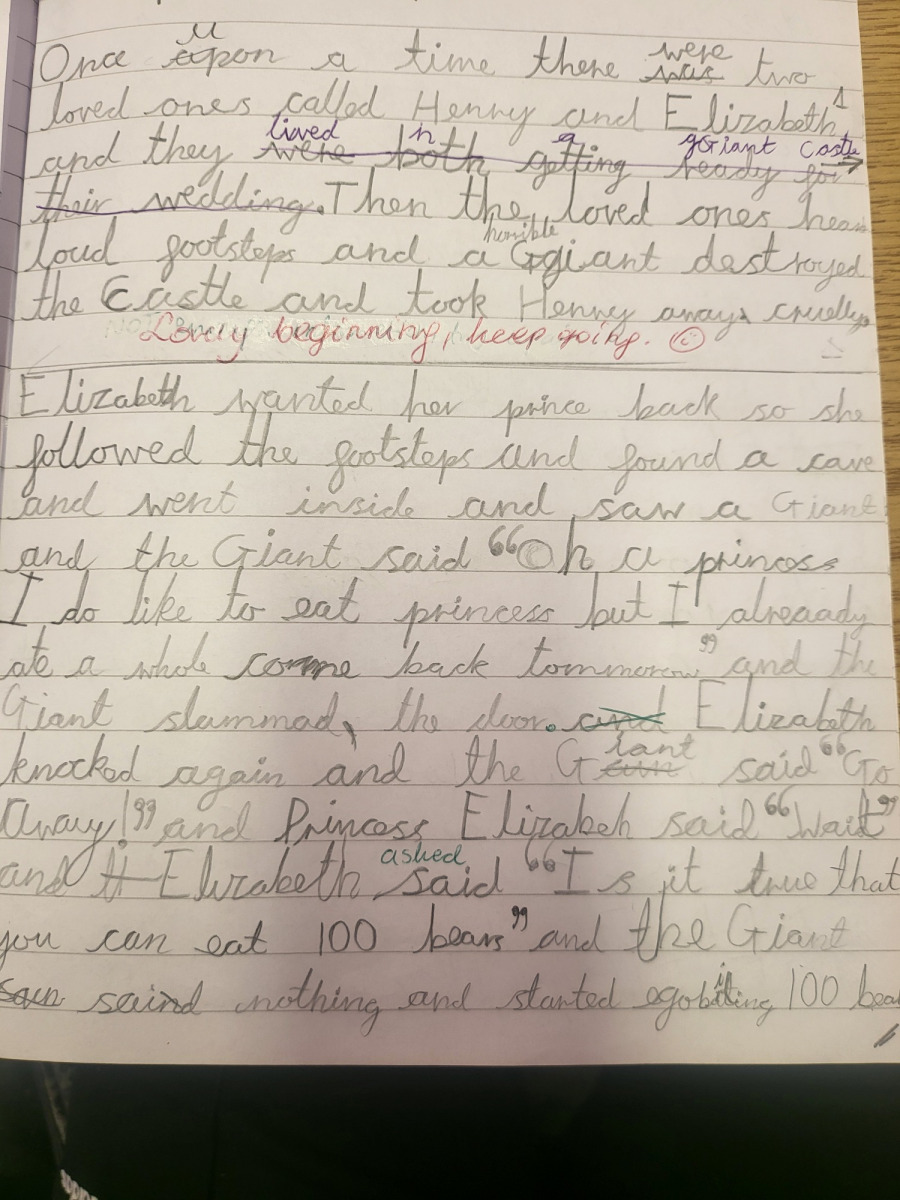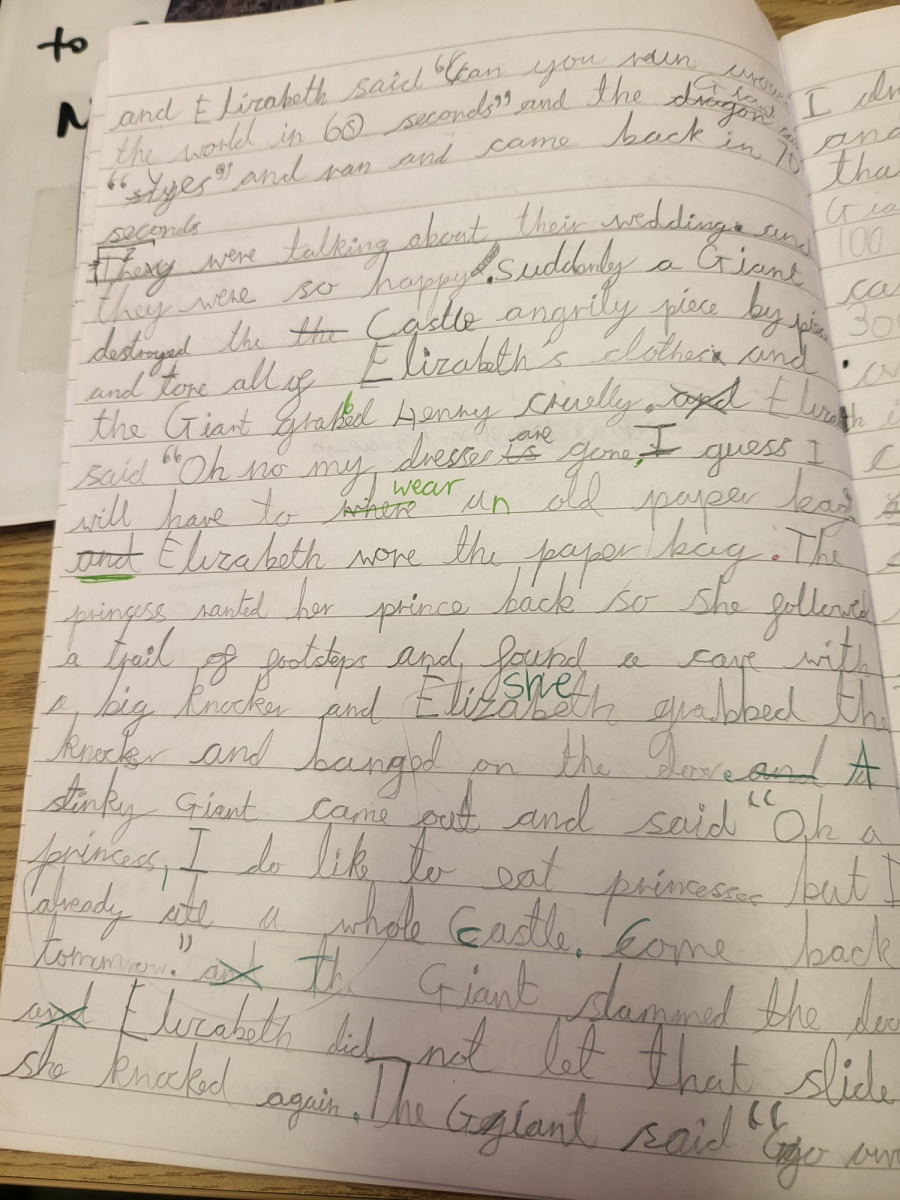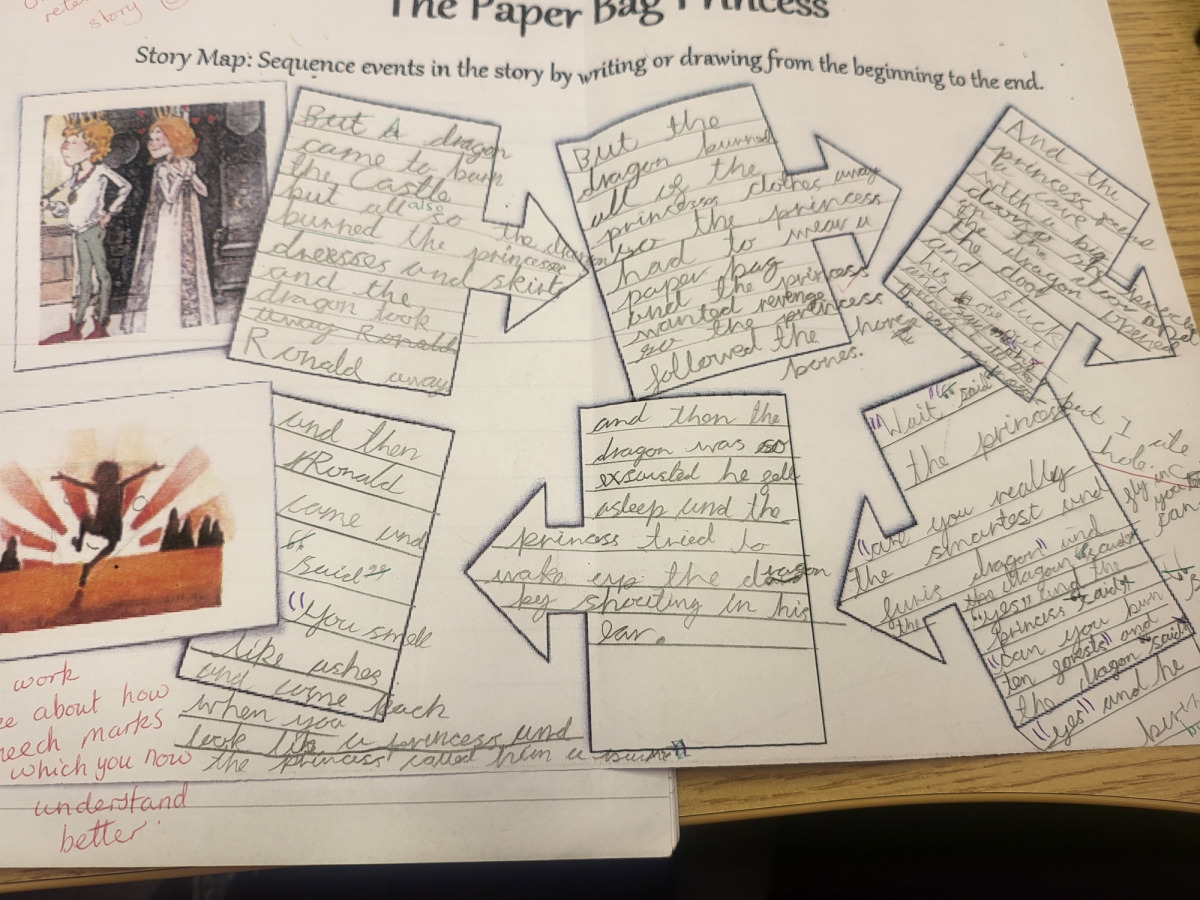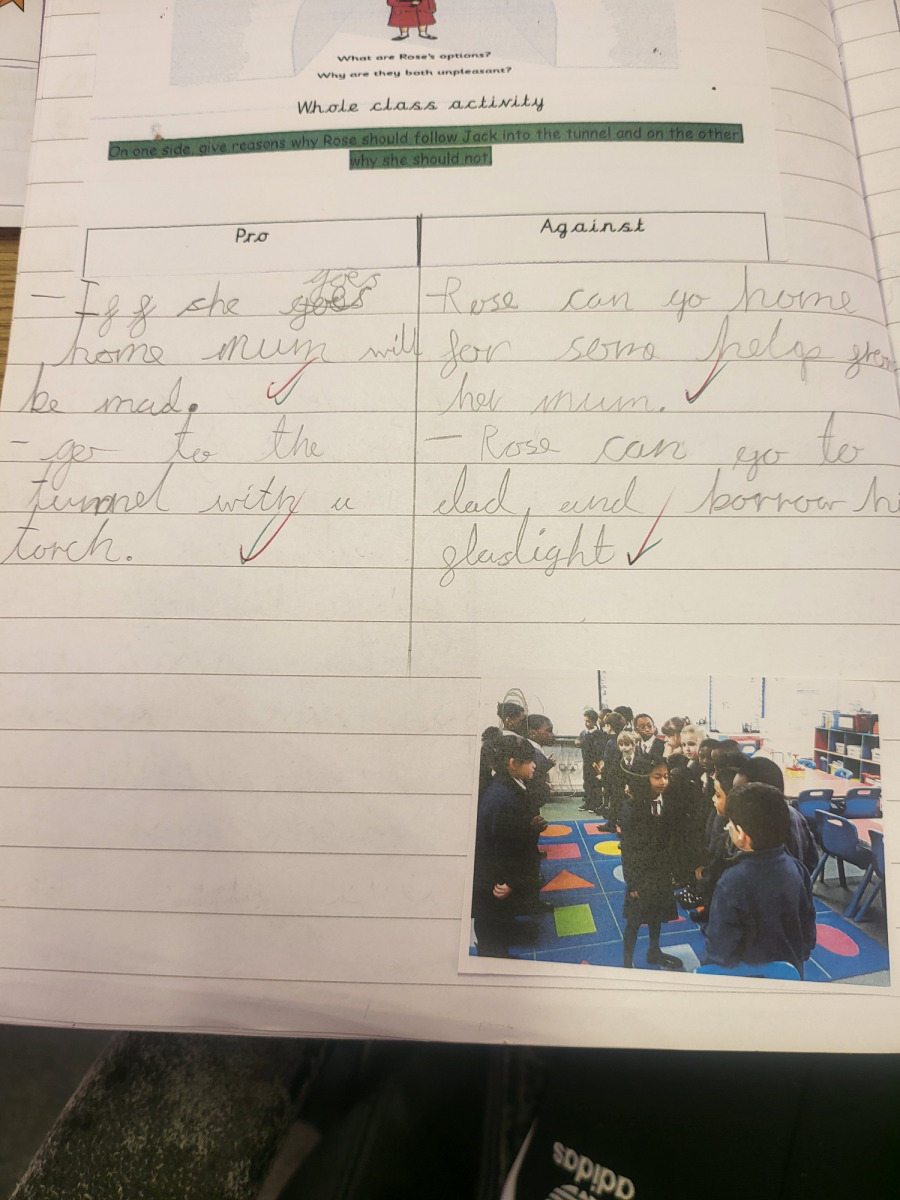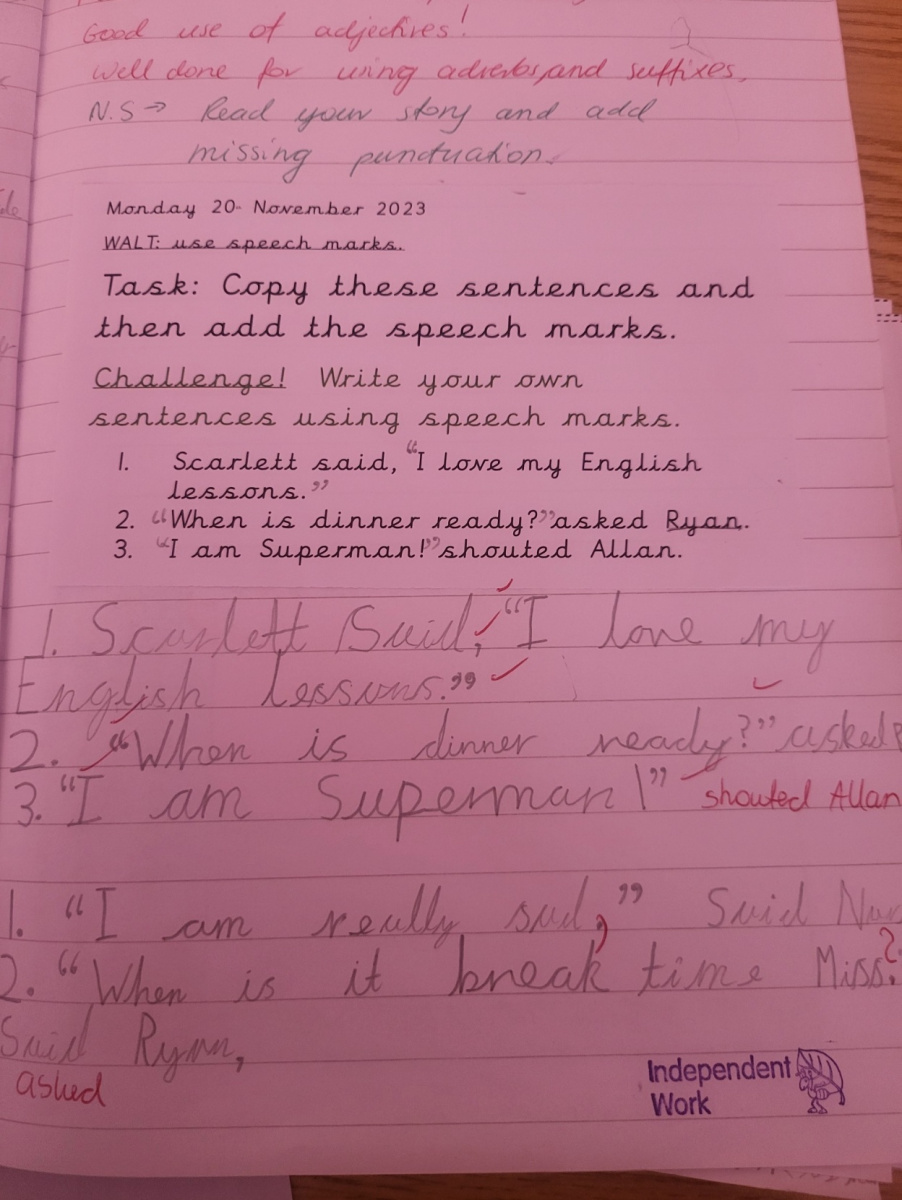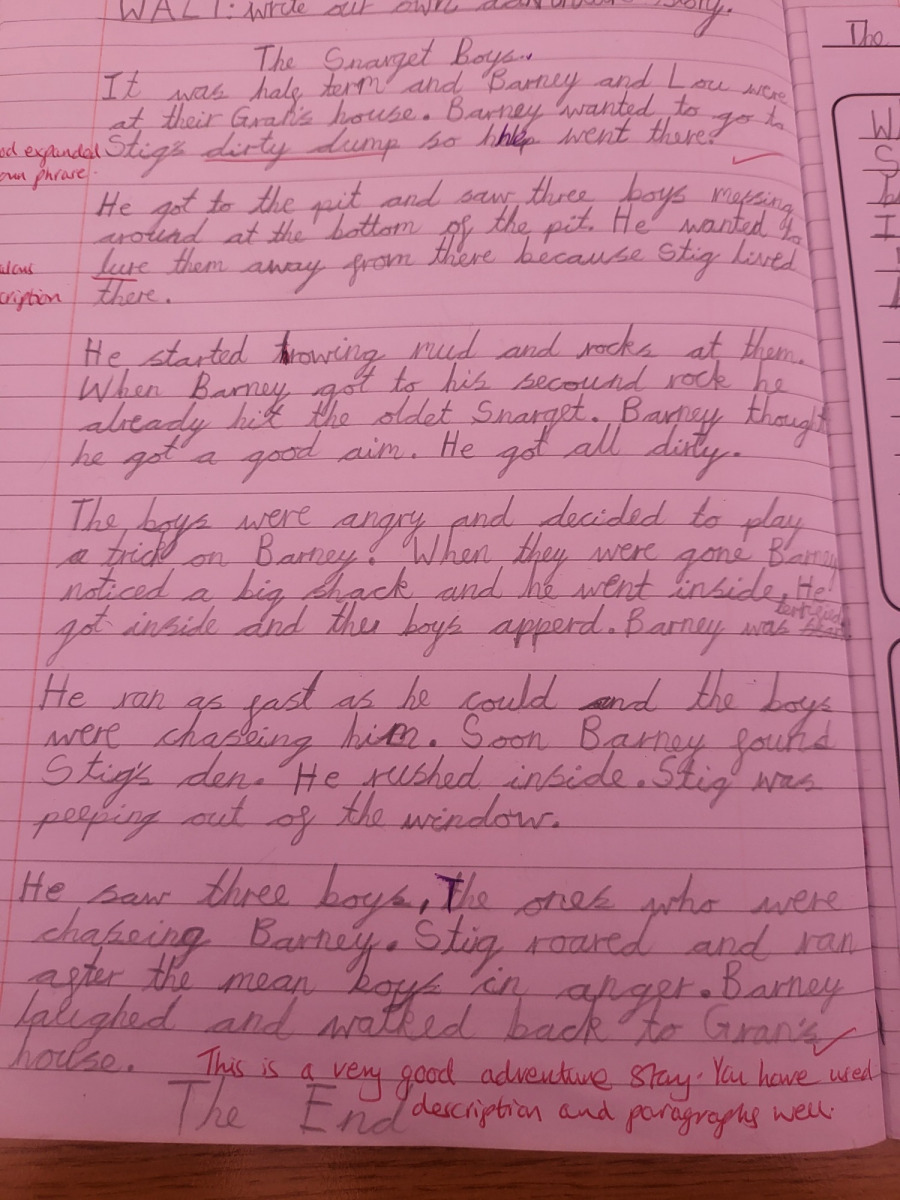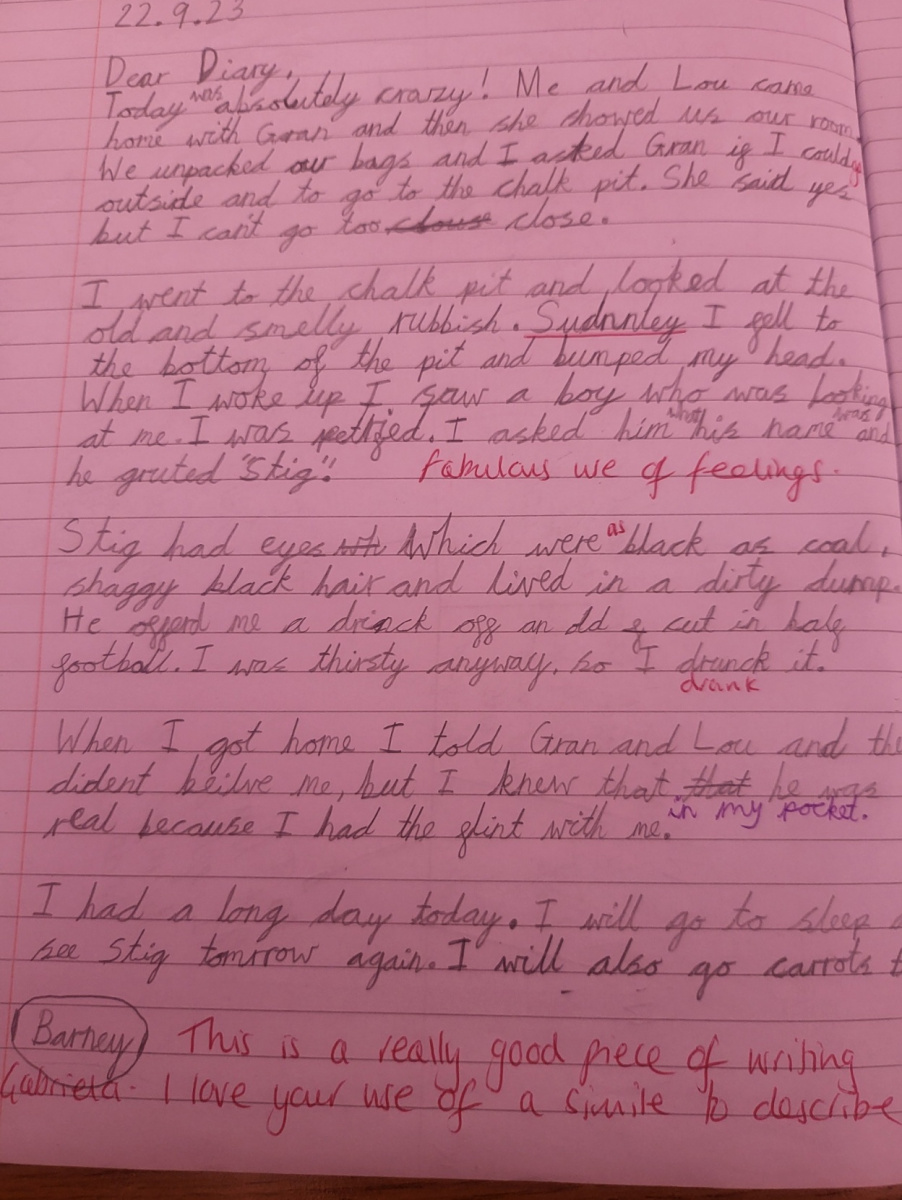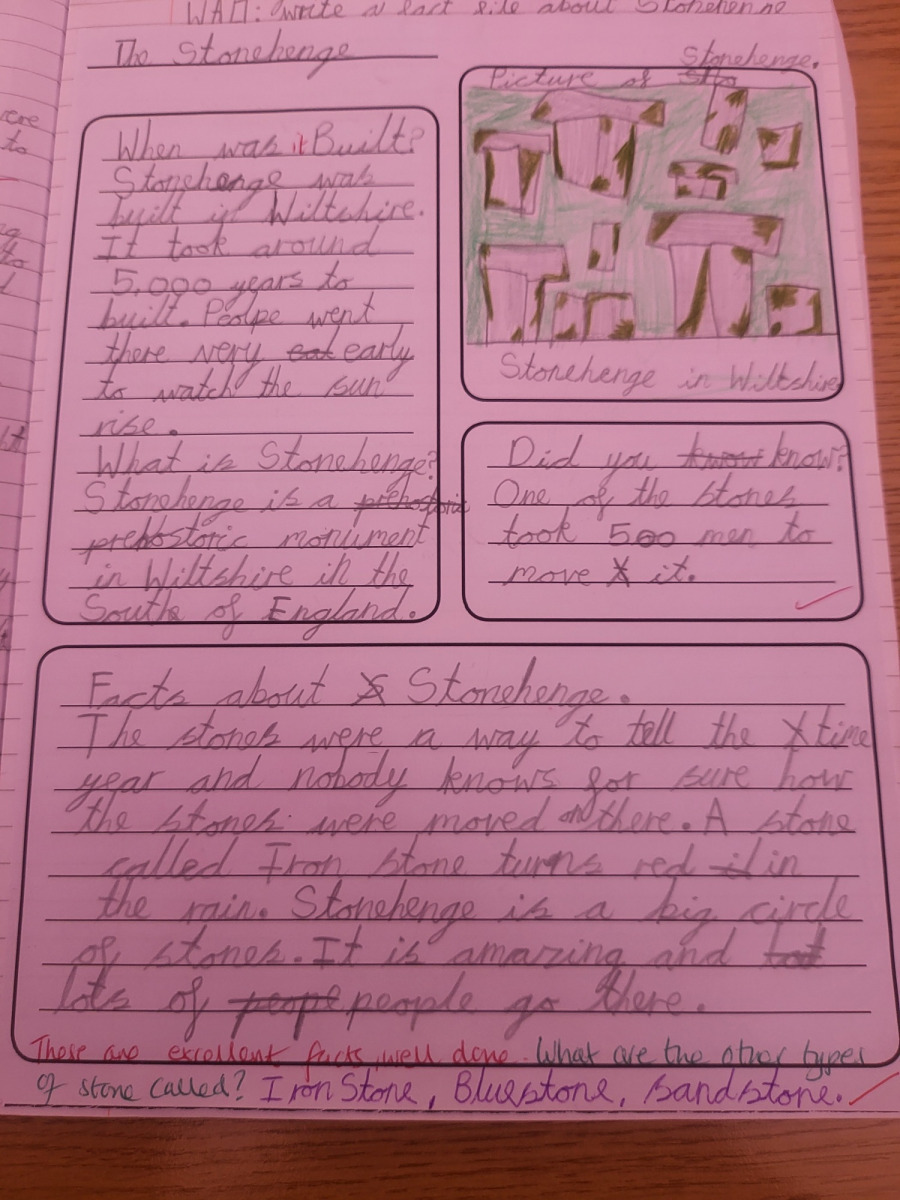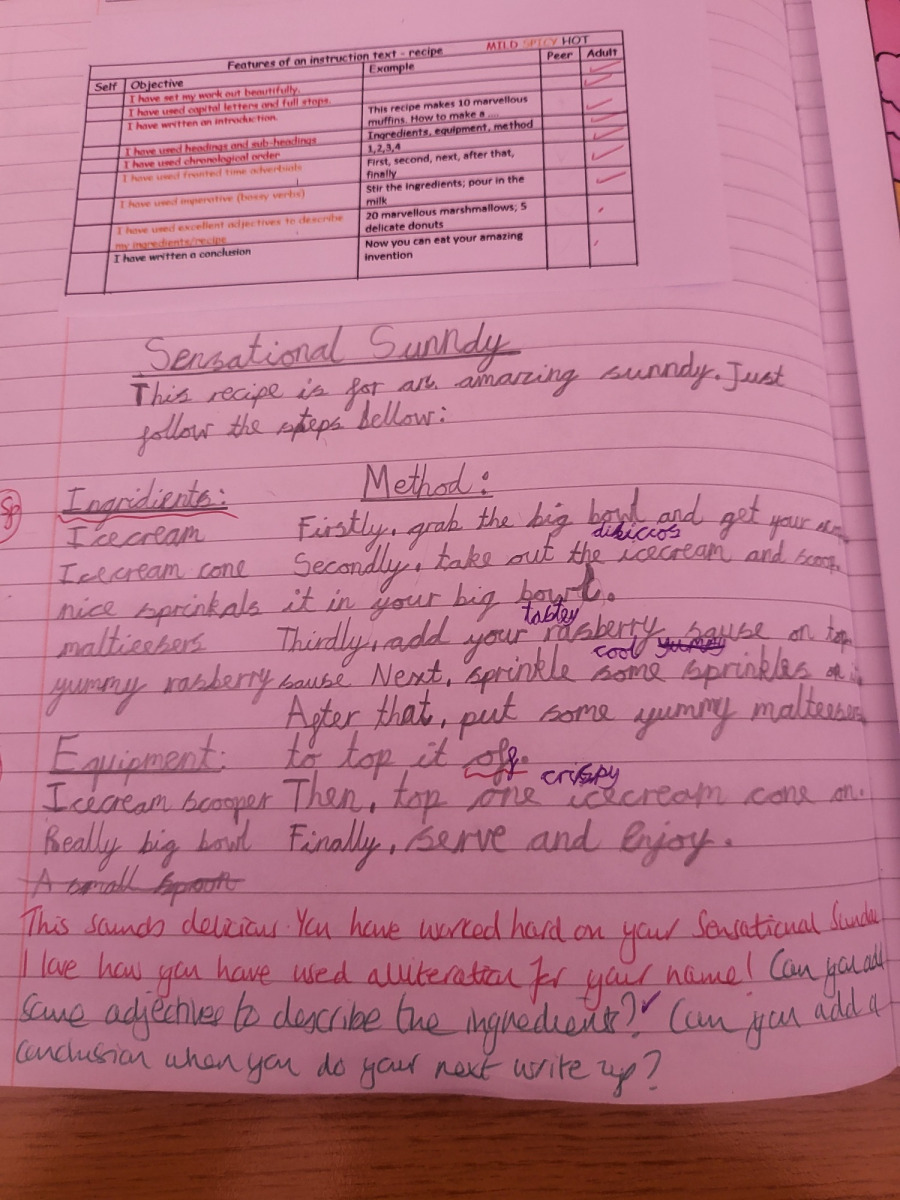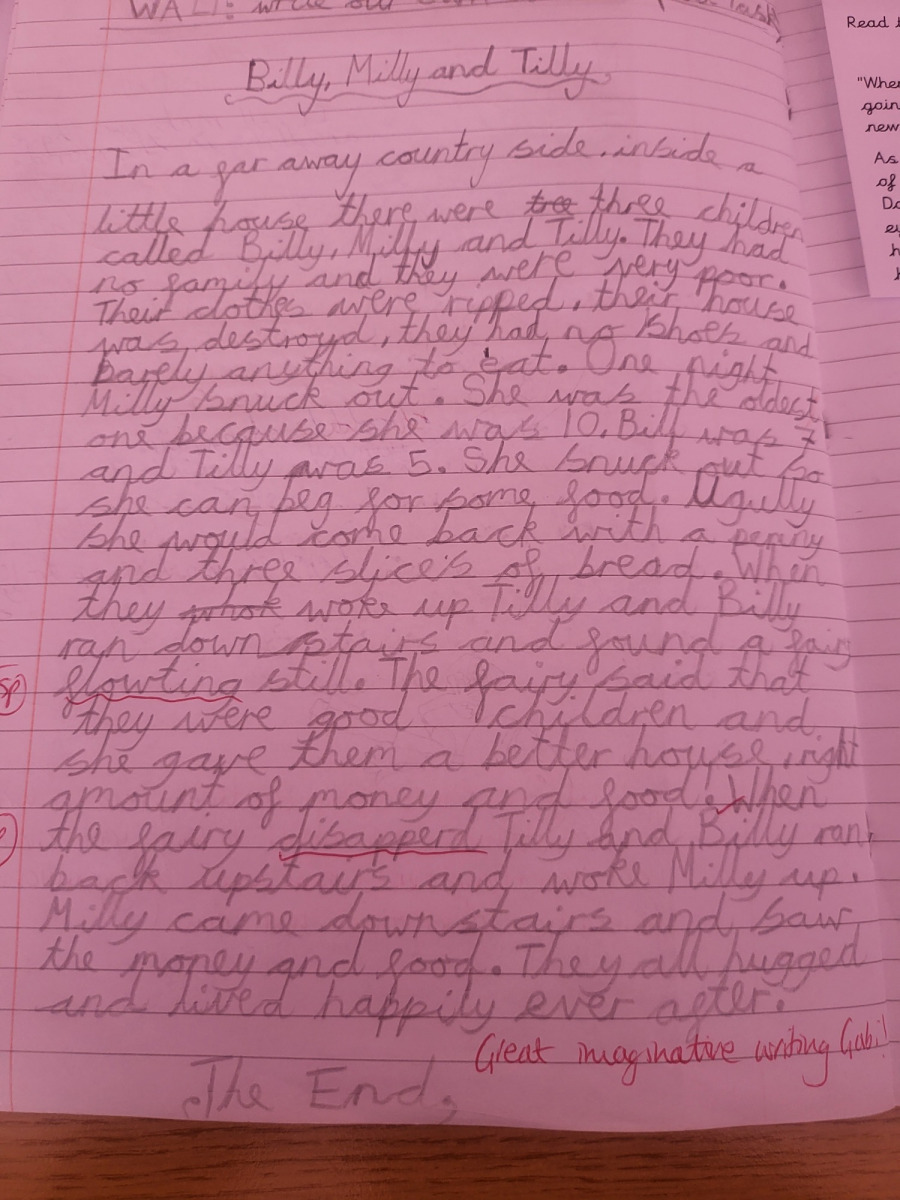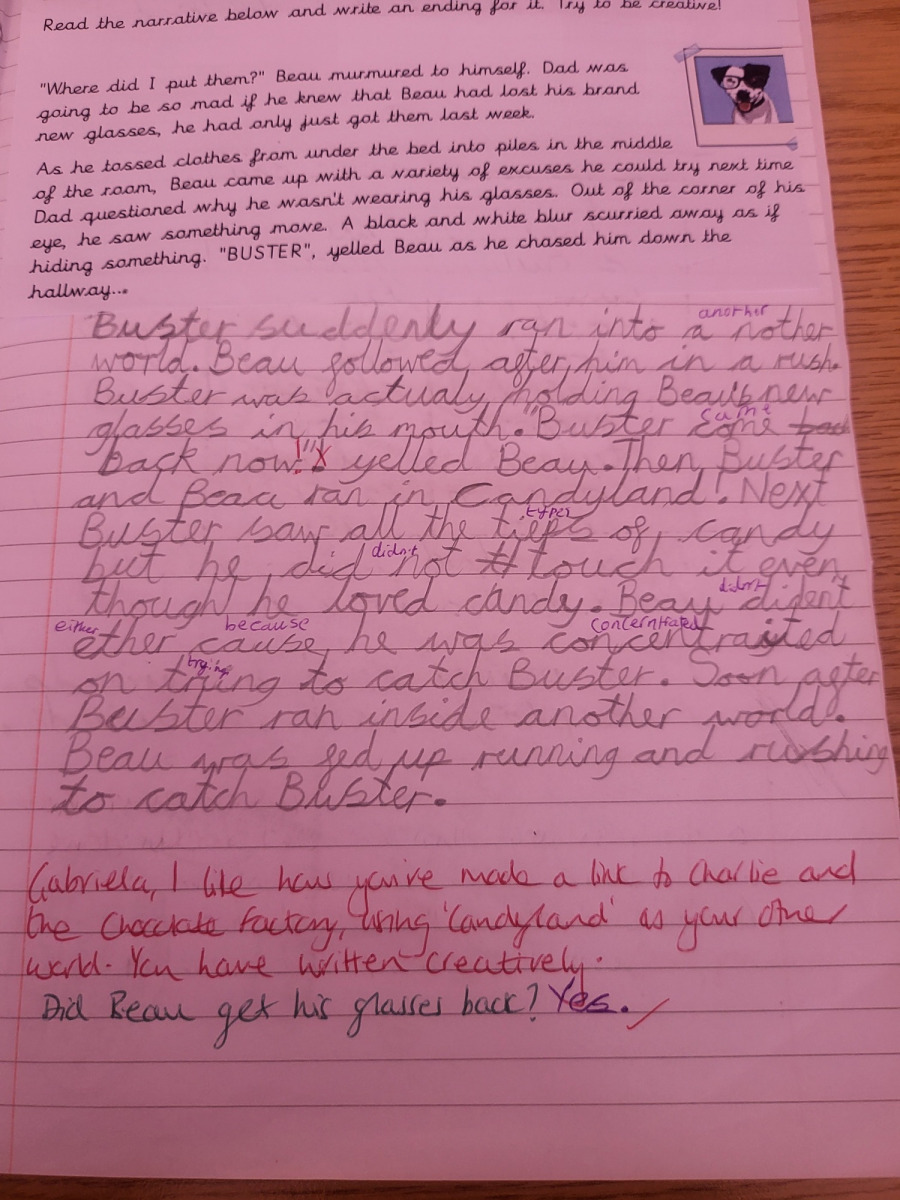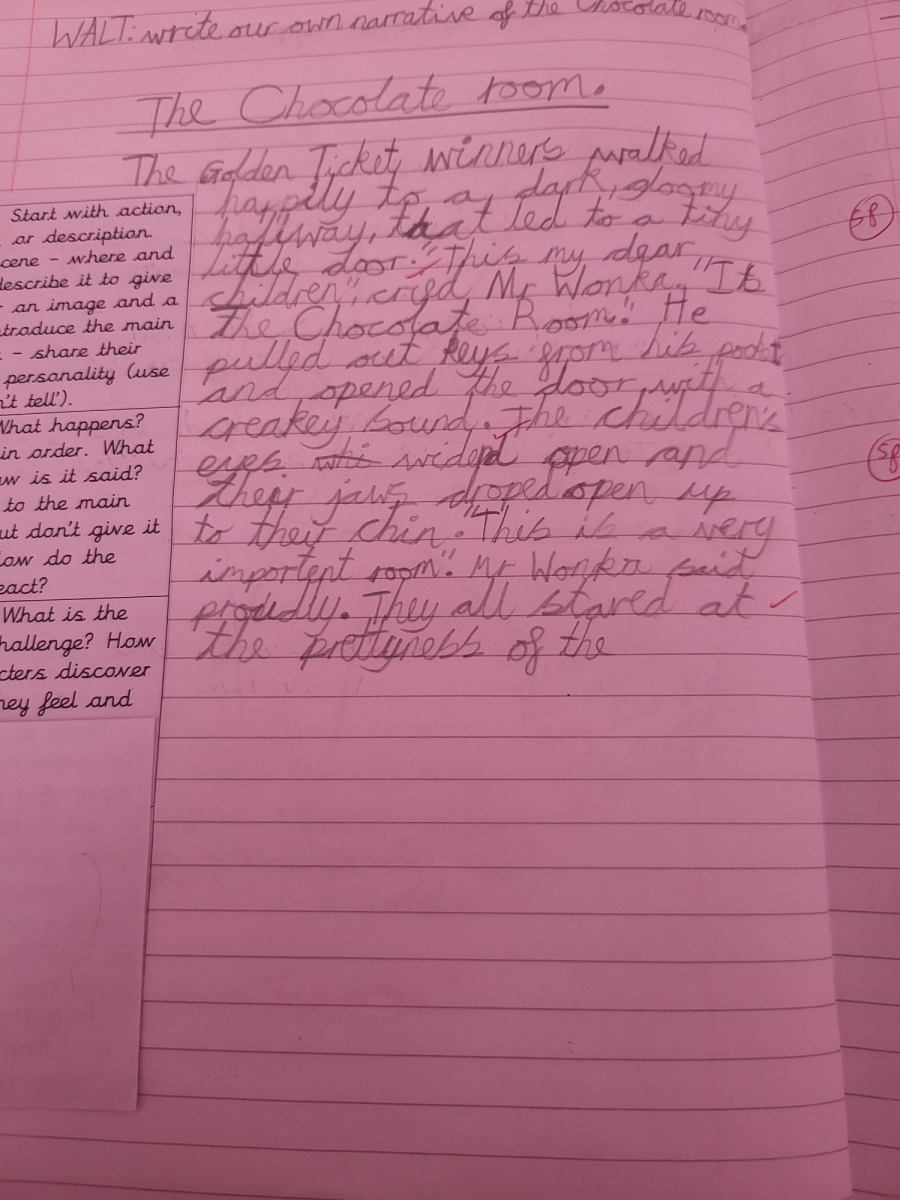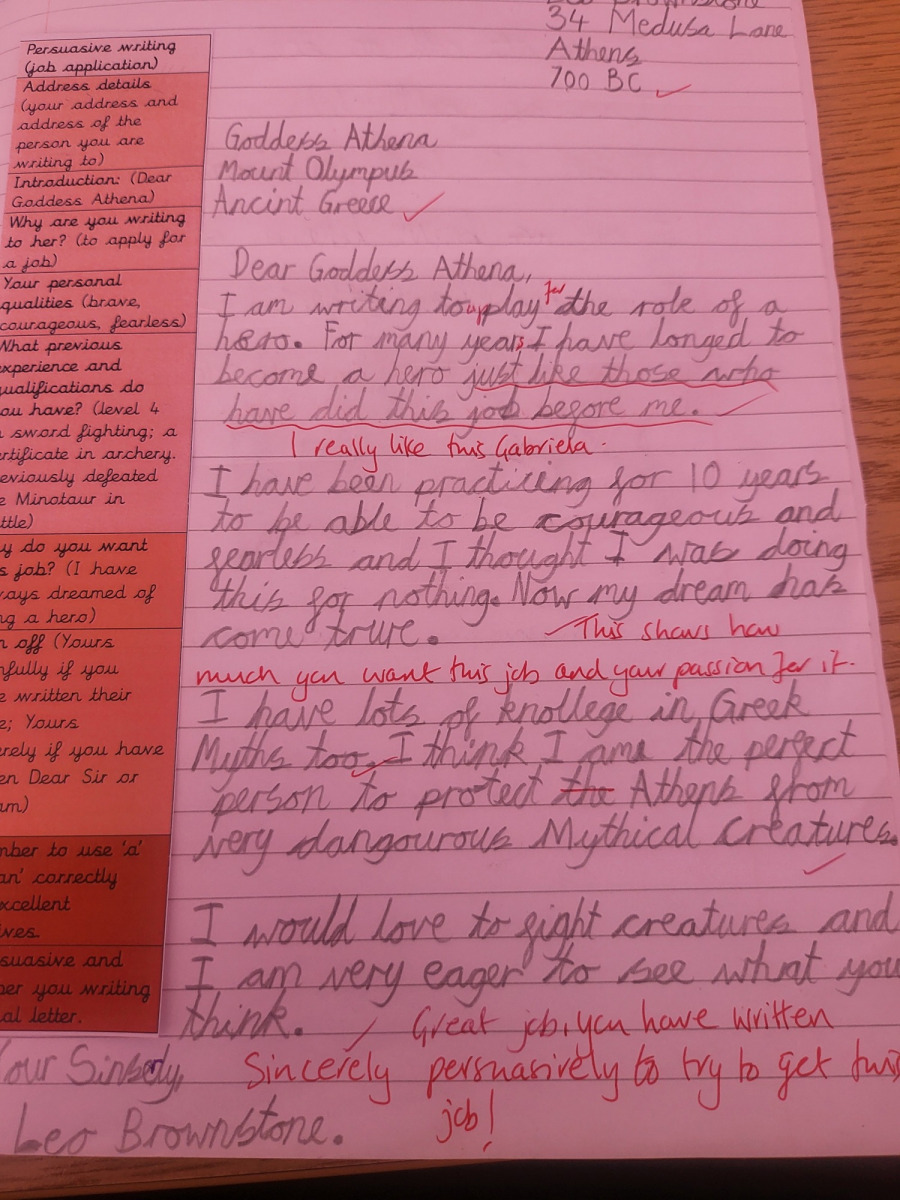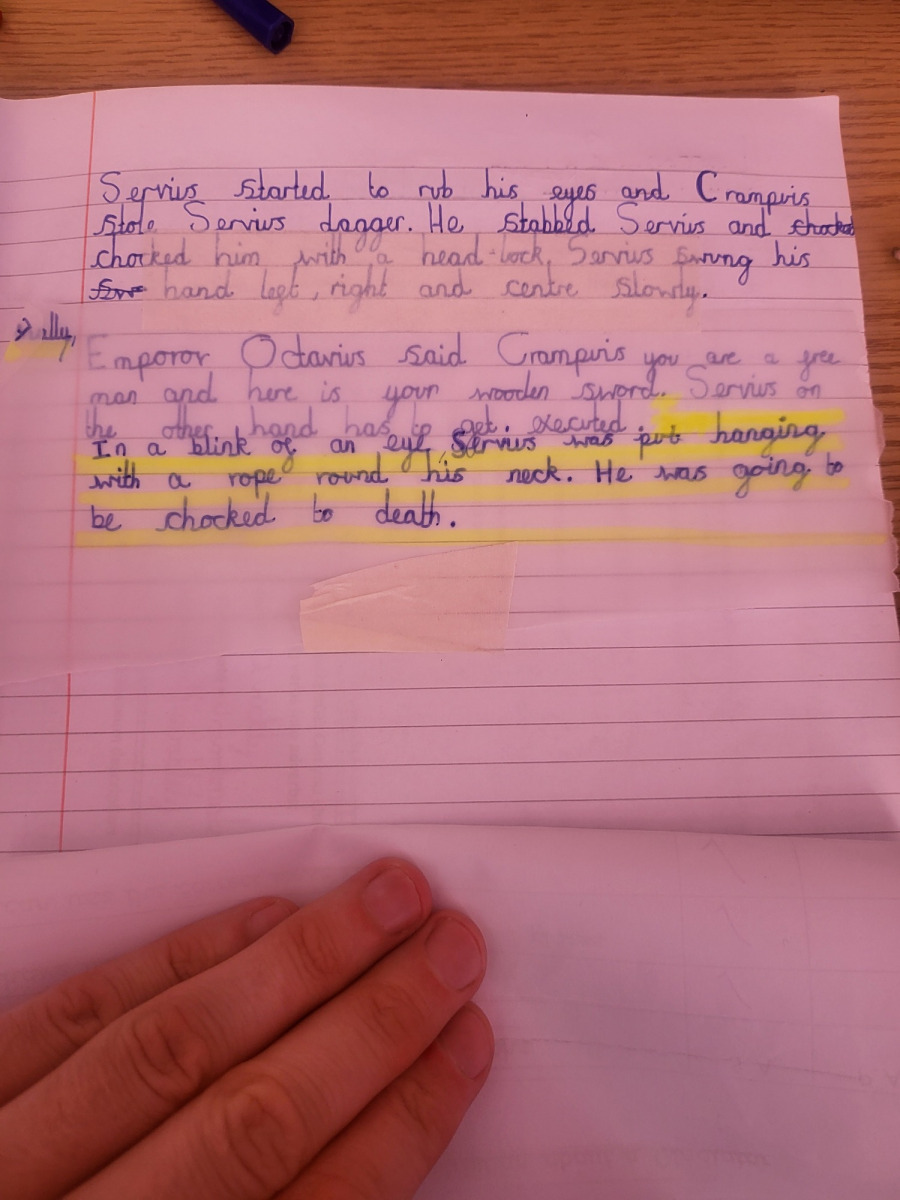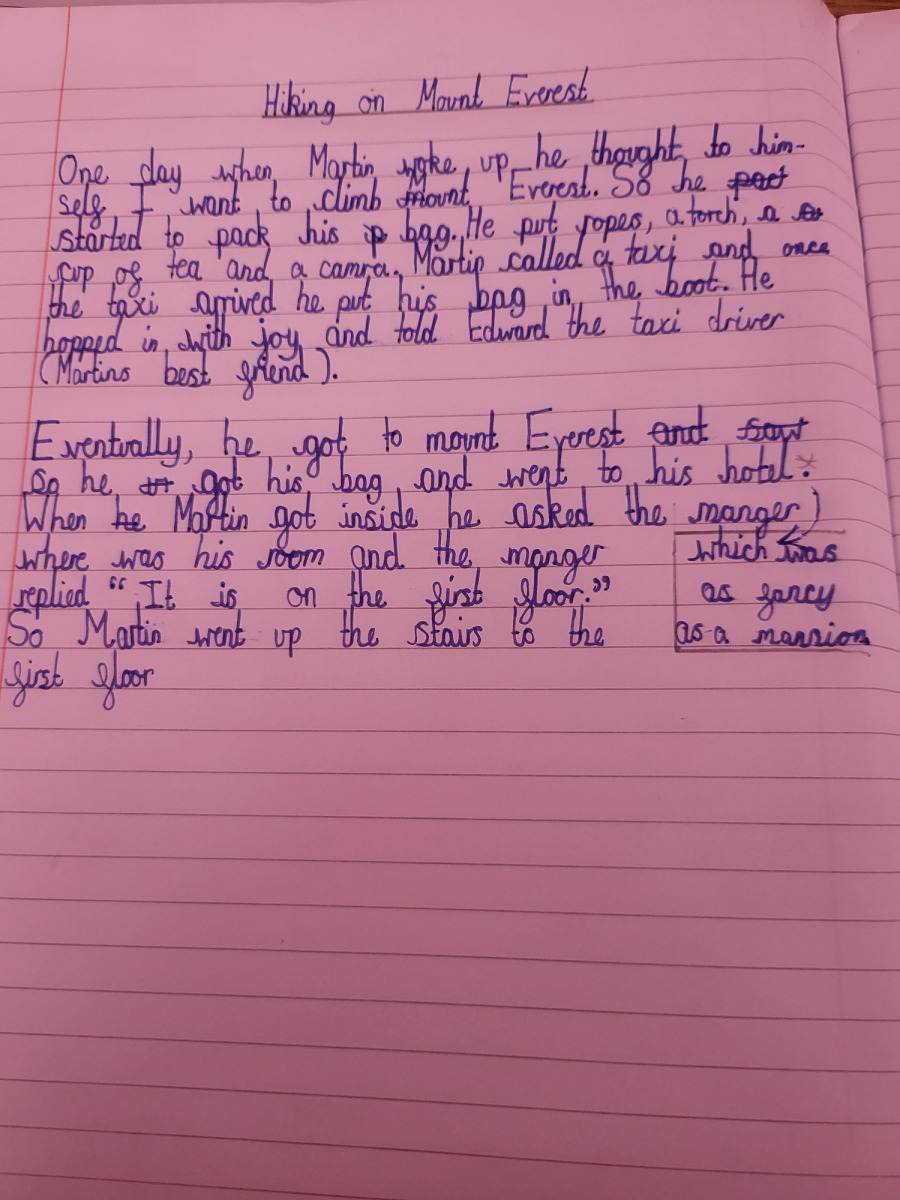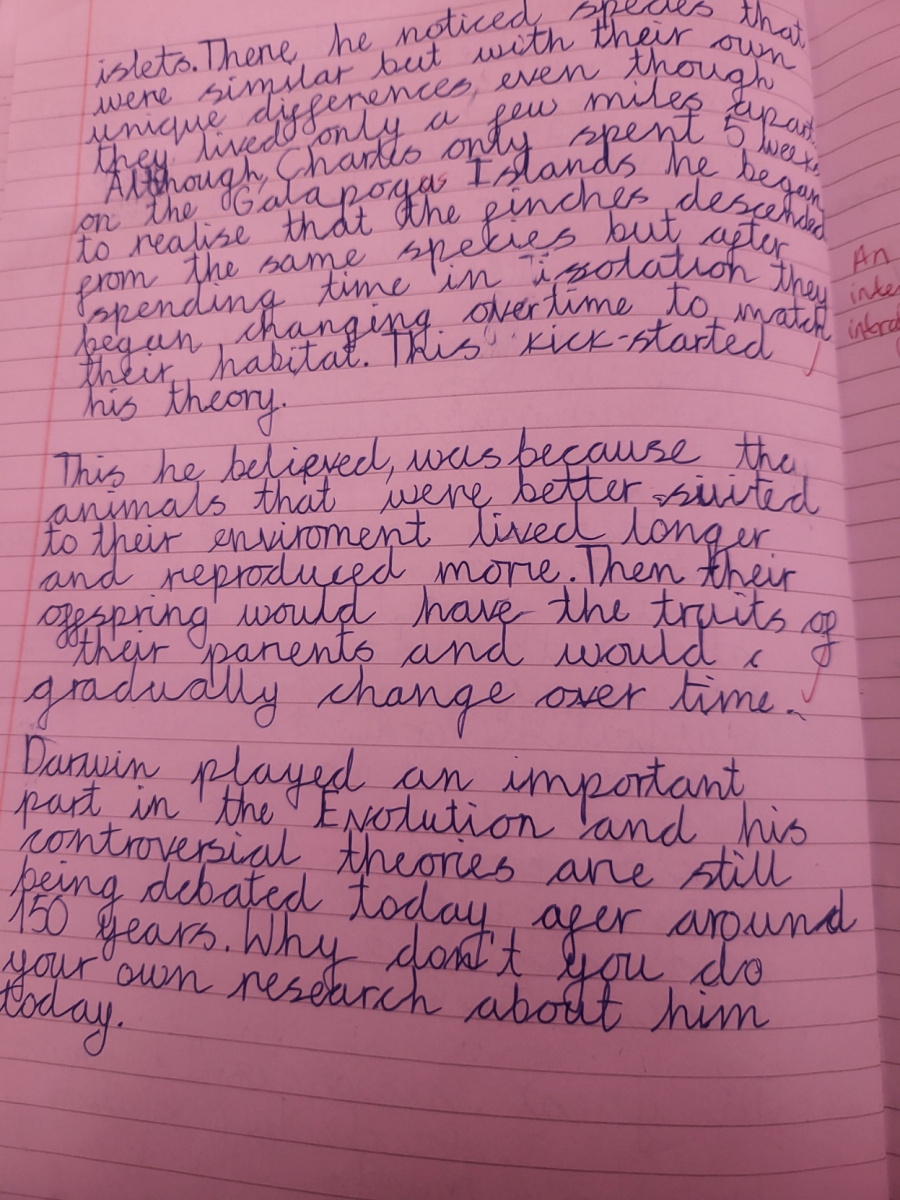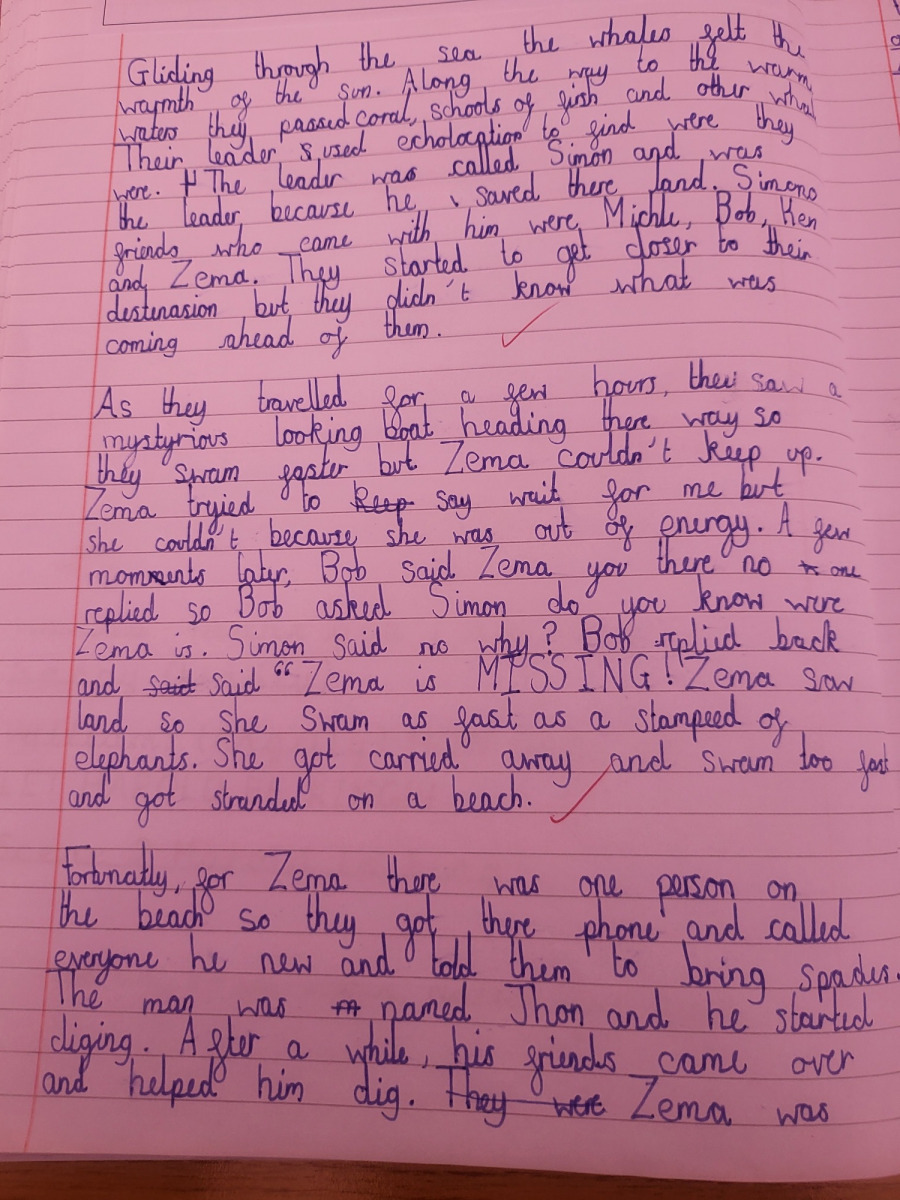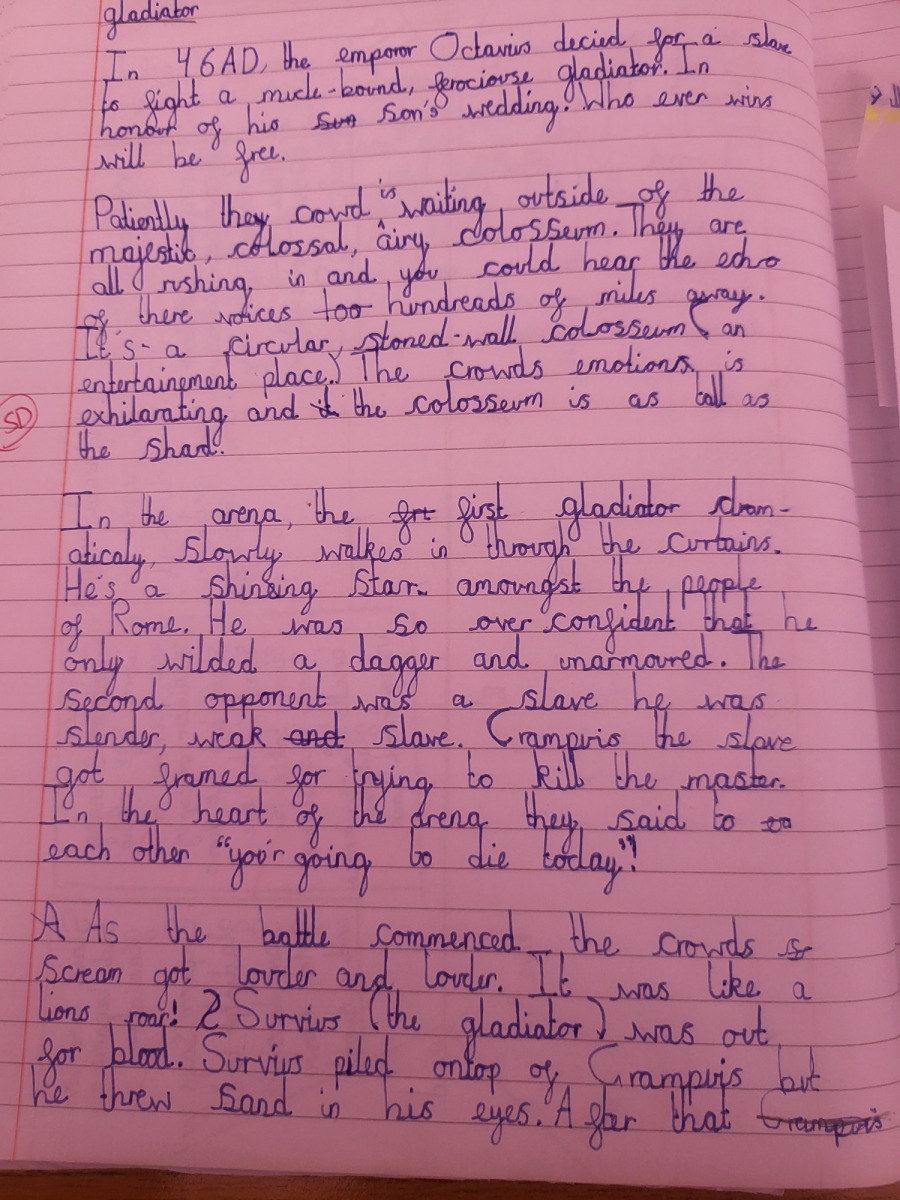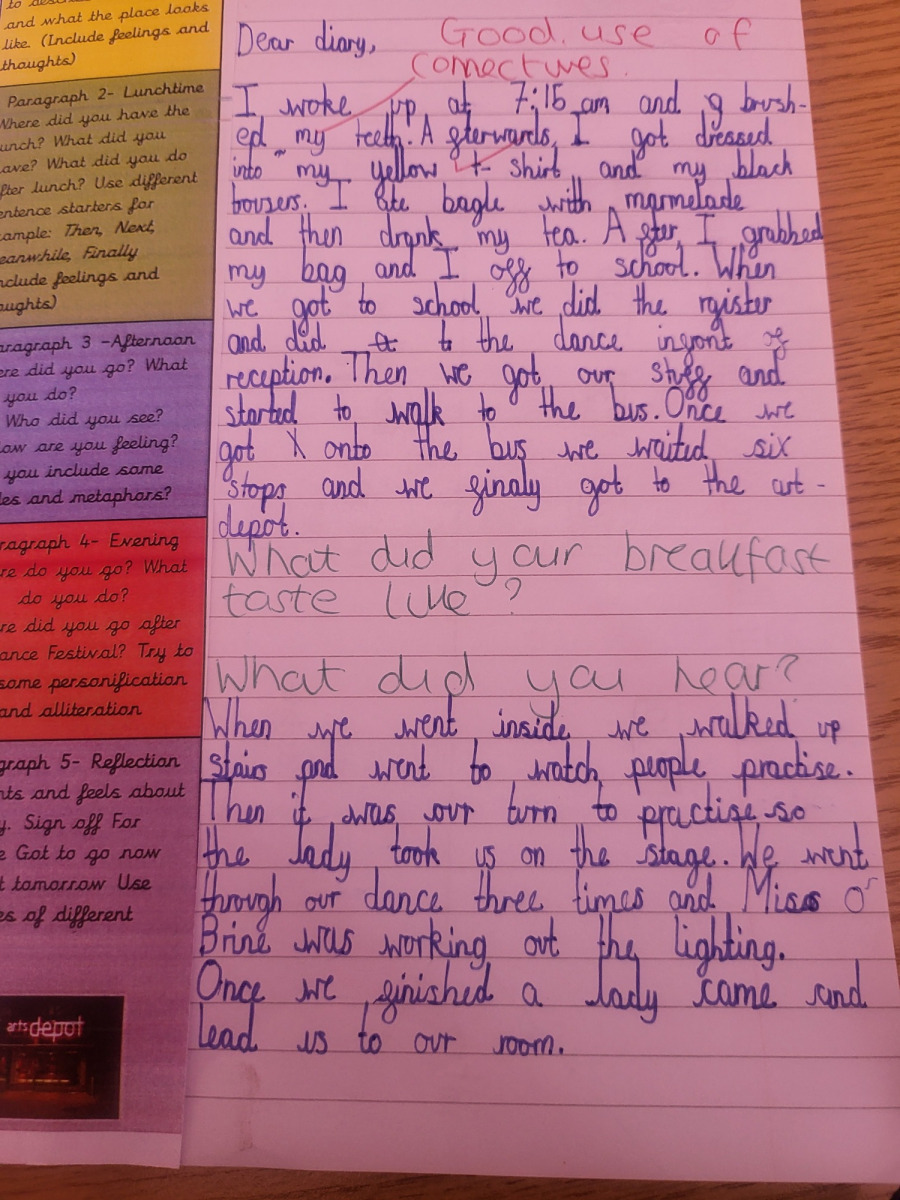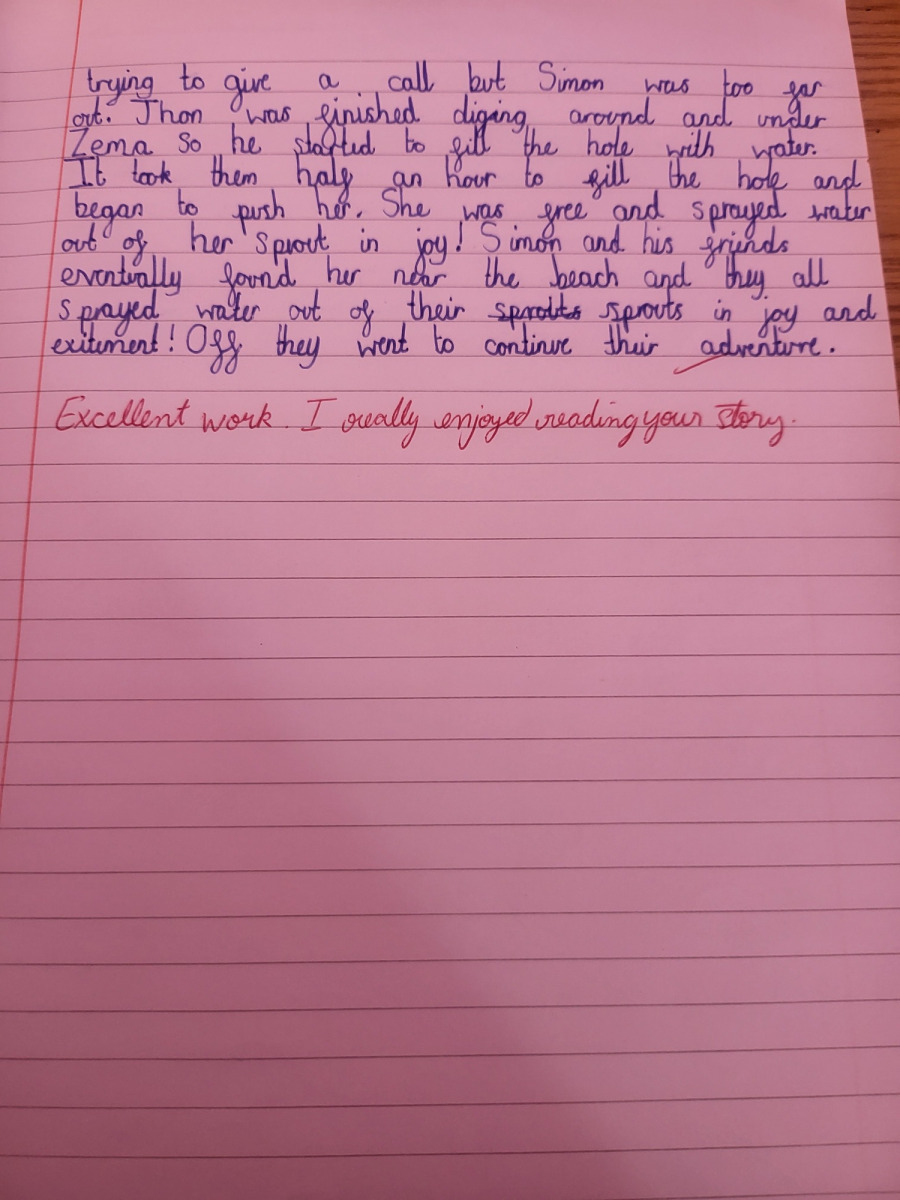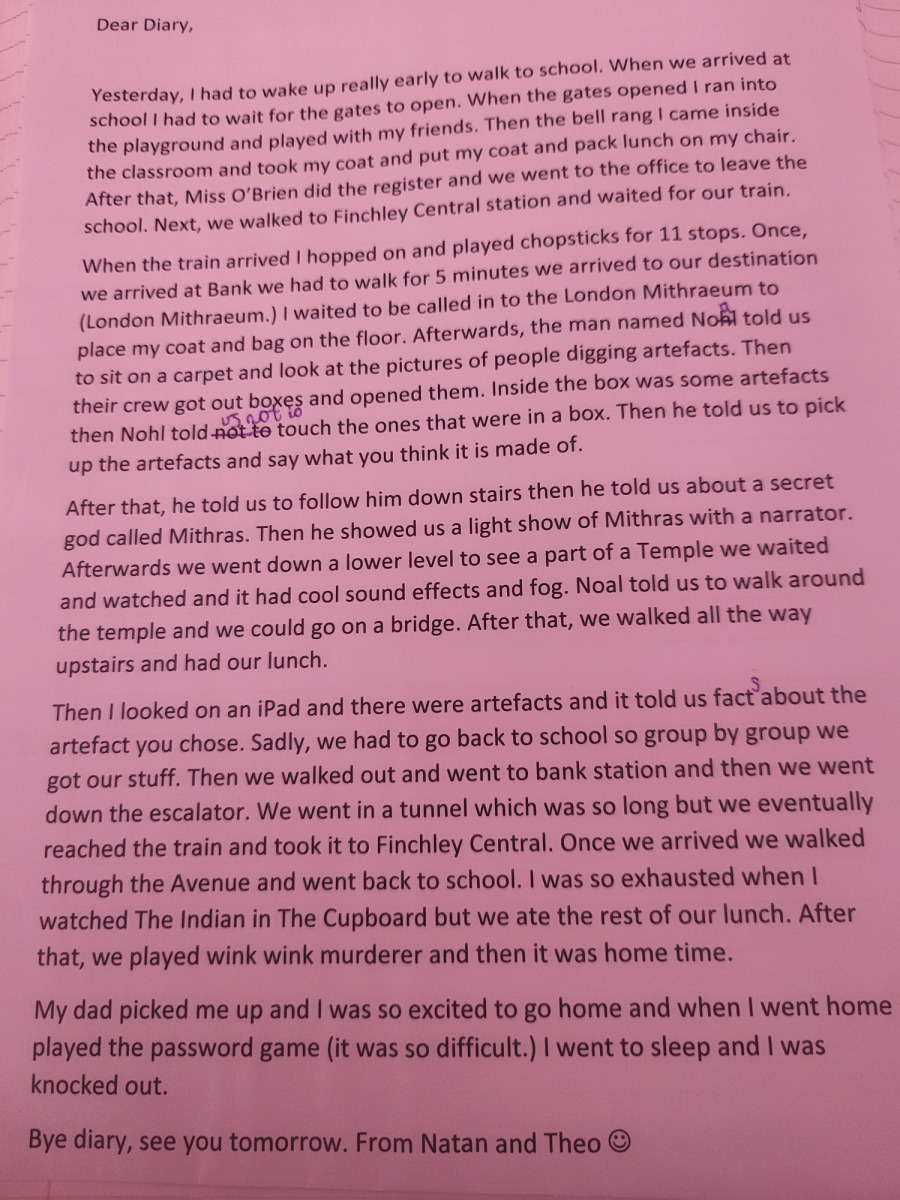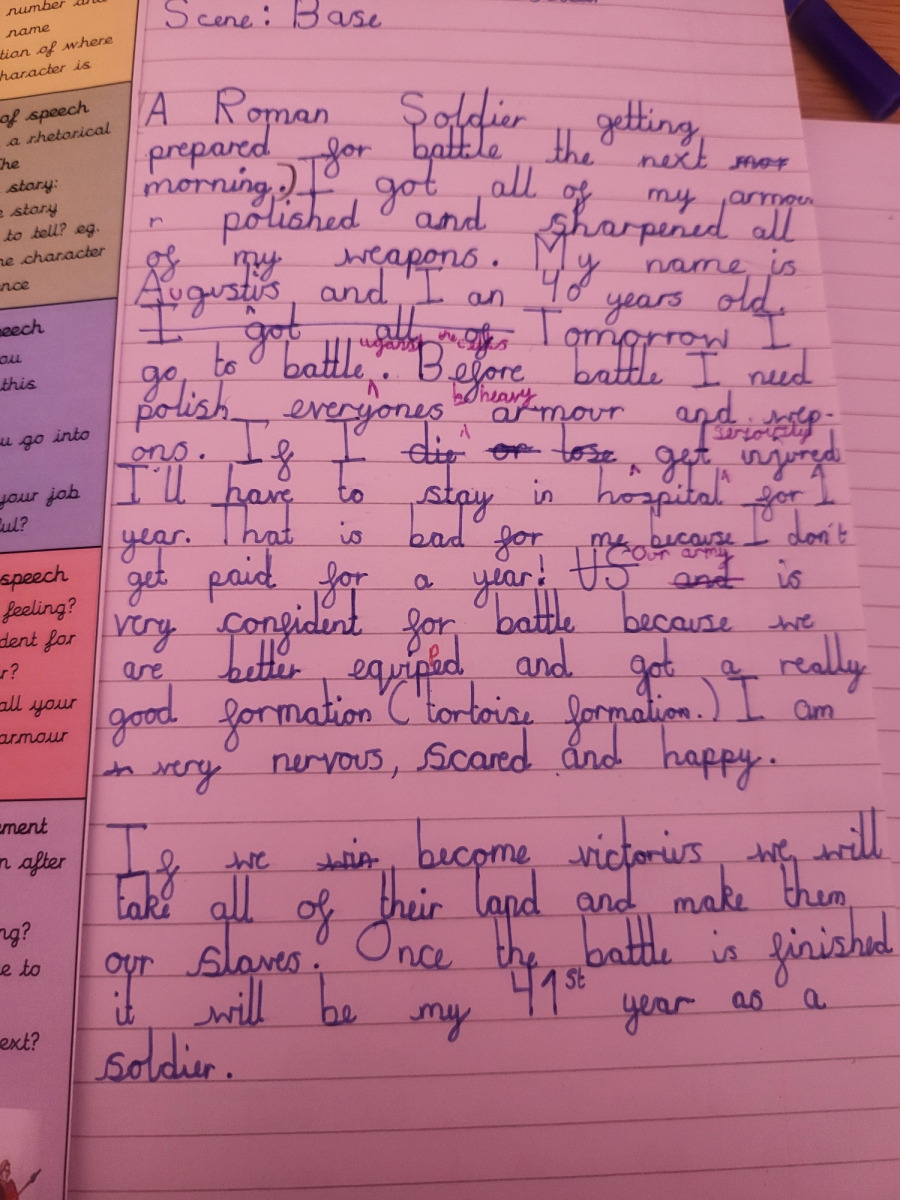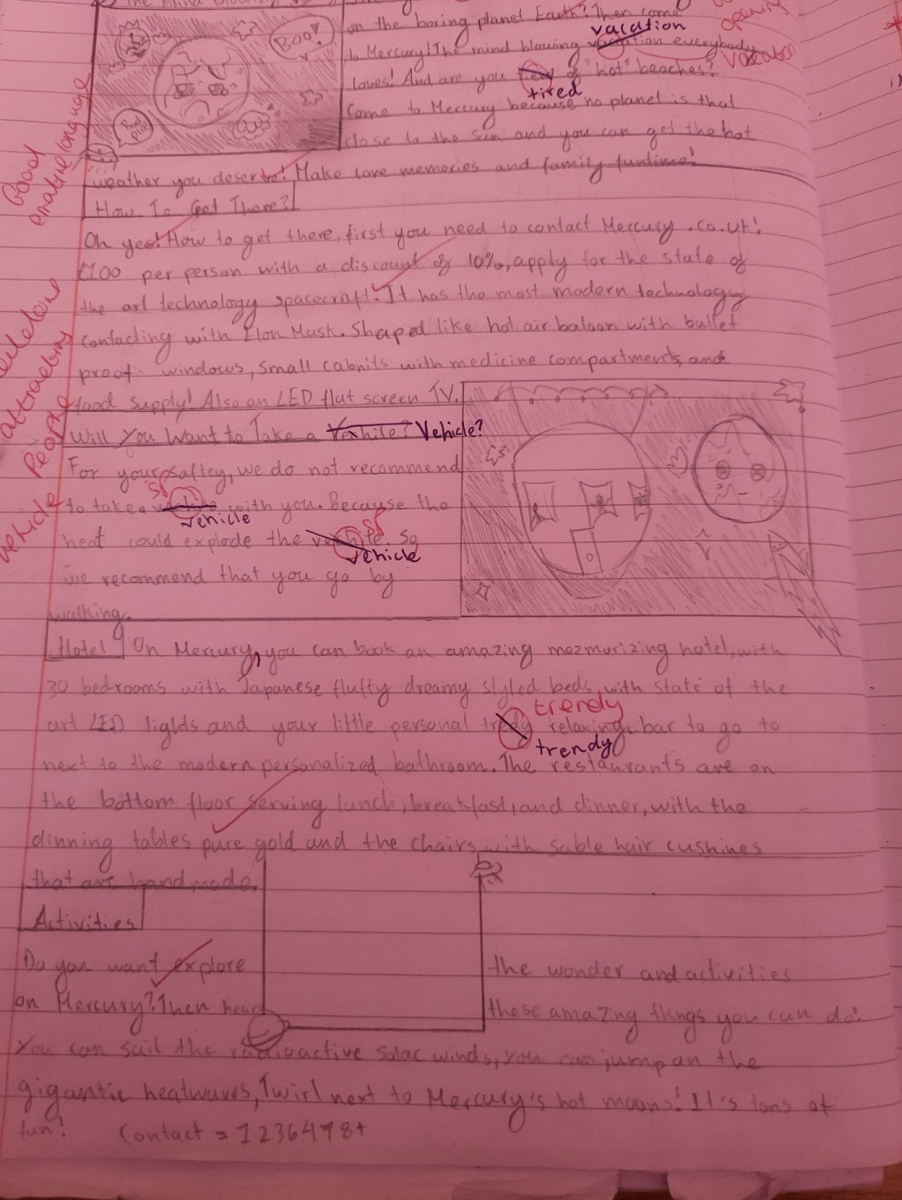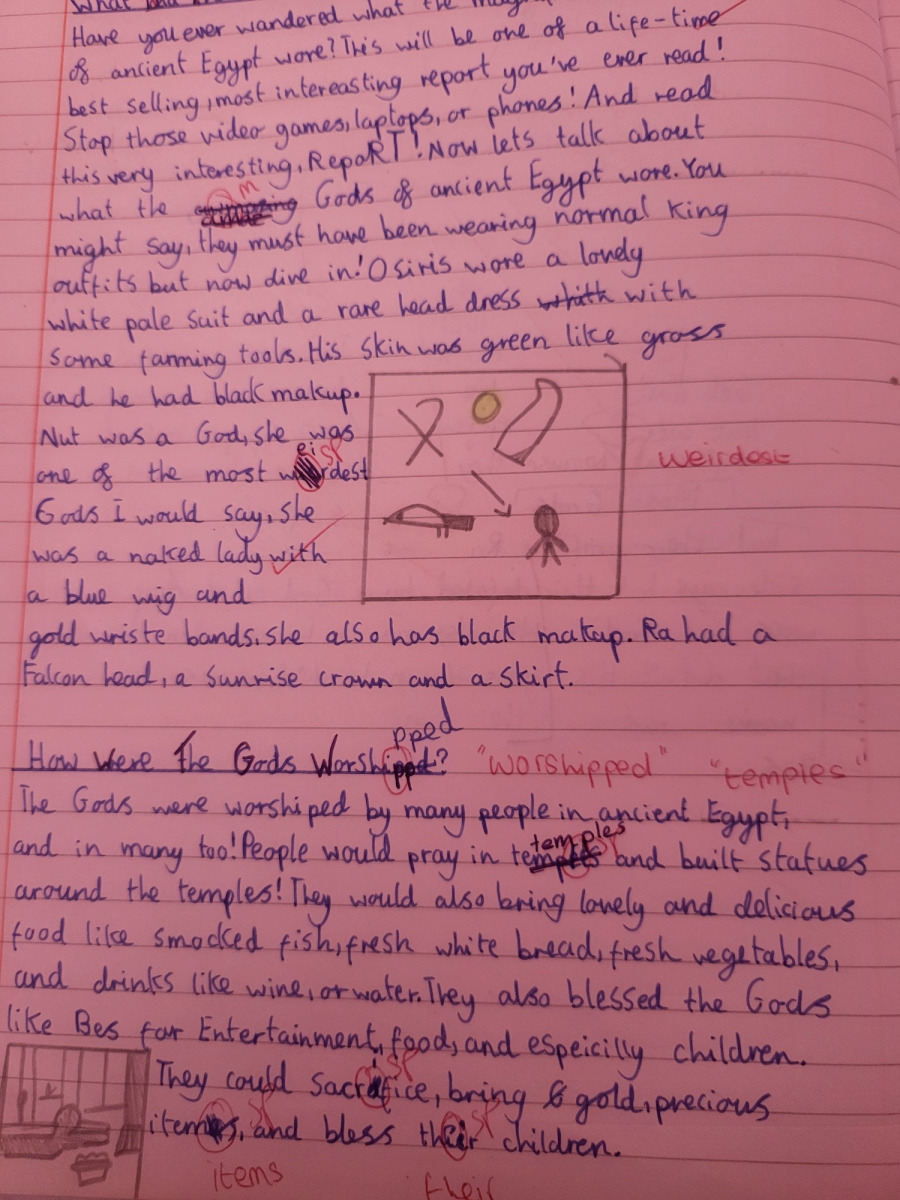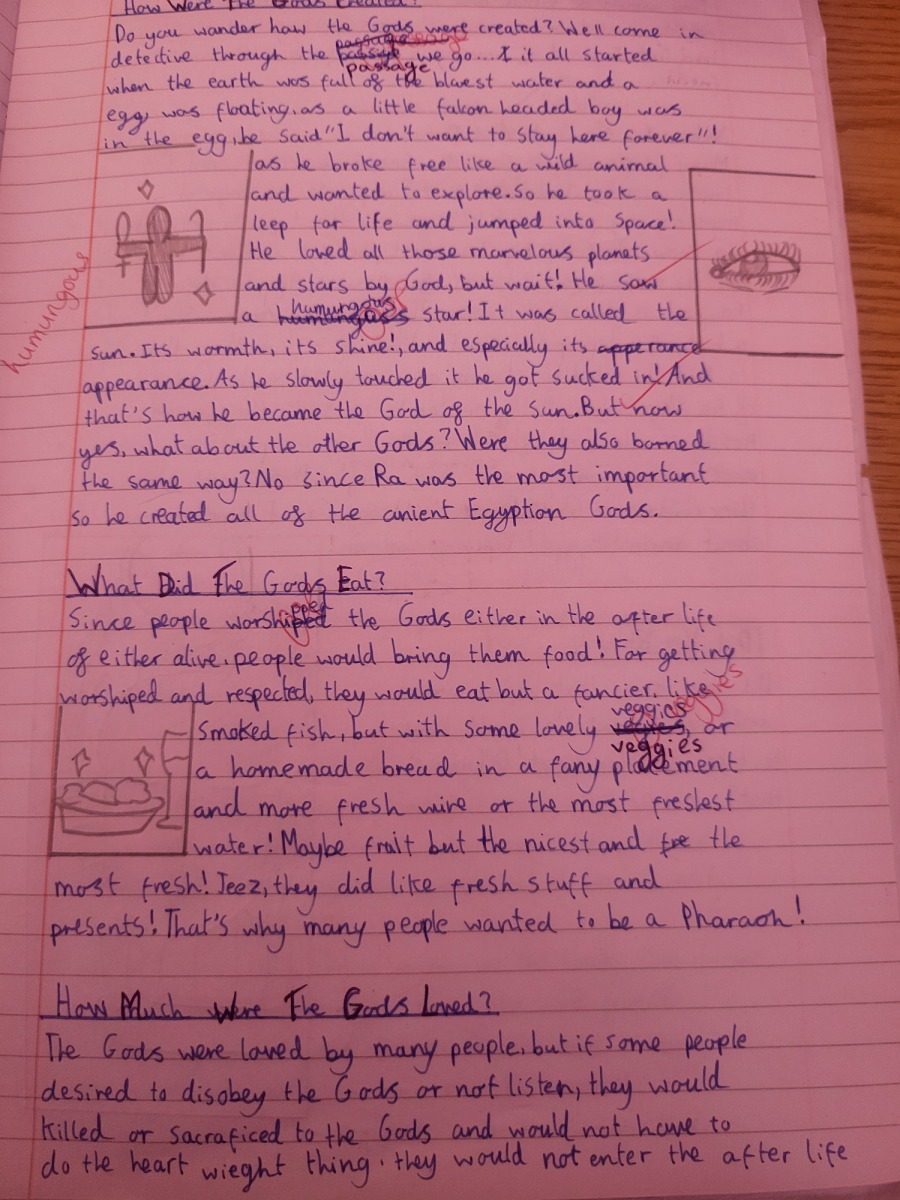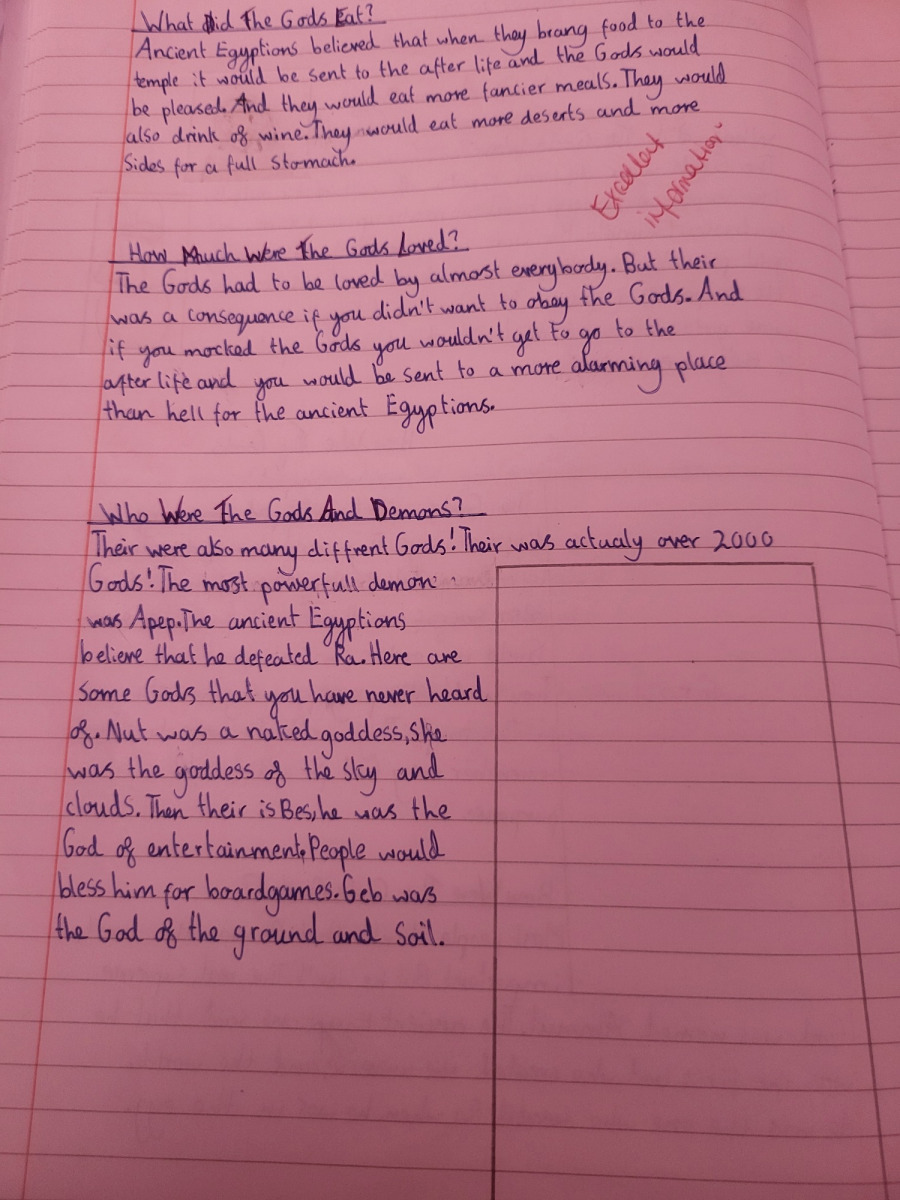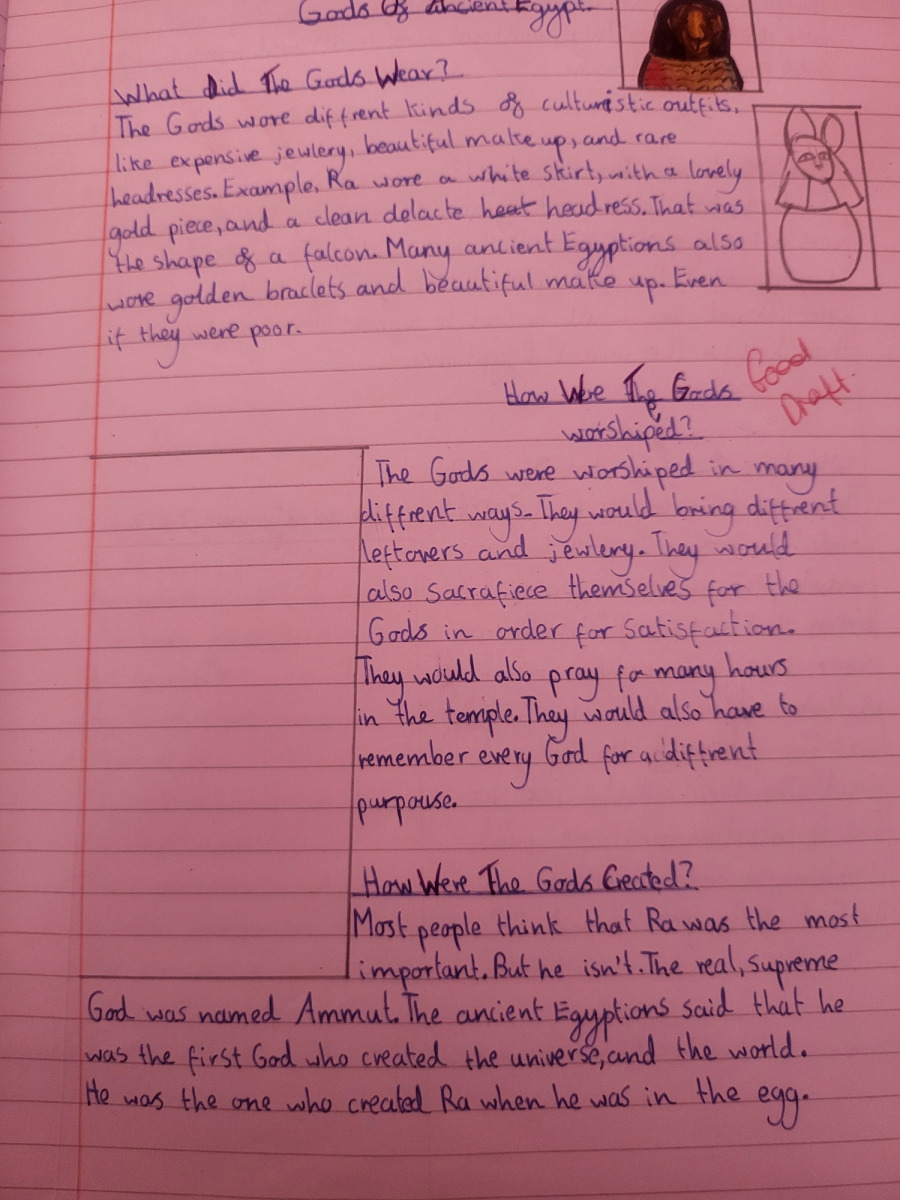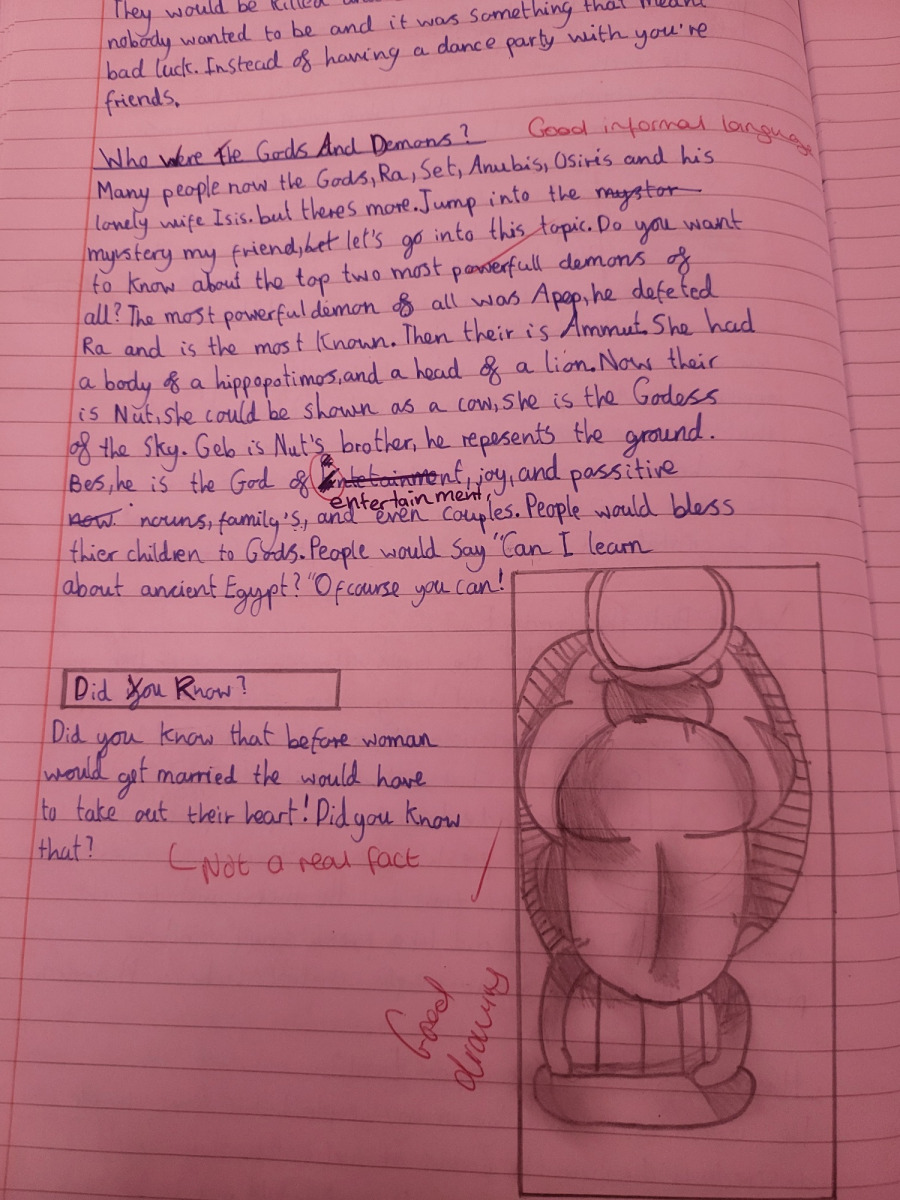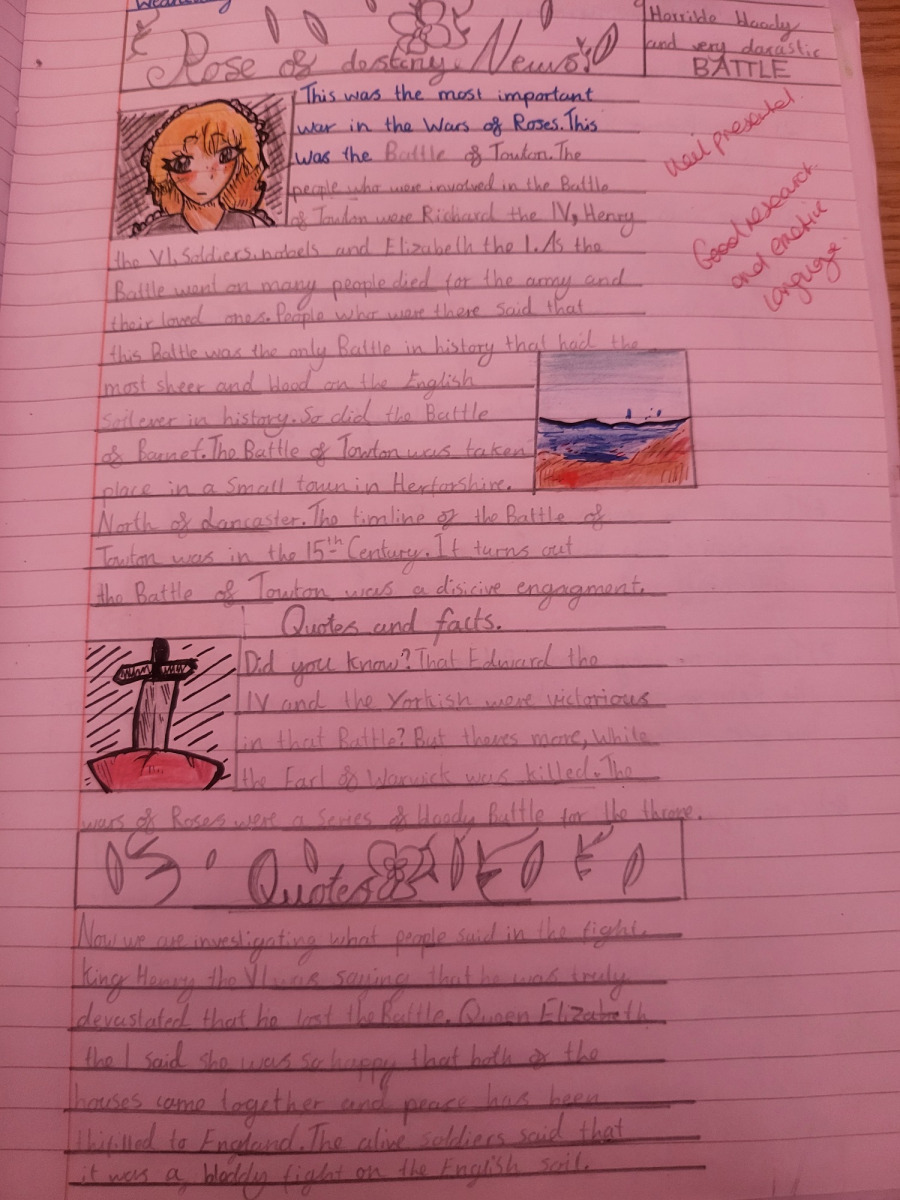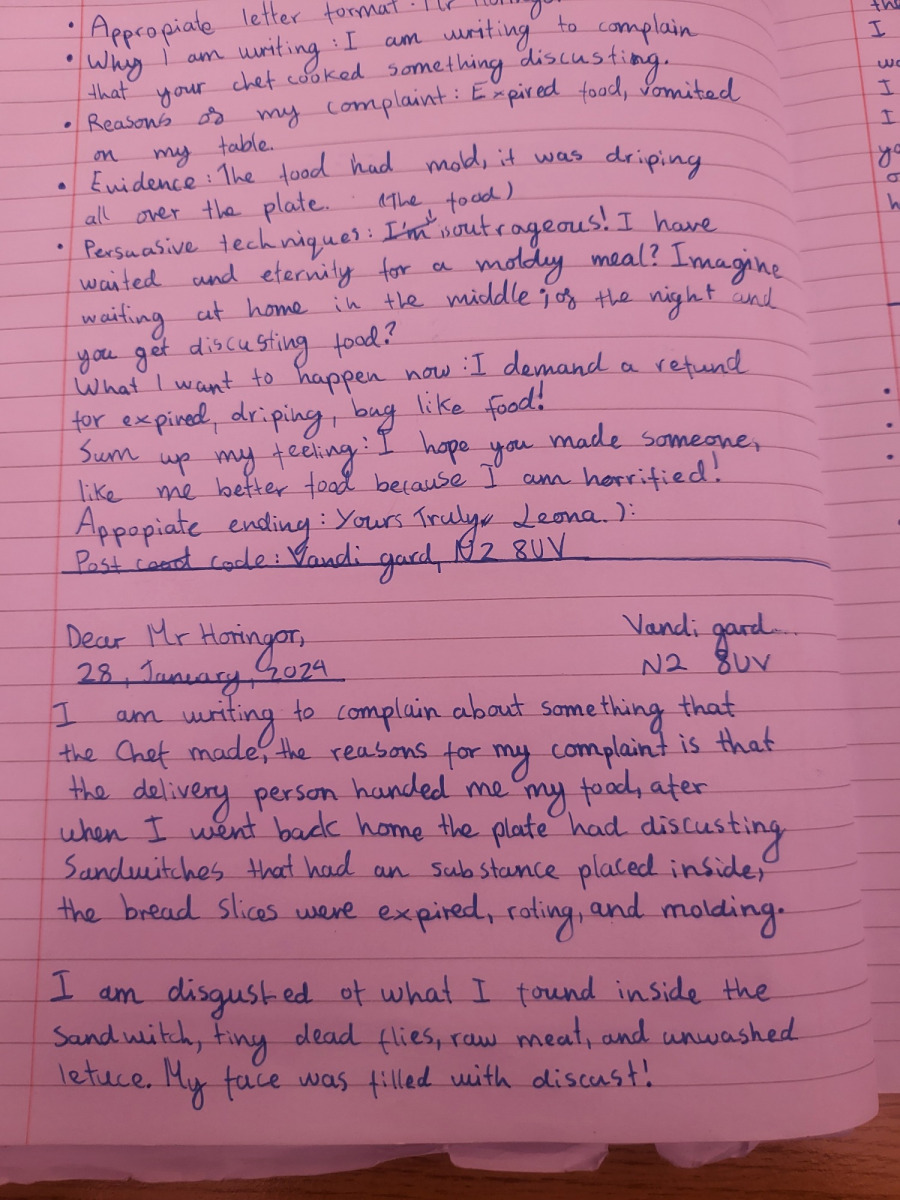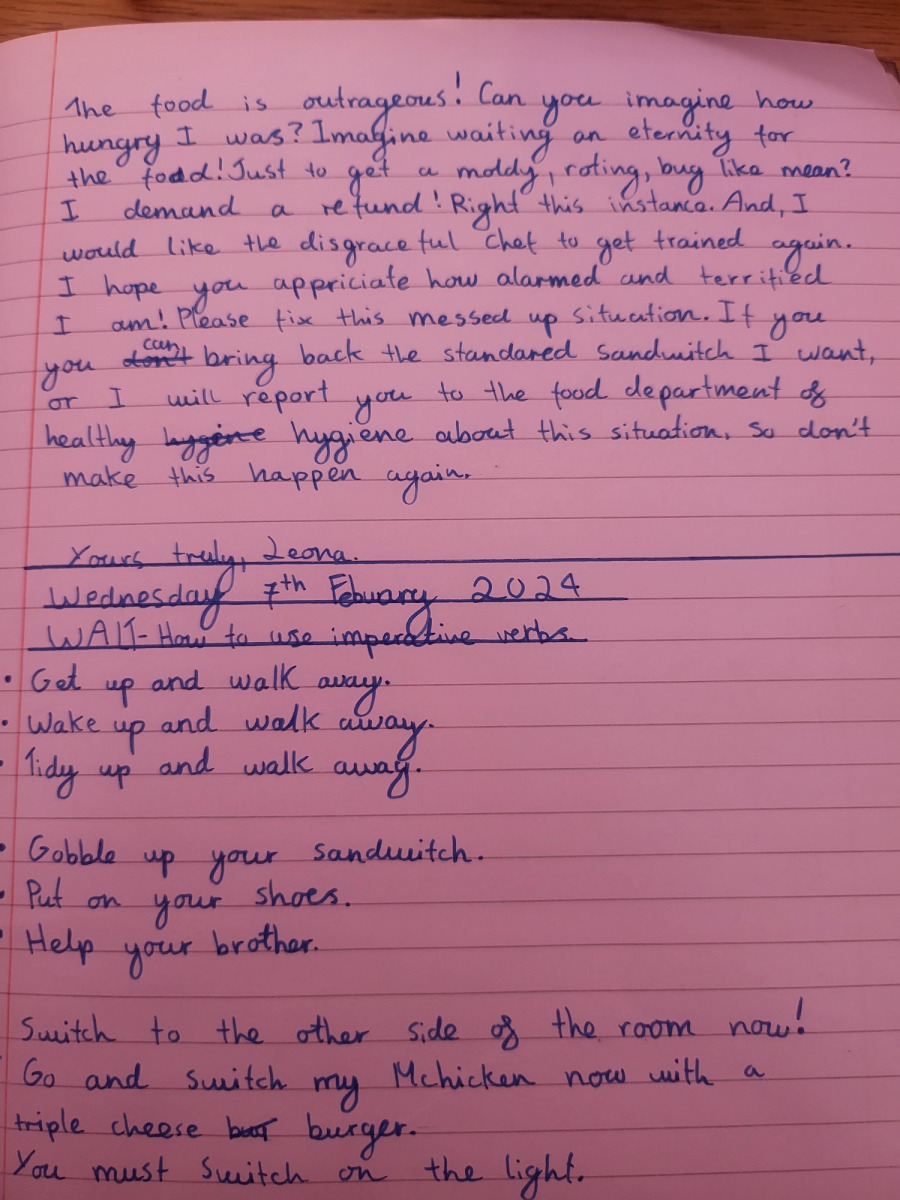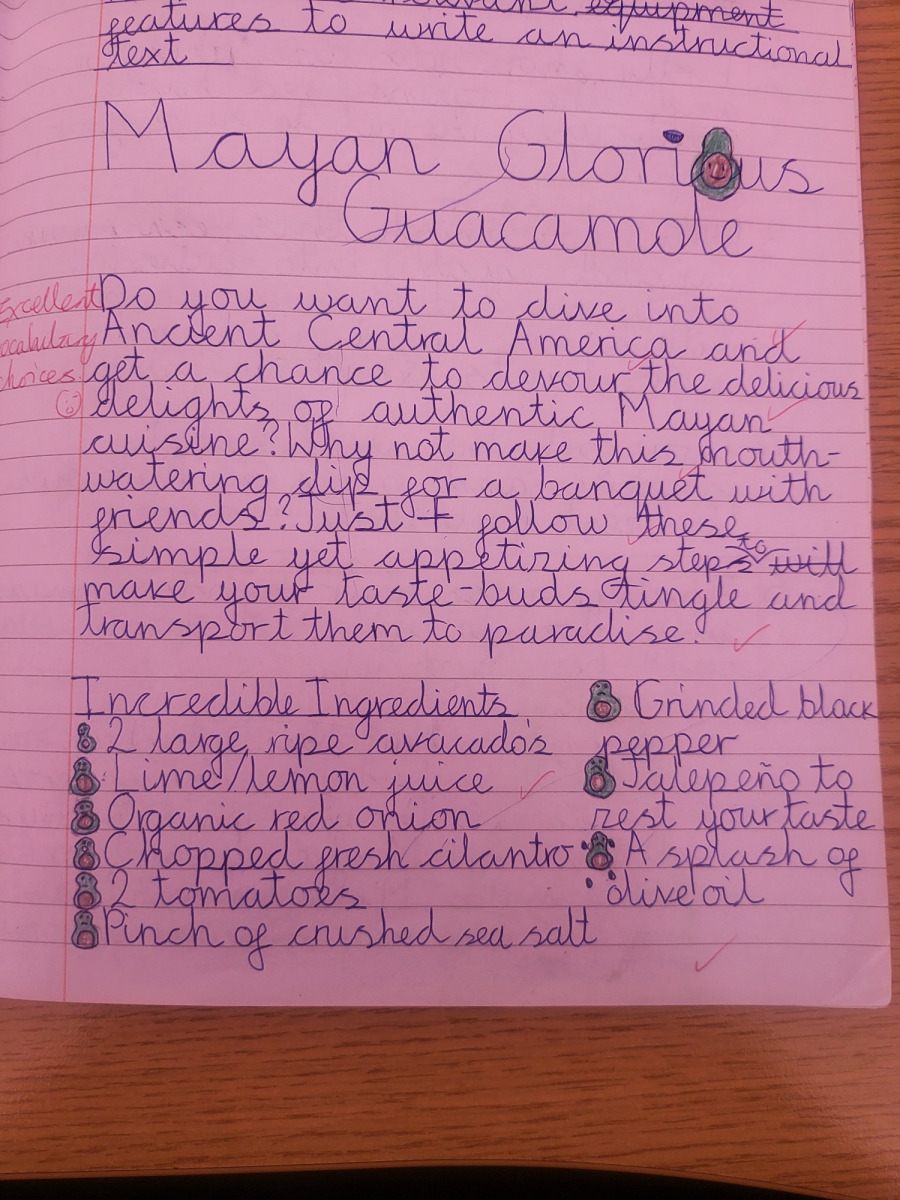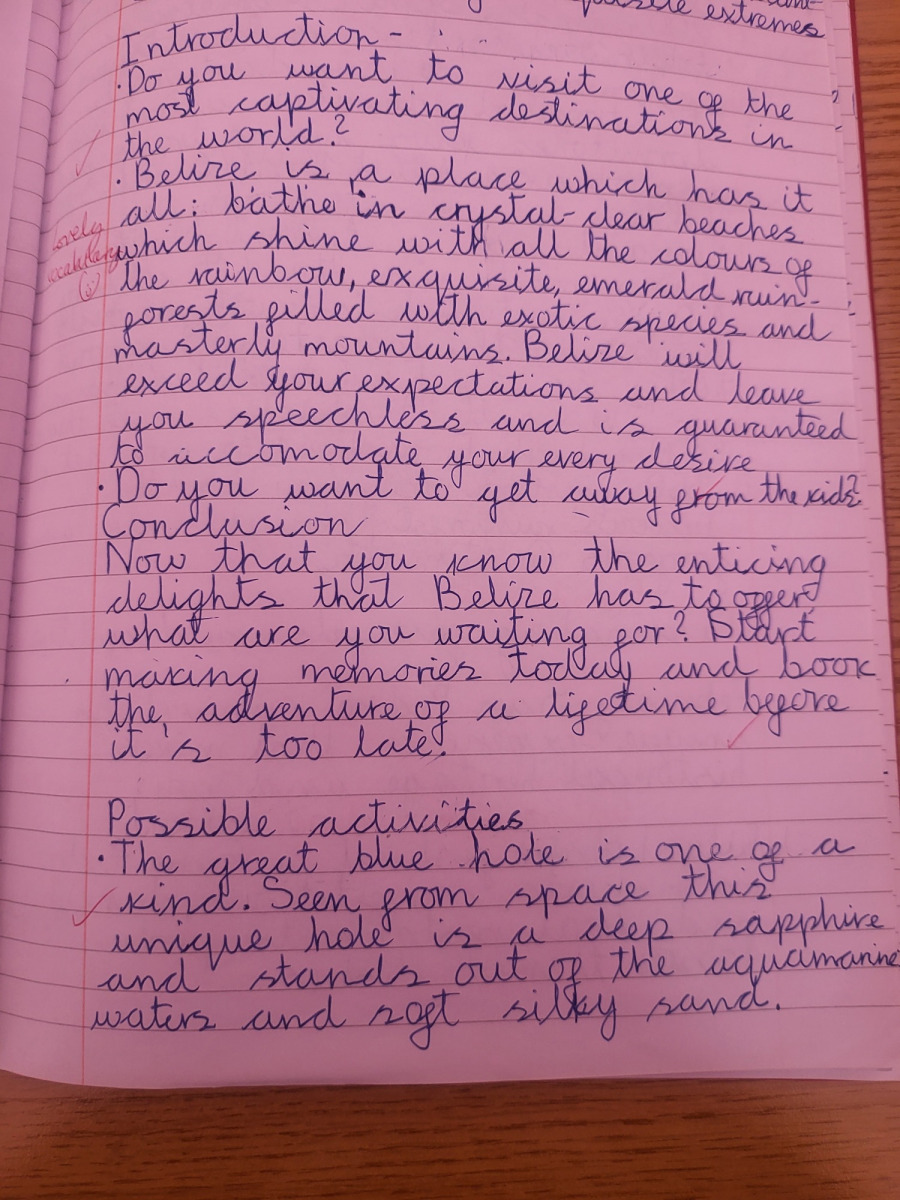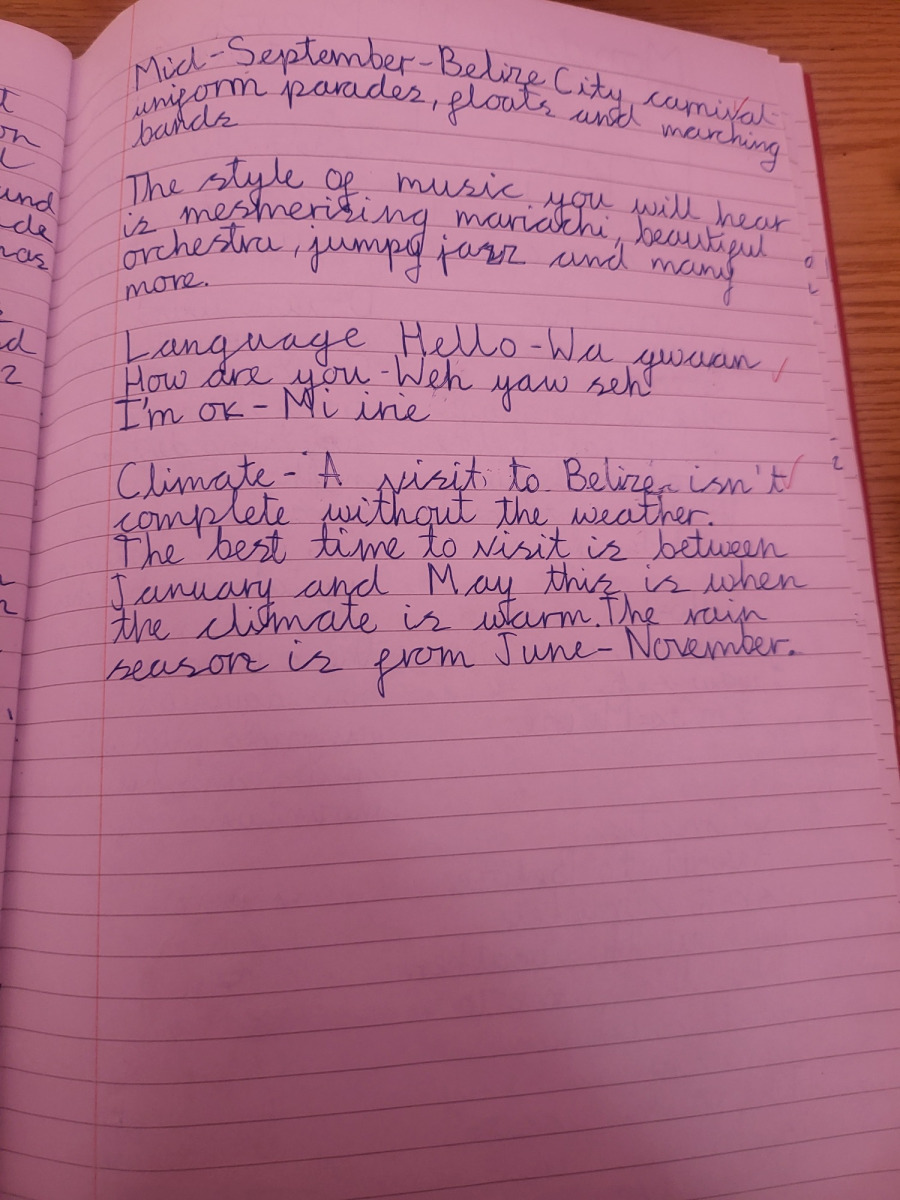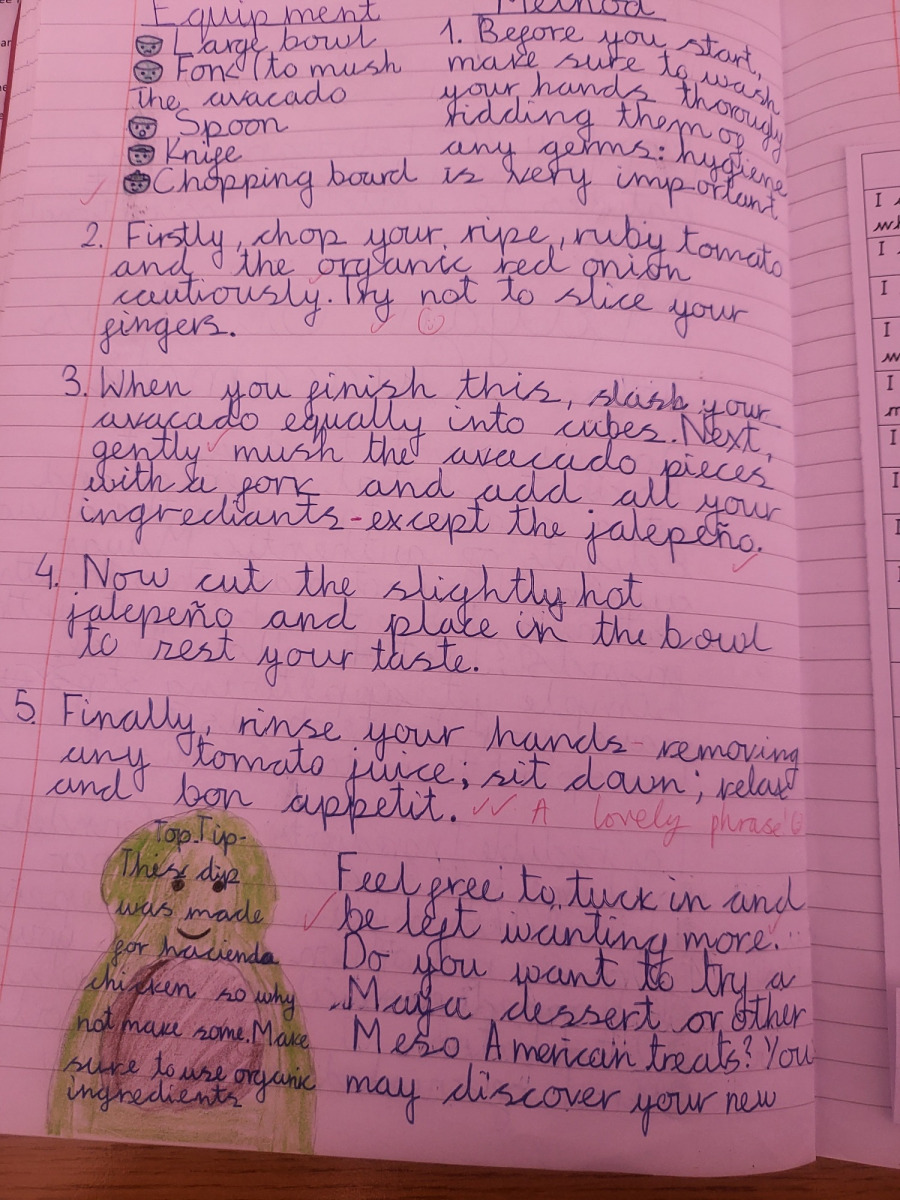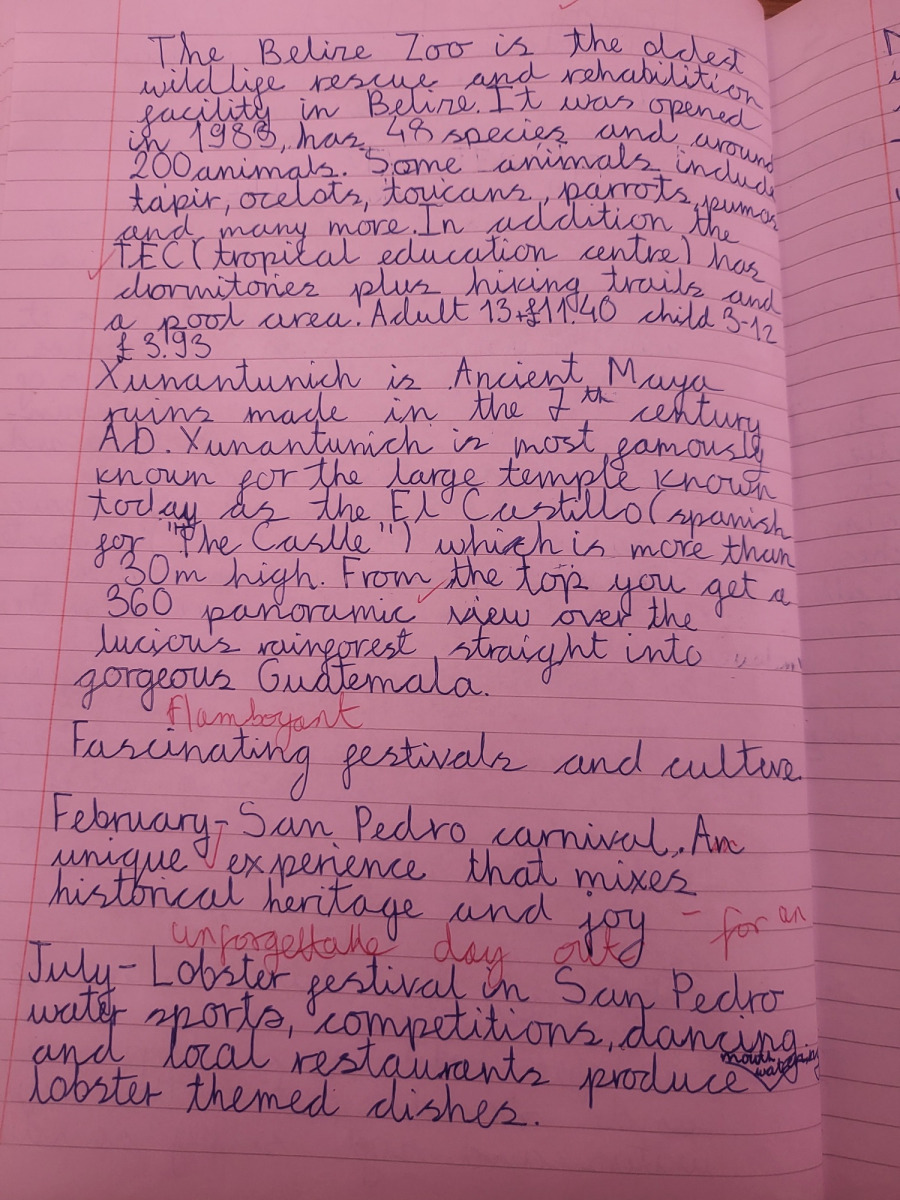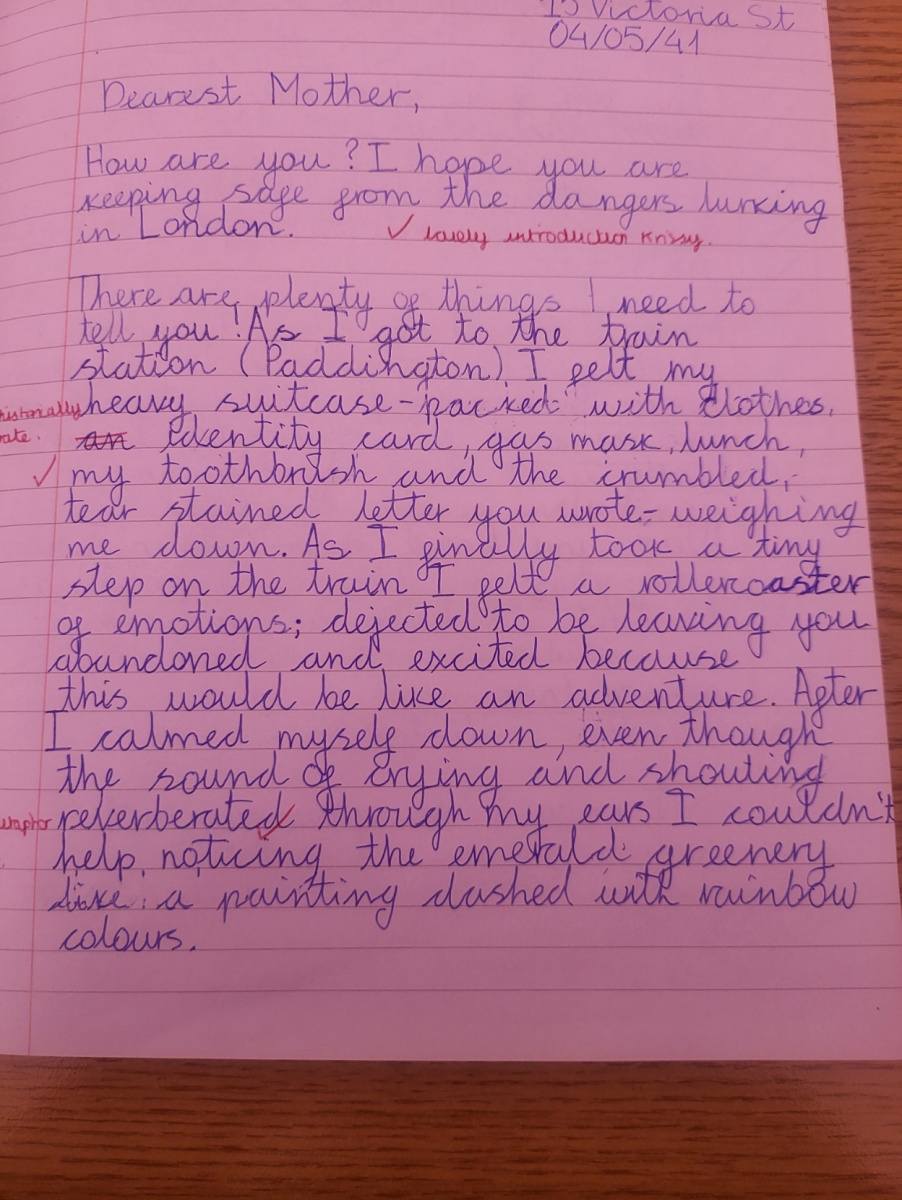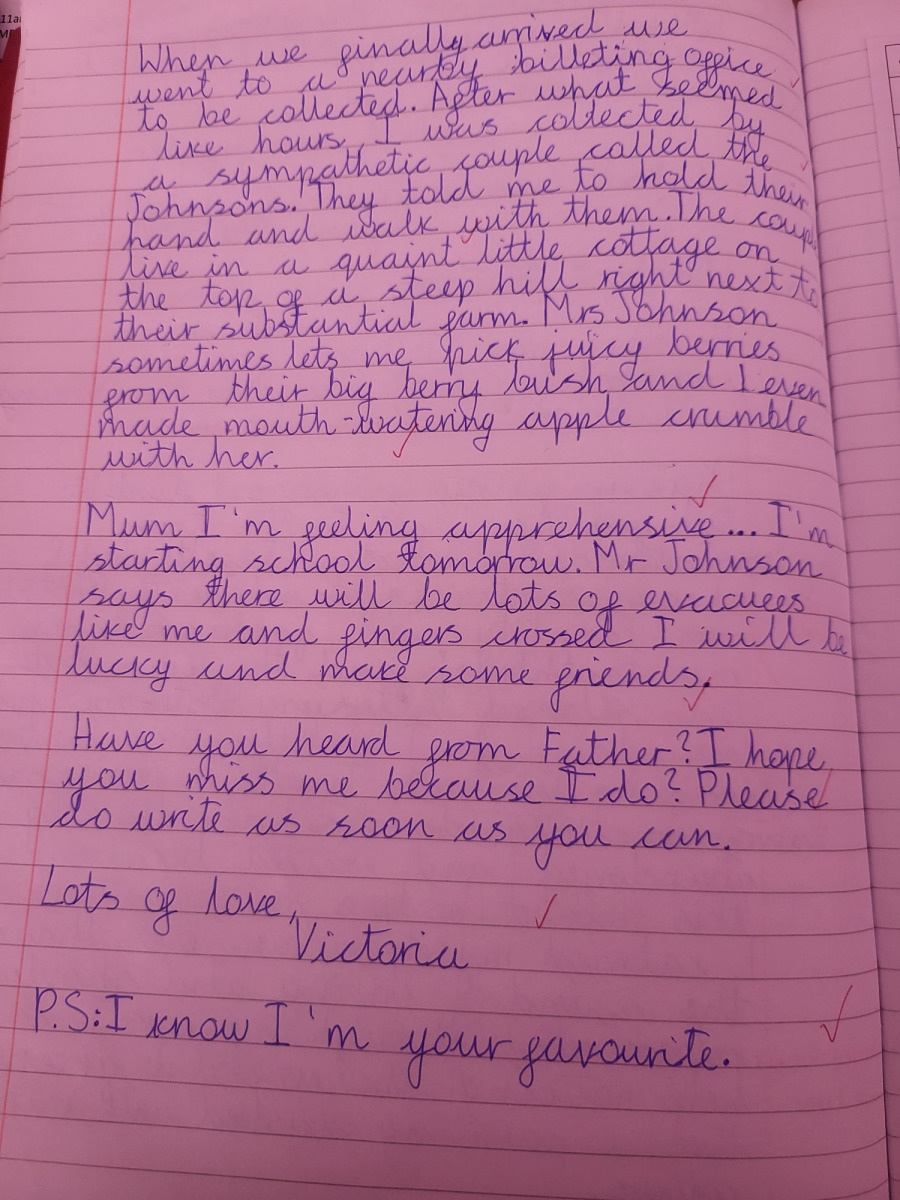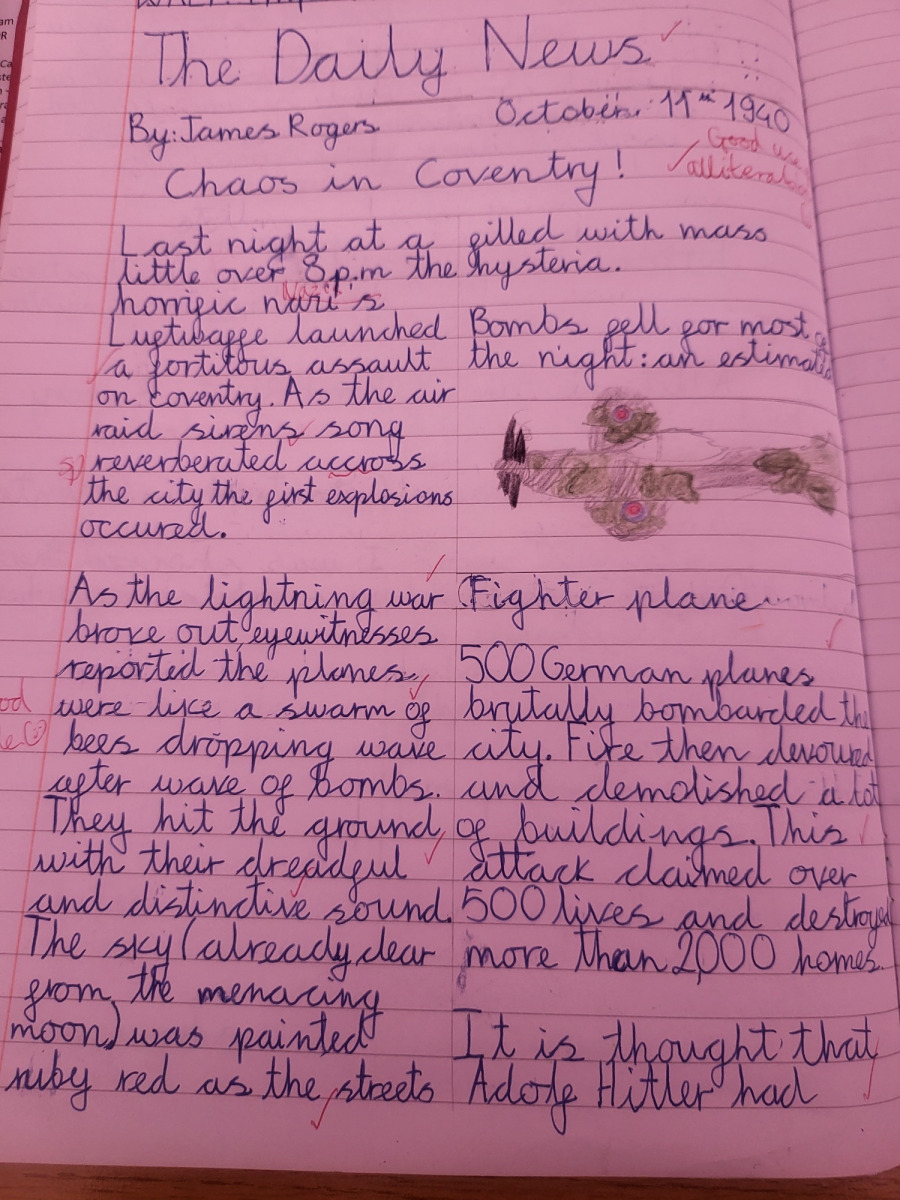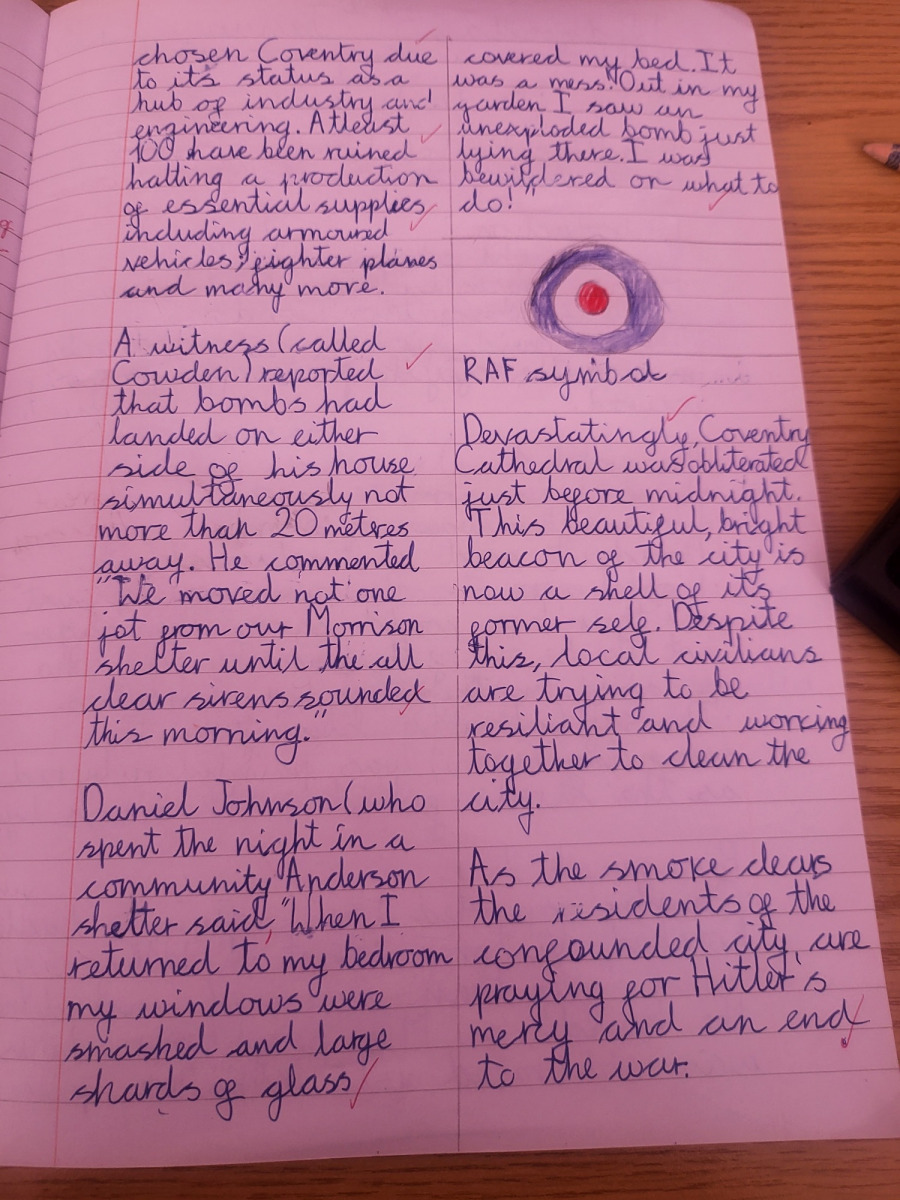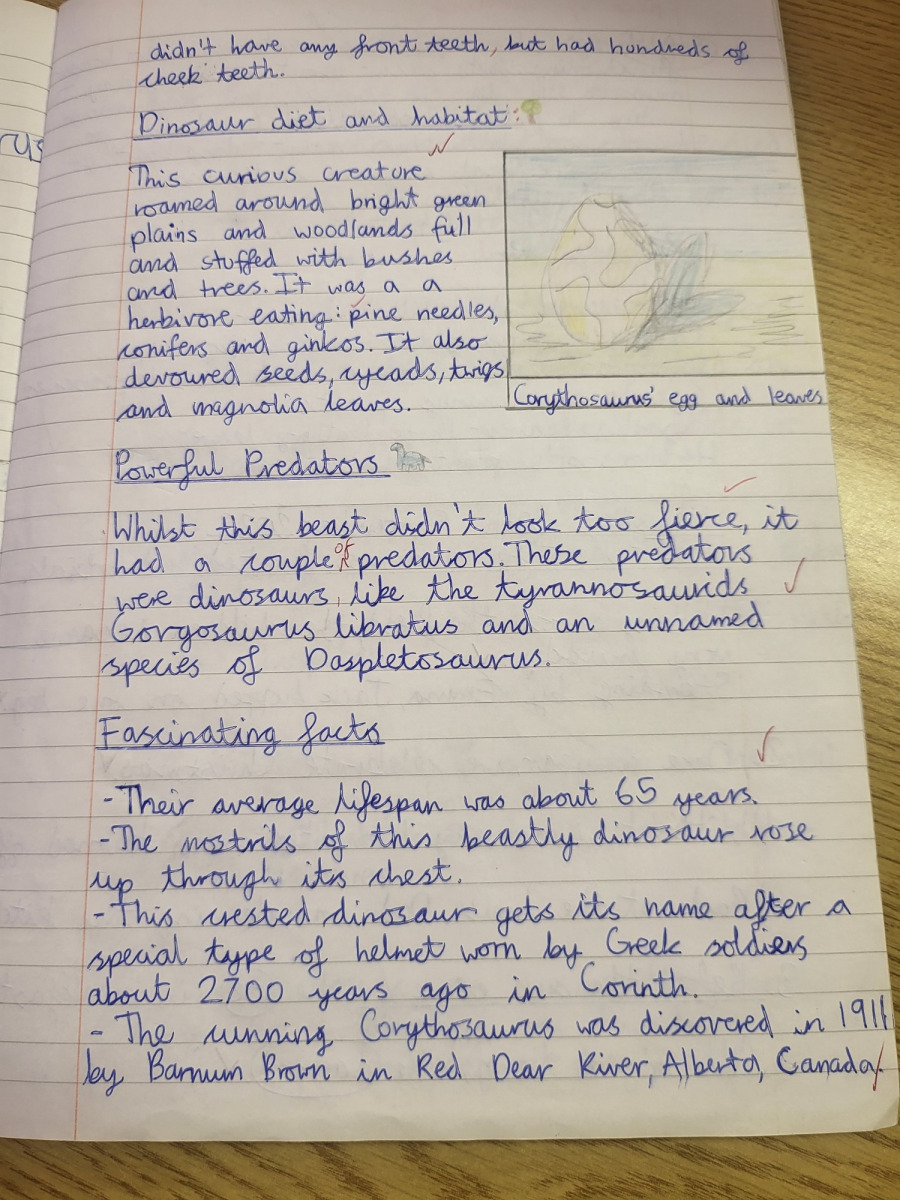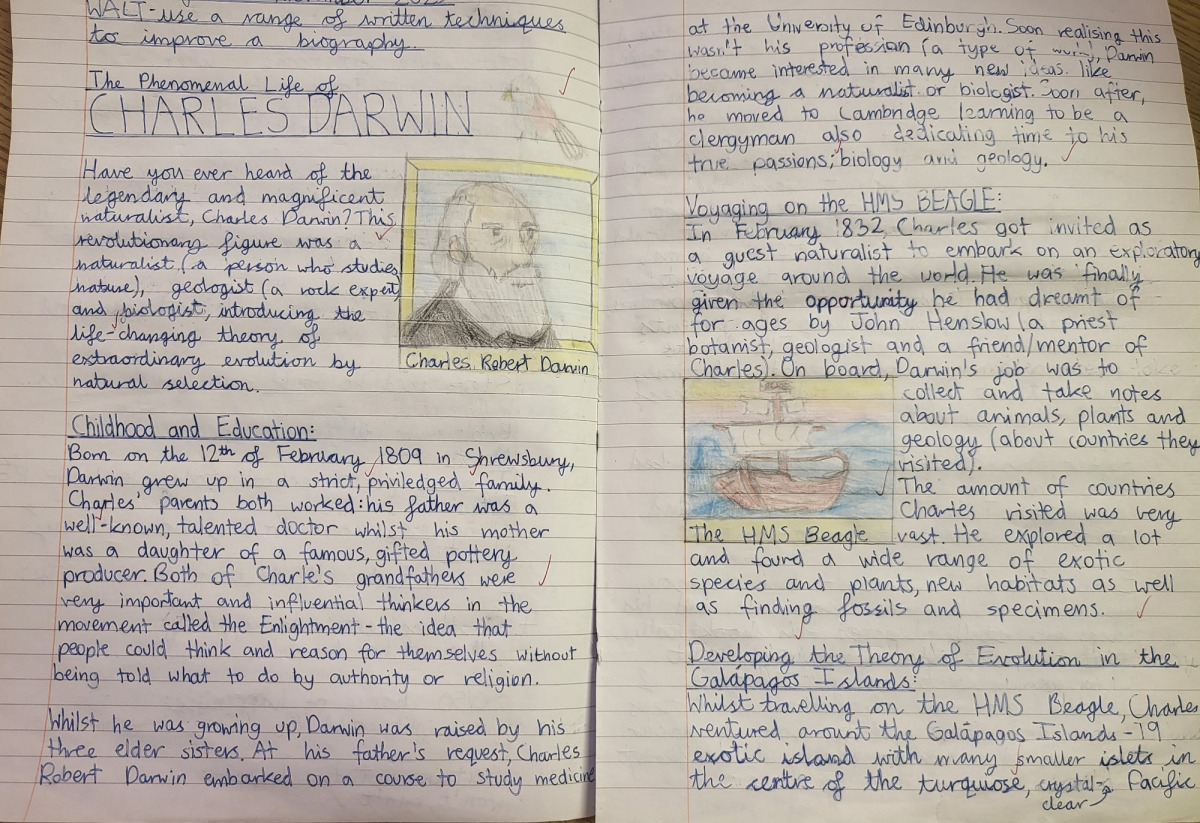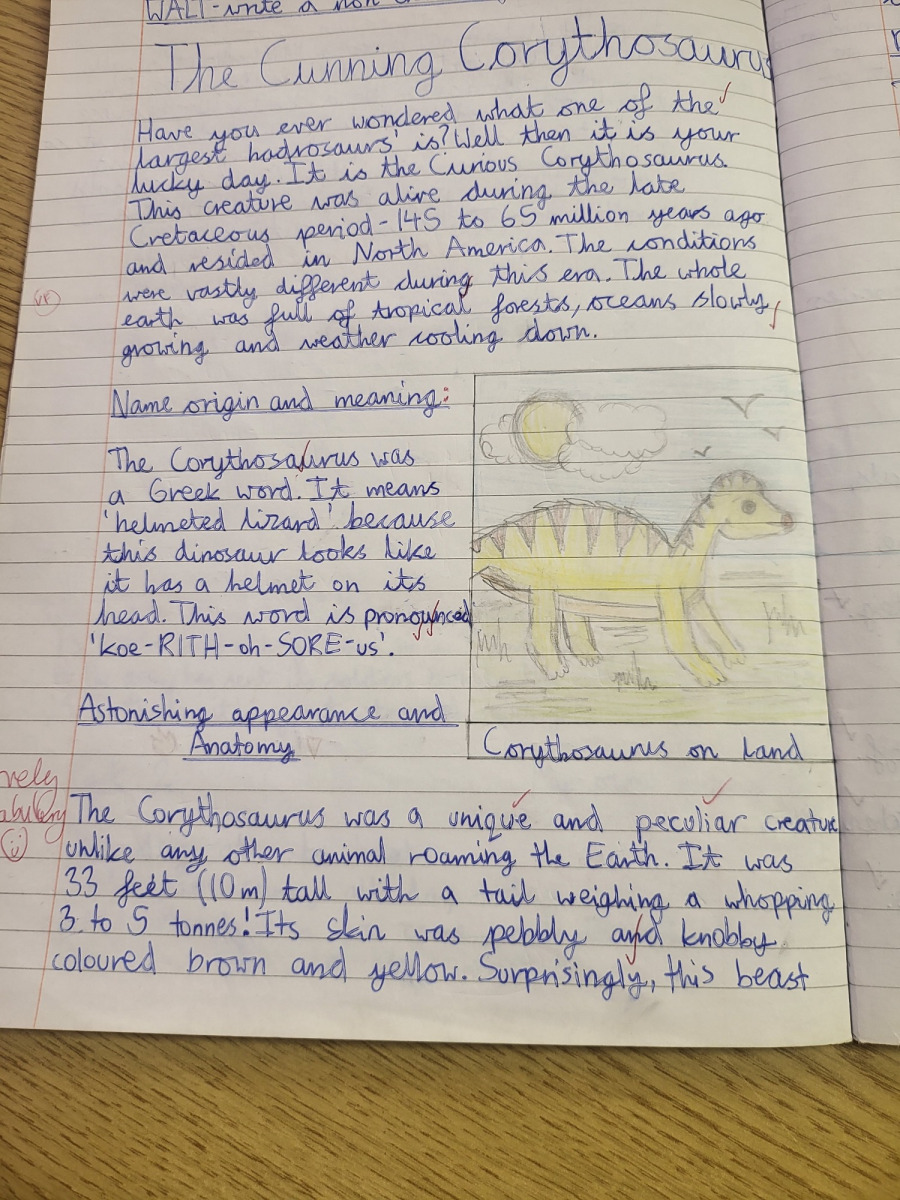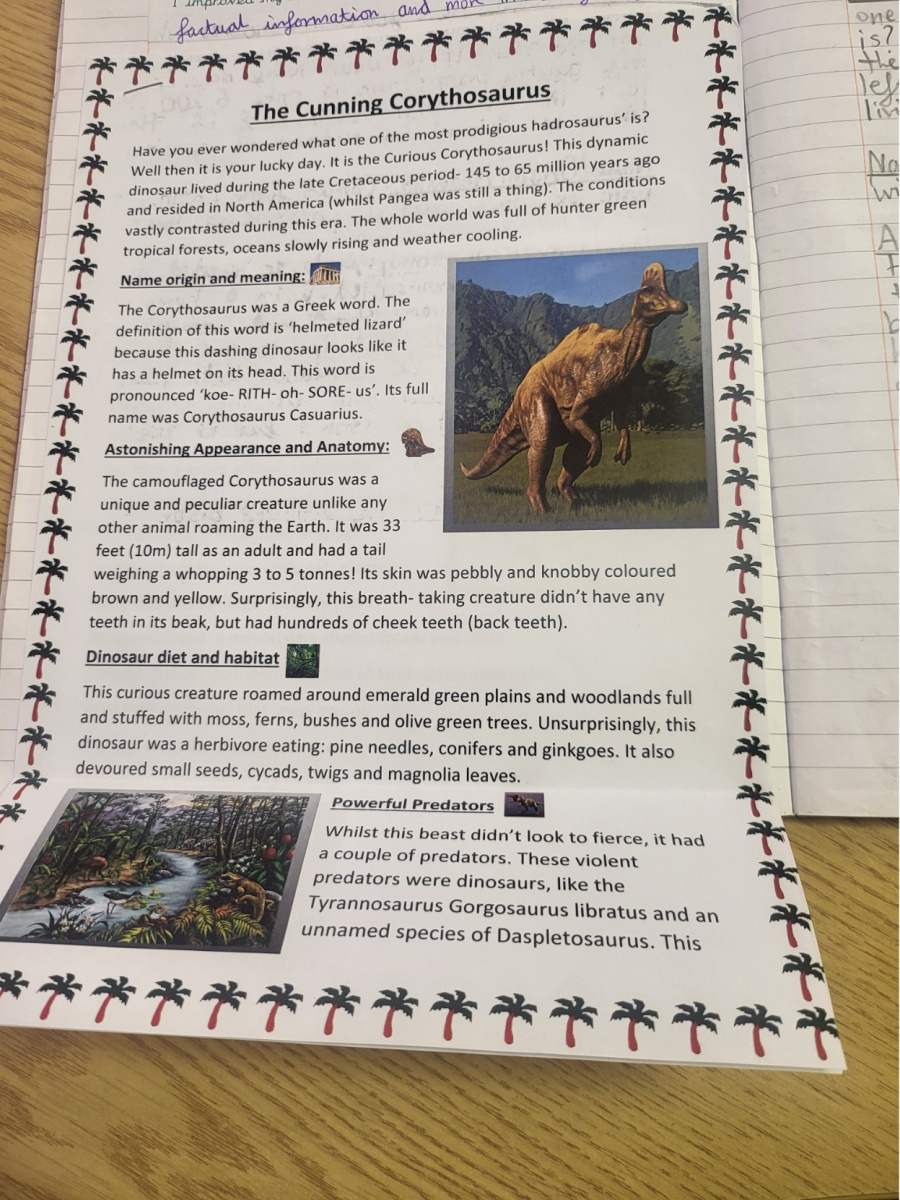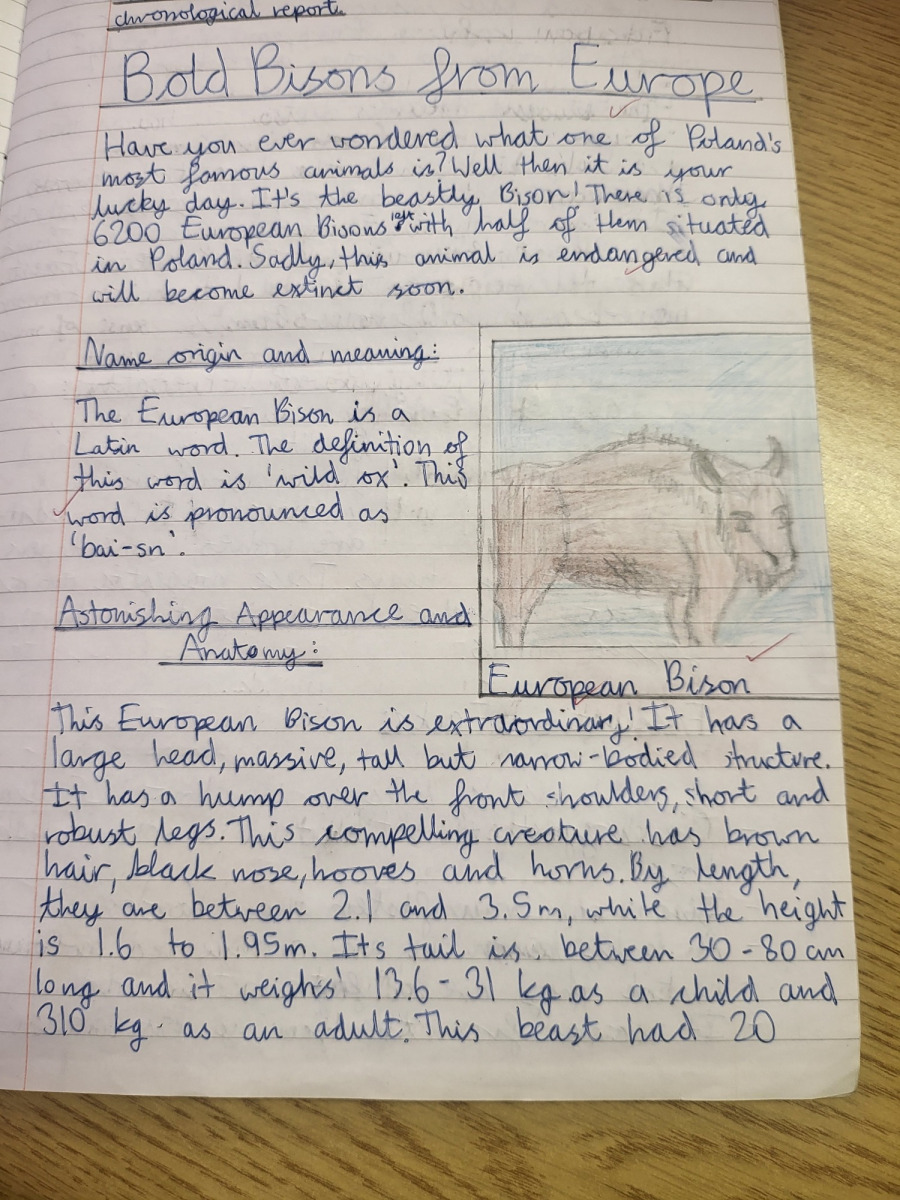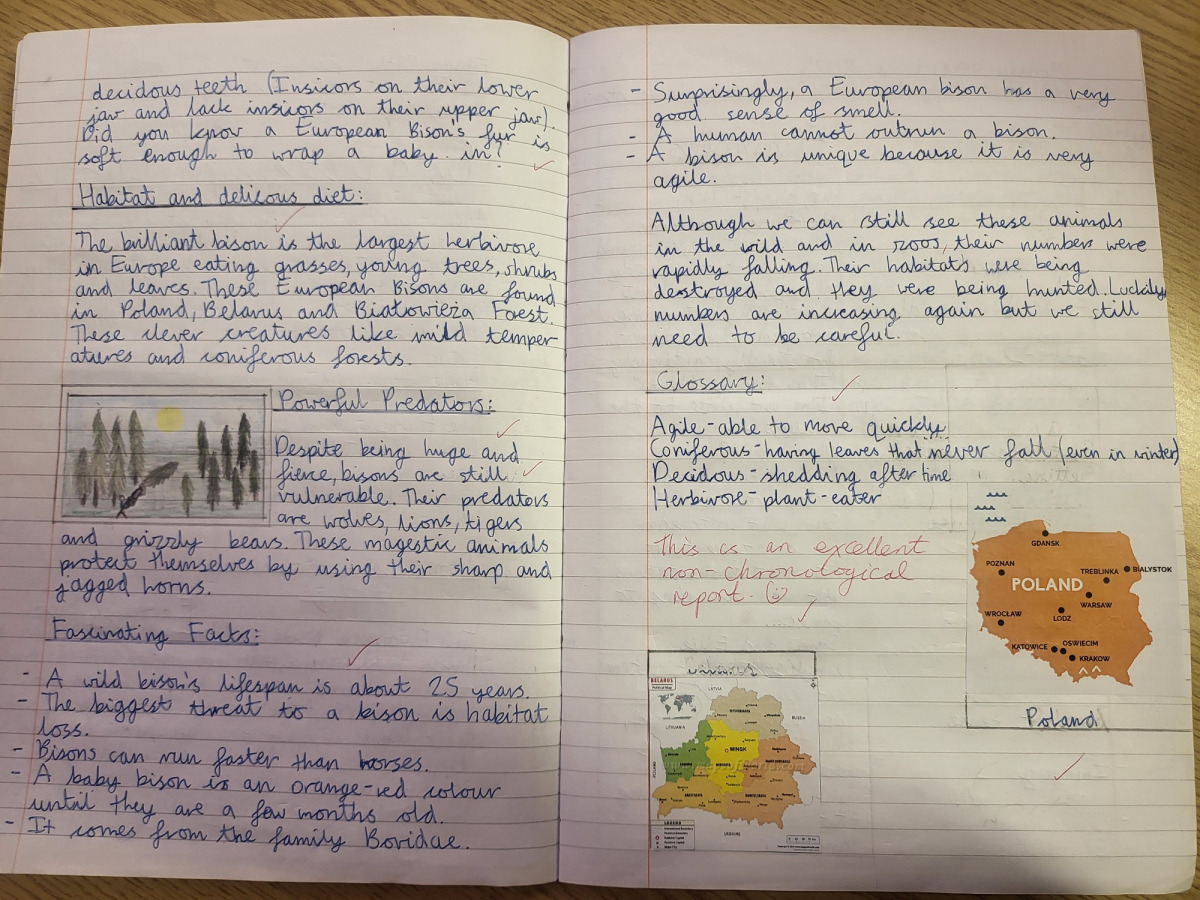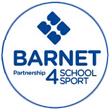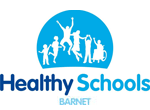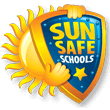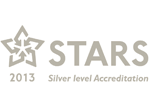English
Writing
Intent
Writing is a crucial part of our curriculum at St Theresa’s. By the end of Year Six we intend our children to have developed a love of writing and to be able to express their thoughts and ideas clearly and creatively through the written word. We also intend to create writers who can re-read, edit and improve their own writing, and enable pupils to be able to confidently use the essential skills of grammar, punctuation and spelling. At St Theresa’s, we set high expectations for all our children to take pride in their work and have a fluent, cursive handwriting style alongside allowing their imaginations to flourish. We ensure that our children feel that they are always ready to write for a purpose and are confident in adapting their style to fit the genre they are writing.
Implementation
In order to help us to develop confident, enthusiastic writers who can express themselves in a variety of different styles and across a variety of contexts, our teaching of writing is often cross circular and linked to our class topics. This provides our children with regular opportunities to write for a range of purposes and audiences. Writing tasks are specific and meaningful, and often meet a purpose to engage children and to illustrate how their writing skills can be applied to real life contexts. When starting a genre of writing children are given the opportunity to show what they already know in their independent writing as a starting point for their teacher. From here the class look at examples of different texts and explore the various features of the genre they are studying. Lessons on grammar specific to the genre aid the development of children’s writing as well as learning how to effectively plan pieces of writing for different genres using Sue Palmer’s planning skeletons. Children get the opportunity to then edit and write other examples from the same genre to show the progress that they are making. As well as linking their writing to the class topics, we also try and link their writing to current events in the world and their own interests to make the writing more purposeful and engaging.
Children learn spelling rules at home each week and these are tested in school. Additionally, spelling is taught daily in Key Stage 1, in Phonics lessons, and weekly in key Stage 2. Children who need additional support with spelling receive a variety of interventions that are tailored to address their gaps.
Impact
Pupils will make good progress from their own personal starting points. By the end of Year Six they will be able to write clearly and accurately and adapt their language and style in and for a range of contexts, purposes and audiences. Our pupils will acquire a wide vocabulary and have a strong command of the written word. Most importantly, they will develop a love of writing and be well equipped for the rest of their education.
Writing genres and progression of skills
Writing Progression of Learning
What the writing process looks like at St Theresa’s
Reception Writing
Y1 Writing Y2 Writing Y3 Writing Y4 Writing Y5 Writing y6 WritingReading
IntentReading lies at the heart of the curriculum at St Theresa’s We are dedicated to enabling our pupils to become lifelong readers and we believe reading is key for academic success.
Implementation
- Children take part in daily Guided Reading lessons, where they are exposed to a range of different texts and can demonstrate their understanding and thinking behind these.
- We have an excellent library and a wide range of reading books in every classroom. All children from choose a reading book to take home and this reading book is changed frequently.
- Each classroom has a selection of books which are directly linked to the class topic. This offers opportunities for pupils to apply their reading skills across the curriculum.
- Children are read to each day by their class teacher. This can be a book that the teacher recommends to the class or a recommendation from a child.
- Children have the opportunity to take part in ‘Reading Club’, in which children mix with other children from different year groups and share a book together. This is led by the children in Year 6.
- Children in key stage 2 who are not yet ‘free readers’, are given additional reading opportunities with staff and parent volunteers throughout the school day.
- We run various reading competitions throughout the school year to foster children’s love for reading such as the Summer Term Reading Challenge.
Impact
By the time children leave St Theresa’s, they are competent readers who can recommend books to their peers, have a thirst for reading a range of genres including poetry, and participate in discussions about books, including evaluating an author’s use of language and the impact this can have on the reader. They can also read books to enhance their knowledge and understanding of all subjects on the curriculum, and communicate their research to a wider audience.
Reading Progression of Learning
Phonics
Capitalletterformation-4-1.286800630
LS-PowerPoint-for-parents-presentation-
Intent
Phonics (reading and spelling)
At St Theresa, we believe that all our children can become fluent readers and writers. This is why we teach reading through Little Wandle Letters and Sounds Revised, which is a systematic and synthetic phonics programme. We start teaching phonics in Reception and follow the Little Wandle Letters and Sounds Revised progression, which ensures children build on their growing knowledge of the alphabetic code, mastering phonics to read and spell as they move through school.
As a result, all our children are able to tackle any unfamiliar words as they read. At St Theresa, we also model the application of the alphabetic code through phonics in shared reading and writing, both inside and outside of the phonics lesson and across the curriculum. We have a strong focus on language development for our children because we know that speaking and listening are crucial skills for reading and writing in all subjects.
Comprehension
At St Theresa, we value reading as a crucial life skill. By the time children leave us, they read confidently for meaning and regularly enjoy reading for pleasure. Our readers are equipped with the tools to tackle unfamiliar vocabulary. We encourage our children to see themselves as readers for both pleasure and purpose.
Because we believe teaching every child to read is so important, we have a Reading Leader who drives the early reading programme in our school. This person is skilled at teaching phonics and reading, and they monitor and support our reading team, so everyone teaches with fidelity to the Little Wandle Letters and Sounds Revised programme.
Implementation
Foundations for phonics in Reception
- We provide a balance of child-led and adult-led experiences for all children that meet the curriculum expectations for ‘Communication and language’ and ‘Literacy’. These include:
- sharing high-quality stories and poems
- learning a range of nursery rhymes and action rhymes
- activities that develop focused listening and attention, including oral blending
- attention to high-quality language.
Daily phonics lessons in Reception and Year 1
- We teach phonics for 30 minutes a day. In Reception, we build from 10-minute lessons, with additional daily oral blending games, to the full-length lesson as quickly as possible. Each Friday, we review the week’s teaching to help children become fluent readers.
- Children make a strong start in Reception: teaching begins in Week 2 of the Autumn term.
- We follow the Little Wandle Letters and Sounds Revised expectations of progress:
- Children in Reception are taught to read and spell words using Phase 2 and 3 GPCs, and words with adjacent consonants (Phase 4) with fluency and accuracy.
- Children in Year 1 review Phases 3 and 4 and are taught to read and spell words using Phase 5 GPCs with fluency and accuracy.
Daily Keep-up lessons ensure every child learns to read
- Any child who needs additional practice has daily Keep-up support, taught by a fully trained adult. Keep-up lessons match the structure of class teaching, and use the same procedures, resources and mantras, but in smaller steps with more repetition, so that every child secures their learning.
- We timetable daily phonics lessons for any child in Year 2 and above who is not fully fluent at reading or has not passed the Phonics screening check. These children urgently need to catch up, so the gap between themselves and their peers does not widen. We use the Rapid Catch-up assessments to identify the gaps in their phonic knowledge and teach to these using the Rapid Catch-up resources – at pace.
- These short, sharp lessons last 15-20 minutes daily and have been designed to ensure children quickly catch up to age-related expectations in reading.
Teaching reading: Reading practice sessions three times a week
- We teach children to read through reading practice sessions three times a week. These:
- are taught by a fully trained adult to small groups of approximately six children
- use books matched to the children’s secure phonic knowledge using the Little Wandle Letters and Sounds Revised assessments and book matching grids on pages 11–20 of ‘Application of phonics to reading’.
- are monitored by the class teacher, who rotates and works with each group on a regular basis.
- Each reading practice session has a clear focus, so that the demands of the session do not overload the children’s working memory. The reading practice sessions have been designed to focus on three key reading skills:
- decoding
- prosody: teaching children to read with understanding and expression
- comprehension: teaching children to understand the text.
- In Reception these sessions start in Week 4. Children who are not yet decoding have daily additional blending practice in small groups, so that they quickly learn to blend and can begin to read books.
- In Years 2 and 3, we continue to teach reading in this way for any children who still need to practise reading with decodable books.
Home reading
- The decodable reading practice book is taken home to ensure success is shared with the family.
- Reading for pleasure books also go home for parents to share and read to children. We share the research behind the importance and impact of sharing quality children’s books with parents through workshops, leaflets and the Everybody read!
- We use the Little Wandle Letters and Sounds Revised parents’ resources to engage our families and share information about phonics, the benefits of sharing books, how children learn to blend and other aspects of our provision, both online and through workshops.
Additional reading support for vulnerable children
- Children in Reception and Year 1 who are receiving additional phonics Keep-up sessions read their reading practice book to an adult daily.
Ensuring consistency and pace of progress
- Every teacher in our school has been trained to teach reading, so we have the same expectations of progress. We all use the same language, routines and resources to teach children to read so that we lower children’s cognitive load.
- Weekly content grids map each element of new learning to each day, week and term for the duration of the programme.
- Lesson templates, Prompt cards and ‘How to’ videos ensure teachers all have a consistent approach and structure for each lesson.
- The Reading Leader and SLT use the Audit and Prompt cards to regularly monitor and observe teaching; they use the summative data to identify children who need additional support and gaps in learning.
Ensuring reading for pleasure
‘Reading for pleasure is the single most important indicator of a child’s success.’ (OECD 2002)
‘The will influences the skill and vice versa.’ (OECD 2010)
We value reading for pleasure highly and work hard as a school to grow our Reading for Pleasure pedagogy.
- We read to children every day. We choose these books carefully as we want children to experience a wide range of books, including books that reflect the children at St Theresa and our local community as well as books that open windows into other worlds and cultures.
- Every classroom has an inviting book corner that encourages a love for reading. We curate these books and talk about them to entice children to read a wide range of books.
- In Reception, children have access to the reading corner every day in their free flow time and the books are continually refreshed.
- Children from Reception onwards have a home reading record. The parent/carer records comment to share with the adults in school and the adults will write in this on a regular basis to ensure communication between home and school.
- As the children progress through the school, they are encouraged to write their own comments and keep a list of the books/authors that they have read.
- The school library is made available for classes to use at protected times. Children across the school have regular opportunities to engage with a wide range of Reading for Pleasure events (book fairs, author visits and workshops, national events etc).
- We use the Everybody read! resources to grow our teachers’ knowledge of current books, the most recent research and to grow our own Reading for Pleasure practice.
Impact
Assessment
Assessment is used to monitor progress and to identify any child needing additional support as soon as they need it.
- Assessment for learning is used:
- daily within class to identify children needing Keep-up support
- weekly in the Review lesson to assess gaps, address these immediately and secure fluency of GPCs, words and spellings.
- Summative assessment for Reception and Year 1 is used:
- every six weeks to assess progress, to identify gaps in learning that need to be addressed, to identify any children needing additional support and to plan the Keep-up support that they need.
- by SLT and scrutinised through the Little Wandle Letters and Sounds Revised assessment tracker, to narrow attainment gaps between different groups of children and so that any additional support for teachers can be put into place.
- Fluency assessments measure children’s accuracy and reading speed in short one-minute assessments. They are used:
- in Year 1, when children are reading the Phase 5 set 3, 4 and 5 books
- with children following the Rapid Catch-up programme in Years 2 to 6, when they are reading the Phase 5 set 3, 4 and 5 books
- to assess when children are ready to exit their programme. For Year 1 children, this is when they read the final fluency assessment at 60–70+ words per minute. Older children can exit the Rapid Catch-up programme when they read the final fluency assessment at 90+ words per minute. At these levels, children should have sufficient fluency to tackle any book at age-related expectations. After exiting their programme, children do not need to ready any more fully decodable books.
- A placement assessment is used:
- The Rapid Catch-up assessment is used
- with any child new to the school in Year 2 and above to quickly identify any gaps in their phonic knowledge and plan and provide appropriate extra teaching.
Statutory assessment
- Children in Year 1 sit the Phonics screening check. Any child not passing the check
re-sits it in Year 2.
Ongoing assessment for Rapid Catch-up in Years 2 to 6
- Children in Year 2 to 6 are assessed through:
- the Rapid Catch-up initial assessment to quickly identify any gaps in their phonic knowledge and plan appropriate teaching
- the Rapid Catch-up summative assessments to assess progress and inform teaching
- the Rapid Catch-up fluency assessments when children are reading the Phase 5 set 3, 4 and 5 books for age 7+.
- The fluency assessments measure children’s accuracy and reading speed in short
one-minute assessments. They also assess when children are ready to exit the Rapid Catch-up programme, which is when they read the final fluency assessment at 90+ words per minute.
